

60+ French Phrases for Travel You Need to Know 📚FREE Printable Cheat-Sheet
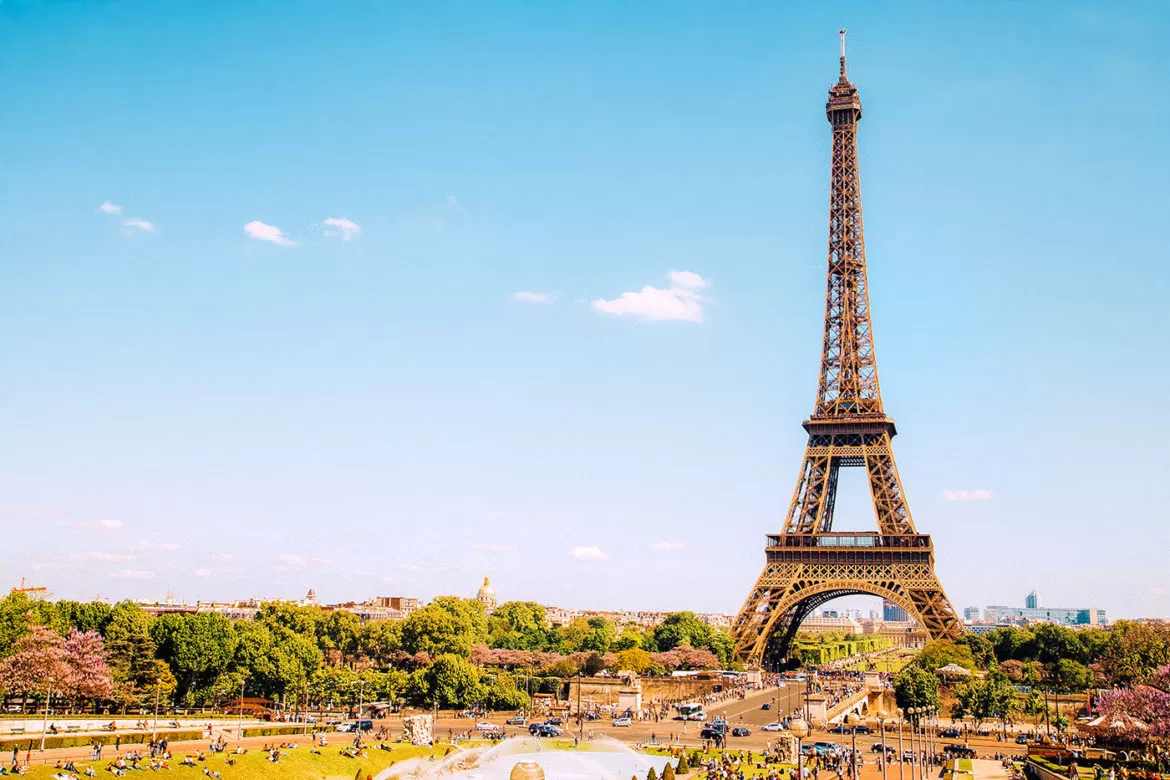
Order your petit-déjeuner (breakfast) or buy your billets (tickets) to the Louvre all in French! Here are the most useful French phrases for travel you need to know.
Learning some French will offer you further insight into the French culture, mentality, and way of life. The ability to speak even un peu français (a little bit of French) and avoid making these French faux pas will enhance your travel experience and open the doors to unique connections with the locals.
France is the world’s top tourist destination, attracting more than 79,5 million visitors a year! That’s why French is the next language in my travel phrase guide series. Not only that, but speaking French also comes in handy when travelling to Africa, Switzerland, Canada , Monaco, French Polynesia, the Seychelles amongst other places.
Why else should you learn French? Well, it makes learning other languages, especially Romance languages like Spanish , Italian , Portuguese and Romanian much easier.
Don't let the learning stop here. Download your free PDF guide with 60+ French travel phrases . Includes English and French translations with pronunciation guide. Apprenons ensemble! (Let's learn together!)
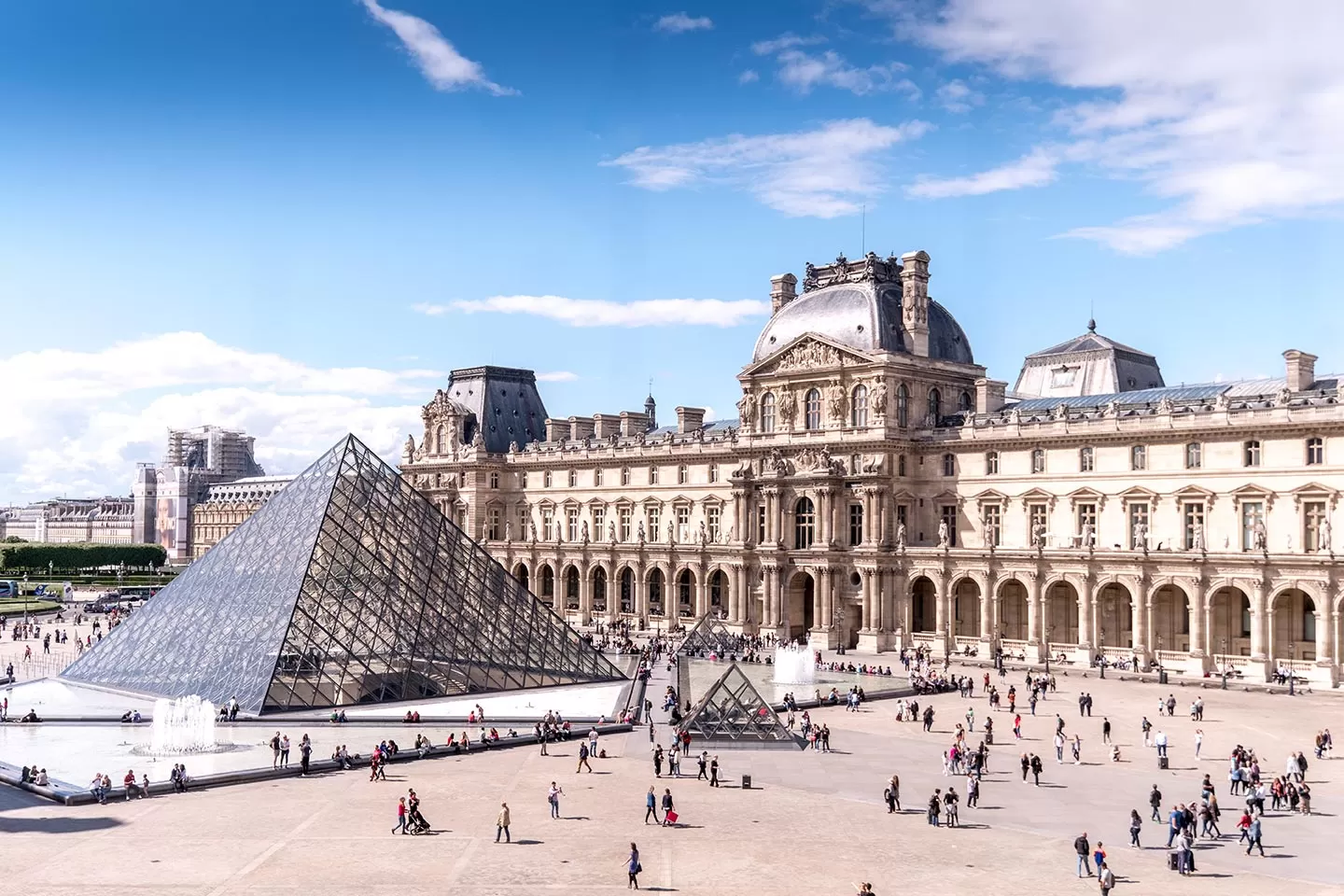
Travelling to France? Don’t be treated like a tourist! Live your best travel experiences and learn France for less than the cost of eating at a tourist trap restaurant or a taxi driver who has “taken you for a ride”. In addition to my free French travel phrase guide , I’ve made it even easier for you to master the French language so you can create lifelong memories as you mingle with locals , get local tips , avoid tourist traps , and make new friends . Join my popular French course here.
Let’s take a quick look at the French language so you’re a bit more clued up on its origin, use, and vocabulary. I hope you enjoy this post as much as I enjoyed bringing it together. If you have any requests for other languages, let me know in the comments section!
Where is French spoken?
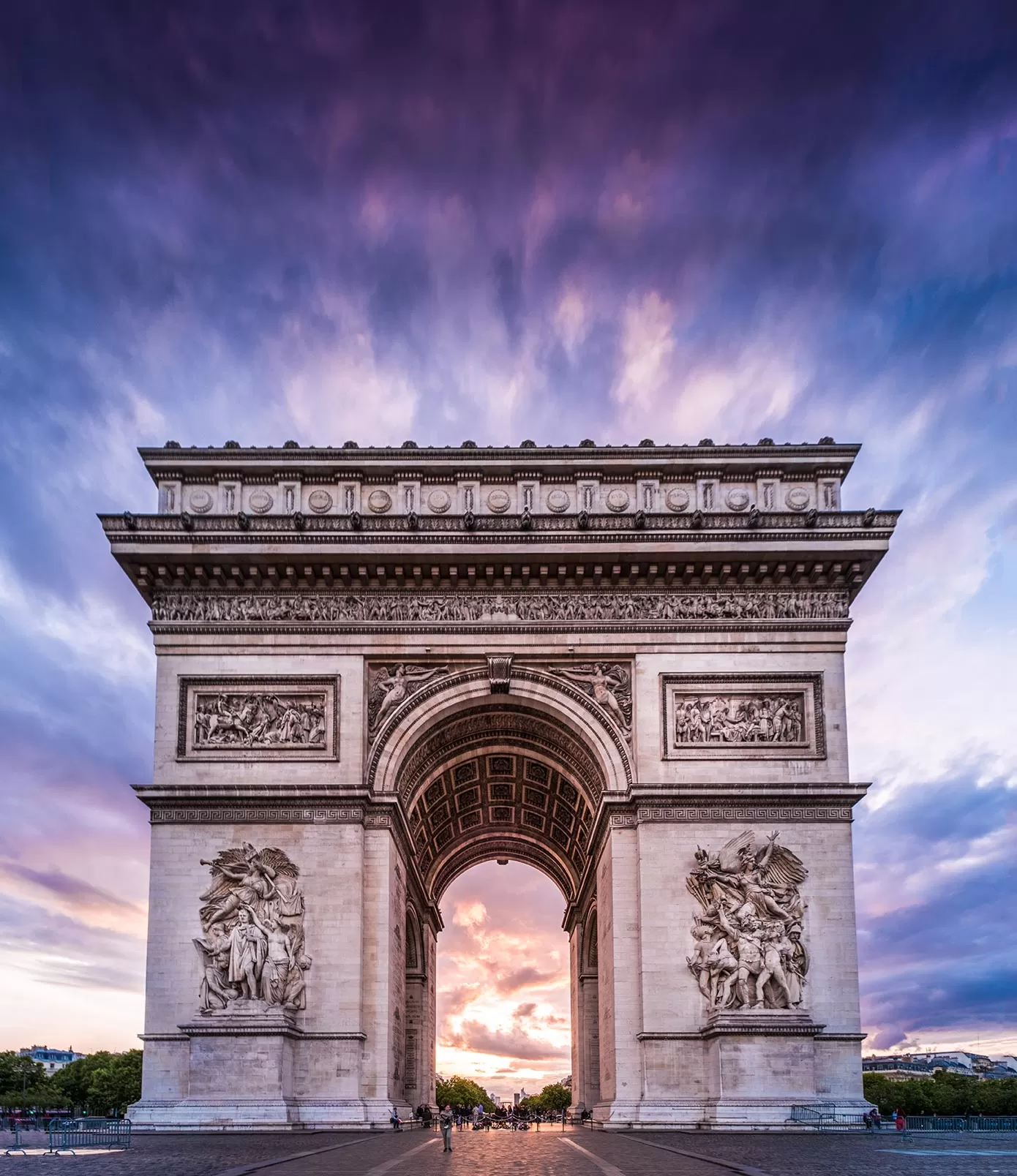
French is the third most spoken language in Europe, after German and English and has official-language status in 29 countries, including: Belgium , Benin, Burkina Faso, Burundi, Cameroon, Canada , Chad, the Ivory Coast, the Democratic Republic of the Congo, Djibouti, Equatorial Guinea, France , Haiti, Luxembourg, Madagascar, Mali, Monaco, Niger, Rwanda, Senegal, Seychelles, Switzerland , Togo and Vanuatu. French is even one of six official languages of the United Nations.
It seems like nearly everyone wants to learn French, it’s the only language, alongside English, that is taught in every country in the world!
And the best way to learn it? Well, France operates the biggest international network of cultural institutes, which run French-language courses close to a million learners. My two favourite ways to learn French is by attending language classes – so I’m not only held accountable but also for the social aspect – and going on language holiday too!
A Brief History of the French Language
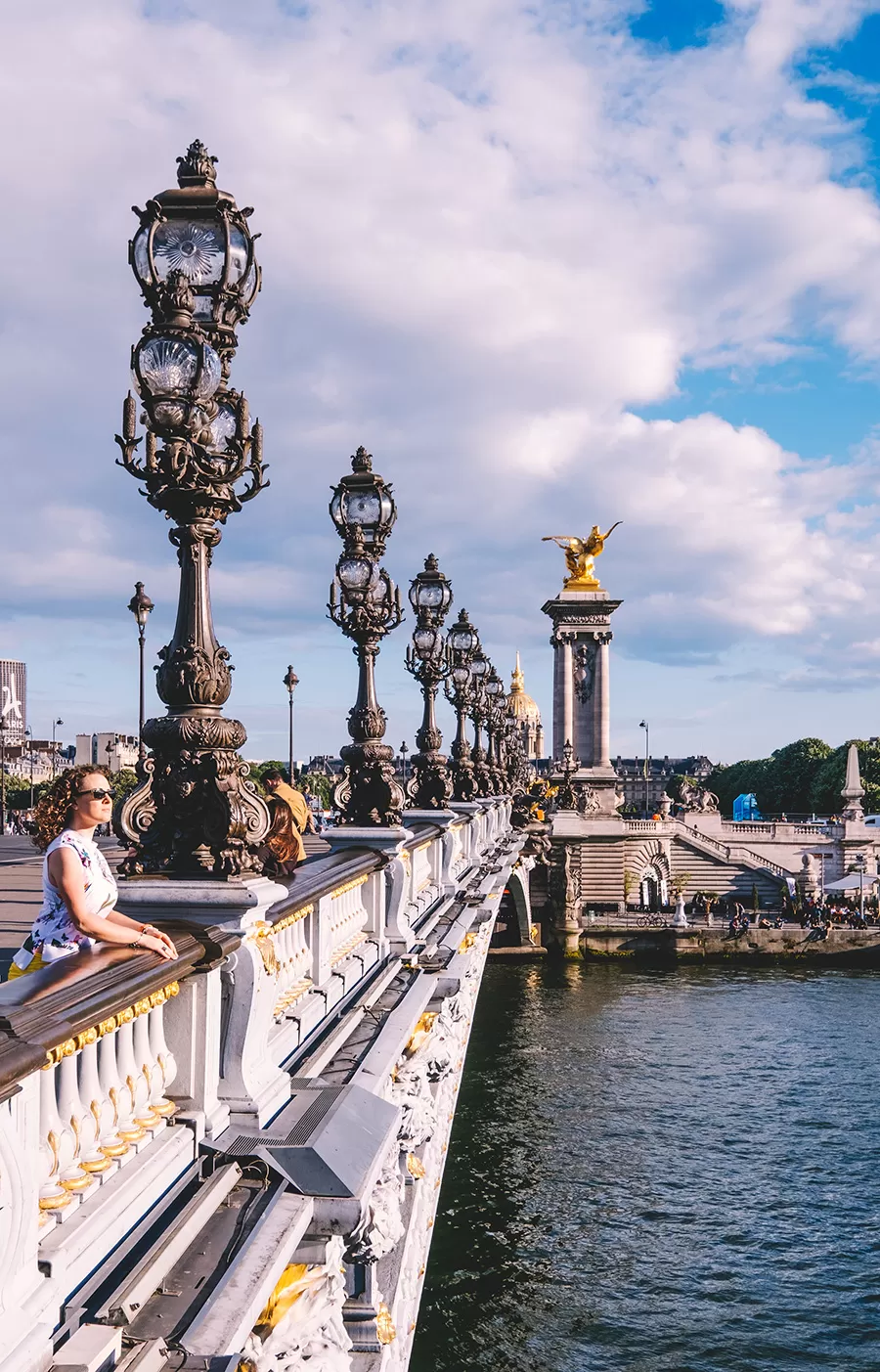
The French and English languages have a pretty mixed-up history. Following the Norman Conquest of 1066, Norman French was adopted as the language of power on the British Isles.
For the next 400 years, French was the language of the nobility and of most official documents. King Henry V put a stop to that when he went to war with France, but because the two languages existed in parallel for so long, the English language is peppered with words of French origin, many of which can be traced back to French roots. This means that you actually already know a lot of French, even if you don’t think you do.
Now for the tricky stuff!
French Pronunciation Tips
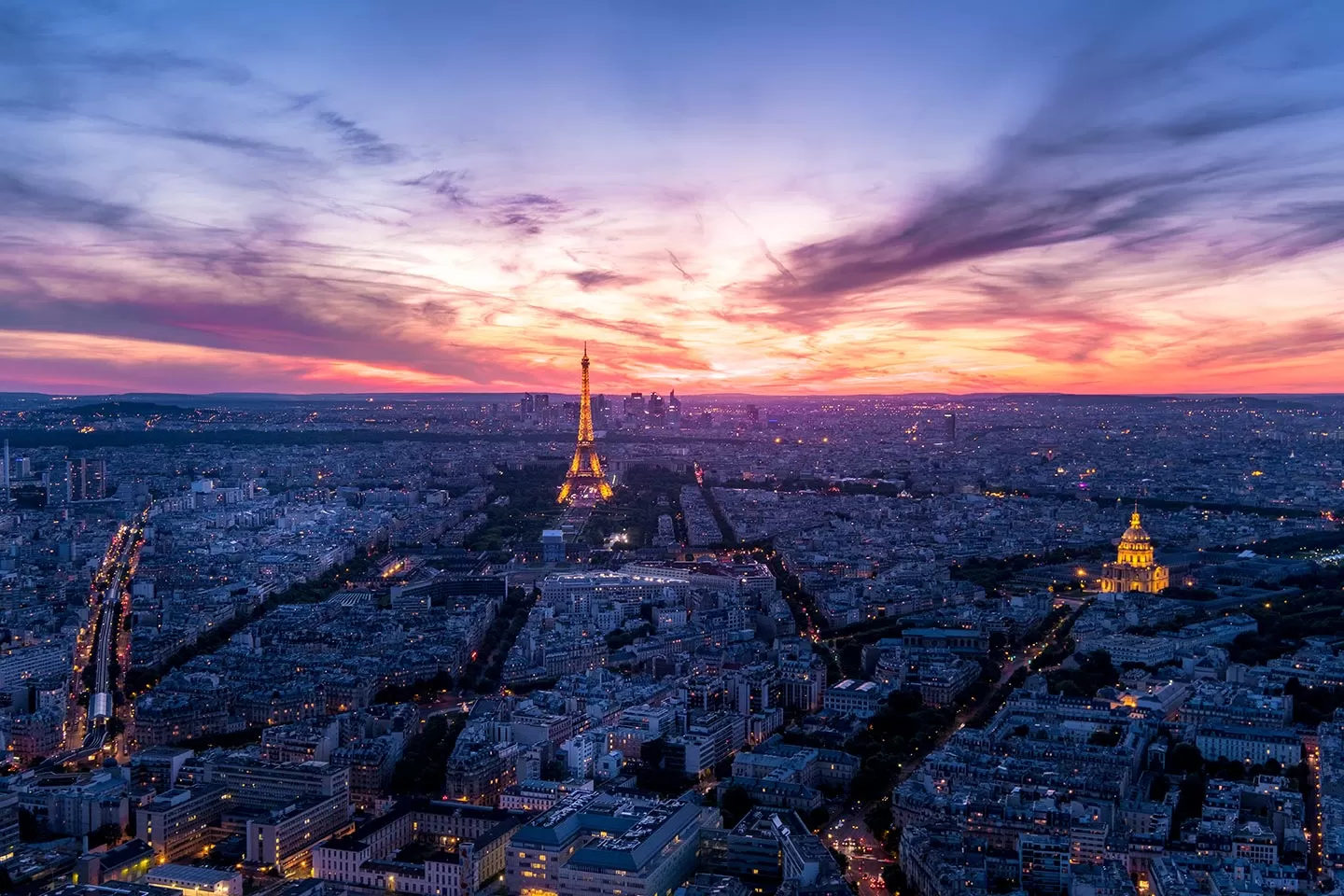
There is a total of 26 letters in the French alphabet. Standard French contains 13 oral vowels and up to 4 nasal vowels, but there are 5 additional accented letters that can be applied to change the sound of a letter.
Here are some helpful pronunciation tips:
Using Liaisons
One of the fundamental rules of pronouncing French (and many other Latin-based languages) is that everything has to flow. That’s one of the reasons why French sounds so beautiful.
If you’re speaking French correctly, everything should sound like a continuous melody.
That’s where liaisons come in.
Liaisons are a phonetic link between two words that may sound awkward if left unconnected.
Let’s take a look at some examples where they are used when speaking:
- After pronouns e.g. vous avez sounds like vooz-ah-vey not voo ah-vey
- Numbers and nouns e.g. deux amis sounds like derz-ah-mee not der ah-me
- One syllable prepositions e.g chez eux sounds like shez-uur not sheh uur
And liaisons that are forbidden when speaking:
- When using full names e.g.
- After et (and)
Liaisons may seem complicated at first, but they will become easier the more you listen to spoken French. After a while, you’ll automatically be able to notice where a liaison is needed (and where it isn’t) and how to make it sound natural when speaking.
What Not to Pronounce in French
Much like English, the French language isn’t written phonetically. The same sound can be represented by several different combinations of letters, and there are many cases of silent French letters. Two of the most well known are the silent “e” and the silent “h.”
The Silent “e”
The letter “e” is often silent in French, especially at the end of a word. Here are some examples:
Rue (road/street) is pronounced roo not roo-ee and inacceptable (unacceptable) is pronounced an-ah-sep-tah-bil not an-ah-sep-tah-ble
Of course, there are exceptions when it comes to masculine and feminine adjectives and nouns.
In the case of feminine adjectives and nouns, this typically means that the final consonant of the masculine form will now be pronounced. So, the masculine ouvert , meaning open in the masculine form and pronounced oo-ver , will become ouverte in the feminine form and pronounced oo-vert . The ‘ e ’ makes the final letter sounded.
The Final Consonant
As you’ve probably already noticed, there are a tonne of French letters that simply aren’t pronounced at the end of words. Don’t worry, you’ll get used to it!
In French, silent letters, or lettres muettes , have rules and exceptions just like many other linguistic concepts.
In general, the final consonants of a word are usually silent in French except in some cases of the letters c, f, l or r .
Just remember this simple rule, the consonants in the word ‘ careful ’ are always pronounced.
For example,
Avec (with) is pronounced ah-ve k
Cinq (five) is pronounced saan k
Hiver (winter) is pronounced ee-ve r
The general rule regarding French word endings is that when in doubt, you probably don’t pronounce it. But, French is full of exceptions!
The Infamous “r”
For many English speakers, the French “r” can be a source of frustration. To pronounce it, you’ll need to use your throat and imagine you’re trying to gargle. The French “r” is pronounced in the same place as the English “k”, but with your throat closed.
The Silent “h”
As you’ve probably noticed from every French speaker’s failed attempt to say the word “hamburger” in English, the “h” in French is a silent letter no matter where it’s located in a word.
The only exception to this is when the preceding letter is “c,” in which case the “ch” combination makes a “sh” sound or “k” sound.
Here are a few examples of the silent “h”:
Le haricot vert (French bean) is pronounced leh ah-ree-coh ver
Huit (eight) is pronounced weet
Hiver (winter) is pronounced ee-ver
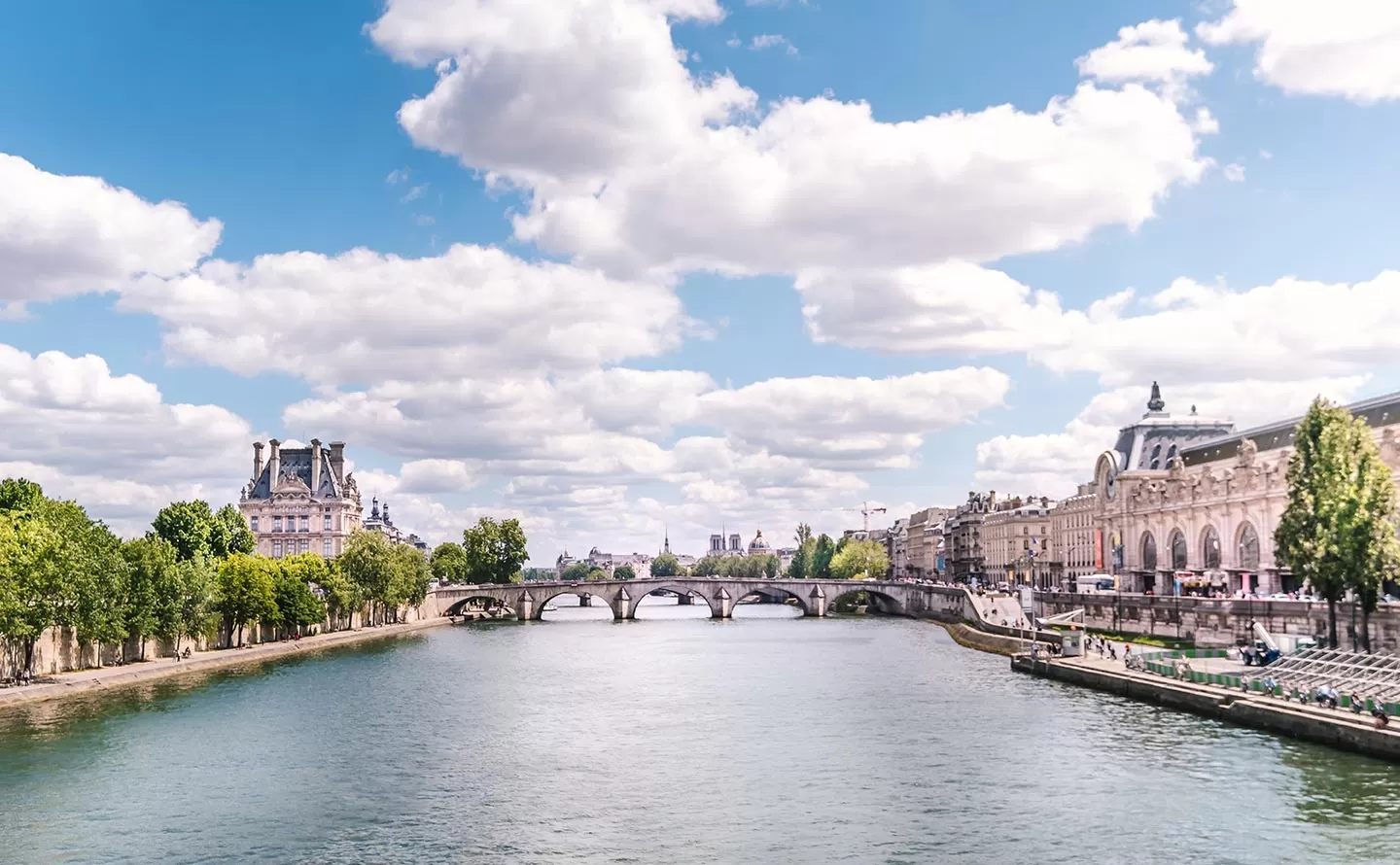
Admittedly there are a few finicky grammar rules to learn, but generally speaking, English grammar corresponds relatively closely to French grammar.
Consider words in English that end with – ible and -able , these are the same in French, only the pronunciation changes. So, the French word ‘possible’ sounds like poss-ee-bleh and ‘comfortable’ becomes kom-for-tah-bleh .
Then we have English words ending in -ent and -ant which also come from French and have the same spelling and the same meaning. So, the word, différent sounds like diff-er-ohnt and important sounds like ahm-poor-tahnt . The ‘t’ at the end is just slightly sounded.
Had enough? Ok, one more! Words in English ending in -ary l ike contrary become -aire in French. So, ‘contrary’ becomes contraire and sounds like kon-trair . There are so many rules like this, so you can see just how easy learning French can be.
Here are top 10 French phrases for travel you SHOULD Know
Top french phrases for travellers.
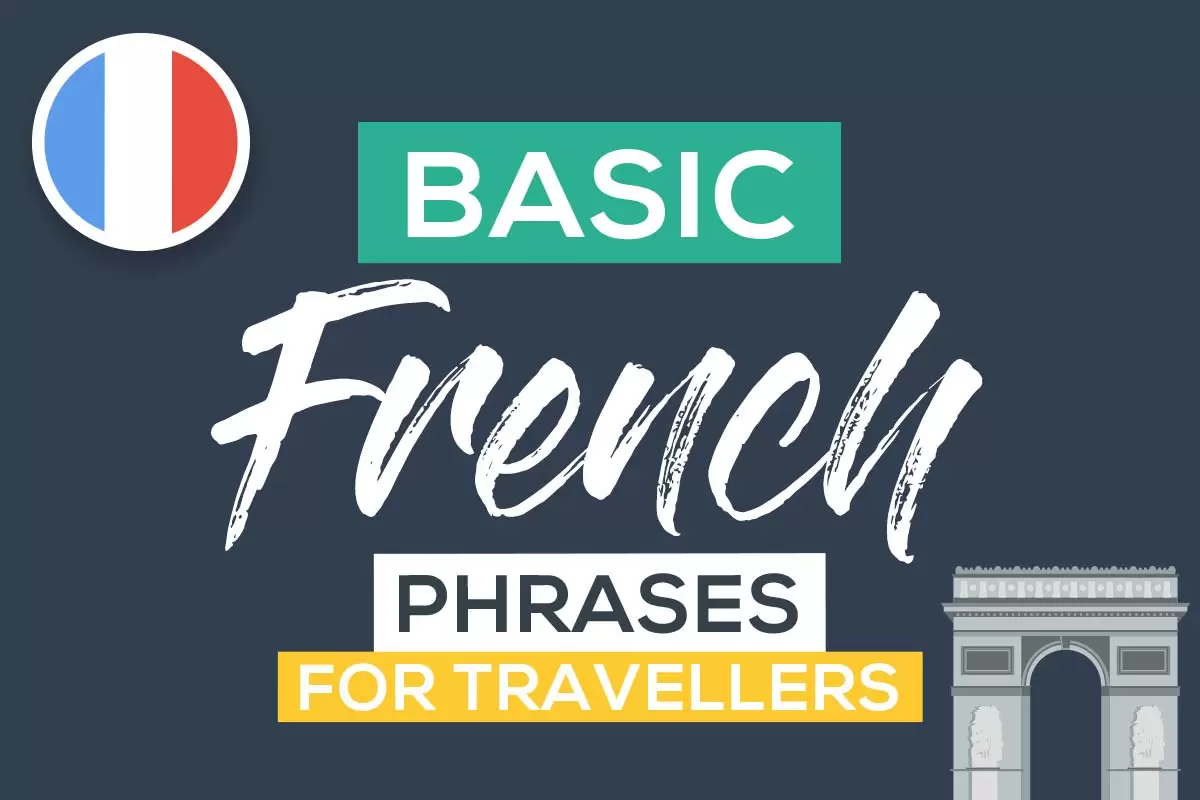
Want the infographic to take with you? Scroll to the bottom of the page.
Greetings Essentials Questions Eating Out Getting Around Numbers Days Emergencies
**There are a few places that use unique words for the numbers 70 ( septante ) and 90 ( nonante ), such as Belgium and Switzerland. With the numbers 80 to 89, combine the number 4, the number 20, and the ones.
For example, in French 80 is four 20s, 81 is four 20s plus 1, and so forth. (Unlike most French-speaking countries, Switzerland actually has a word for the number 80. It’s huitante .)
Want more? Learn French with me, with Intrepid French!
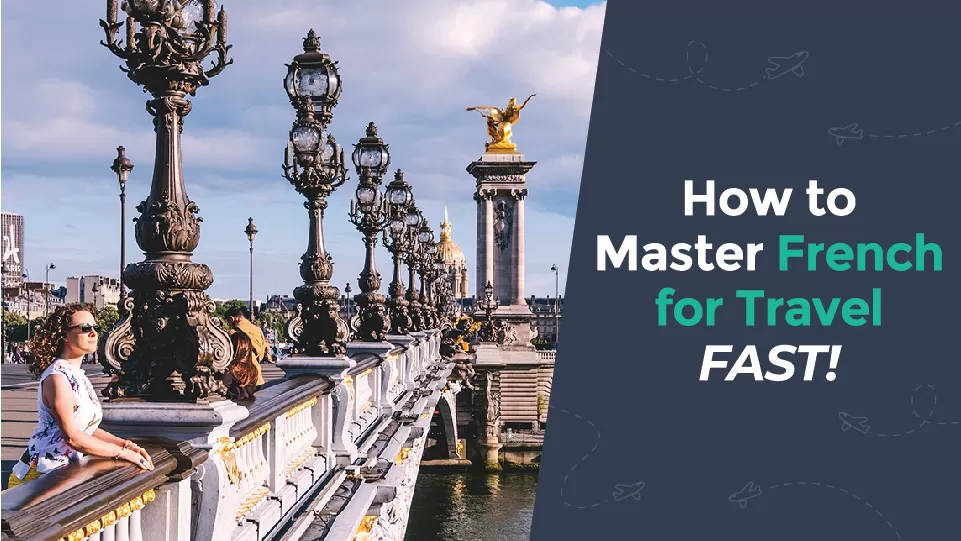
Here’s what my students are saying:

Loved it, loved it, loved it. I’ve been trying to learn languages using various language learning apps for years now and although I know random words I feel no more confident in actually speaking the language than I was when I started.” – Basil Pereira
Click here more details and get instant access!
Have a laugh with these funny French expressions
Like it? Pin or download this French travel phrase guide

Like it? Pin it for later!
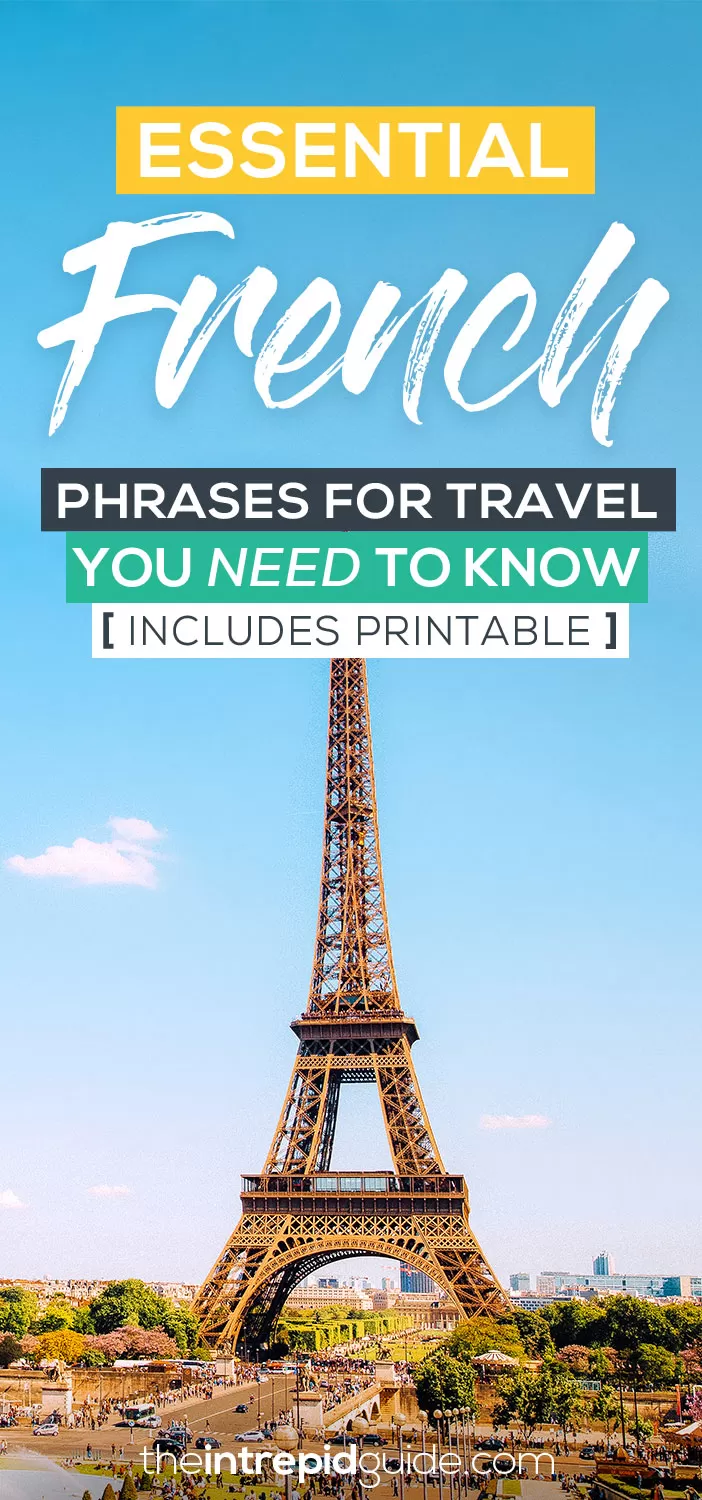
Learning French? Check out these French language guides
- Top 10 French Phrases You Should NEVER Say [& What to Use Instead]
- How to Sound More French: Top 10 French Phrases the French Love Saying
- How a ‘potato’ improved my French pronunciation
- 25 Funny French Idioms Translated Literally
- 22 Most Common French Grammar Mistakes [& How to Avoid Them]
Want to know more about learning languages? Start here!
- 6 Language Learning Tips: How to Learn a Language from Home
- What Type of Language Learner Are You? Your 4-Step Personalised Learning Plan
- 15 Top Language Learning Resources You Should Use
- 44 Best Movies on Disney Plus for Learning Languages
- 13 Ways to Seamlessly Integrate Language Learning into Your Daily Life
- 10 Pro Tips: How to Learn a Language with a Full-Time Job
- 7 Reasons Why You Should Go on a Language Holiday
- Essential Travel Phrases: How to be Travel Fluent in 10 Simple Steps
- 23 Cool Gift for Language Learners They Will Actually Use and Love
- How to Learn Your First Foreign Language in 8 Simple Steps: A Beginner’s Guide
- 11 Life-Changing Reasons Why You Should Learn a Language
- 42 beautiful Inspirational Quotes for Language Learners
- Language learning tips: 11 Polyglots Reveal The Secrets of Their Success
- Top 10 Best Ways to Learn a Language Better and Faster
- How Many Languages are there in the World?
Don’t miss my France Travel Guides
- How to Spend 4 Days in Paris: Ultimate First Timer’s Guide to Paris
- Where to Stay in Paris: A Fairytale Stay at Hotel Trianon Rive Gauche [Hotel Review]
- Where to Stay in Paris: A Decadent Stay at Hôtel Thérèse [Hotel Review]
Over to you!
Which of these French phrases are the most useful? What other languages would you like a travel phrase guide for? Have you been to a French-speaking country? Let me know using the comments section below or join me on social media to start a conversation.
Thanks for reading and I hope you enjoyed this post.
Like what you see? Subscribe using the form below to have all of my posts delivered directly to your email.
Michele creates language learning guides and courses for travel. What separates her from other instructors is her ability to explain complex grammar in a no-nonsense, straightforward manner using her unique 80/20 method. Get her free guide 9 reasons you’re not fluent…YET & how to fix it! Planning a trip? Learn the local language with her 80/20 method for less than the cost of eating at a tourist trap restaurant Start learning today!
Blond or Blonde: Why Does Grammatical Gender in English Still Exist?
How to sound more french: top 10 french phrases you should use.
This is great. I took years of French when in school, 40-years ago and now want to re-learn and be able to get by when traveling. Merci
Hi! (Sorry for the Failures, I don’t speak english very well because I am french) My Name is Salomé and I am from France. I felt random on your Website and I watched you tables and the picture called ” French travel Cheat sheet “. What you’re doing is awesome because you help people open us to the World. I am proud of what you do. I want to help because I am a native speaker of French not of all the French (Canada, Belgium..) but from France. Salomé
Hey Michele, love the article, love the guide. I think there are some mistakes on the French spelling and pronuciation for the word Right.
Right =droite drrrwa (with the funny r for the French). Apart from that, what a precious website!! Well done!
Hi Monique, thank you for correcting this typo, I’ve just fixed it now :)
Hey Michele
This is so cool. Thanks for sharing it. I was I Paris about a month ago and these would have come in very handy. Keep up the good work.
Merci Au revour
Thanks Basil, I’m so glad you enjoyed this post. I hope you’ll find it useful for future travels in Francophone countries :)
Leave a Comment Cancel Reply
Save my name, email, and website in this browser for the next time I comment.
This site uses Akismet to reduce spam. Learn how your comment data is processed .
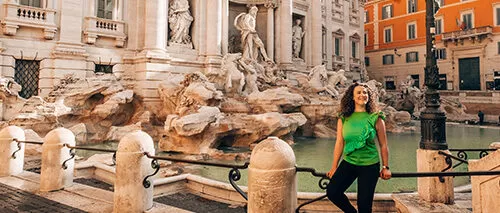
If you don't know where you are , how do you know where you're going? Find out how well you know Italian grammar today!
Unconventional language hacking tips from Benny the Irish polyglot; travelling the world to learn languages to fluency and beyond!
Looking for something? Use the search field below.
Home » Articles » 60+ Essential French Phrases for Beginners to Start Speaking Now
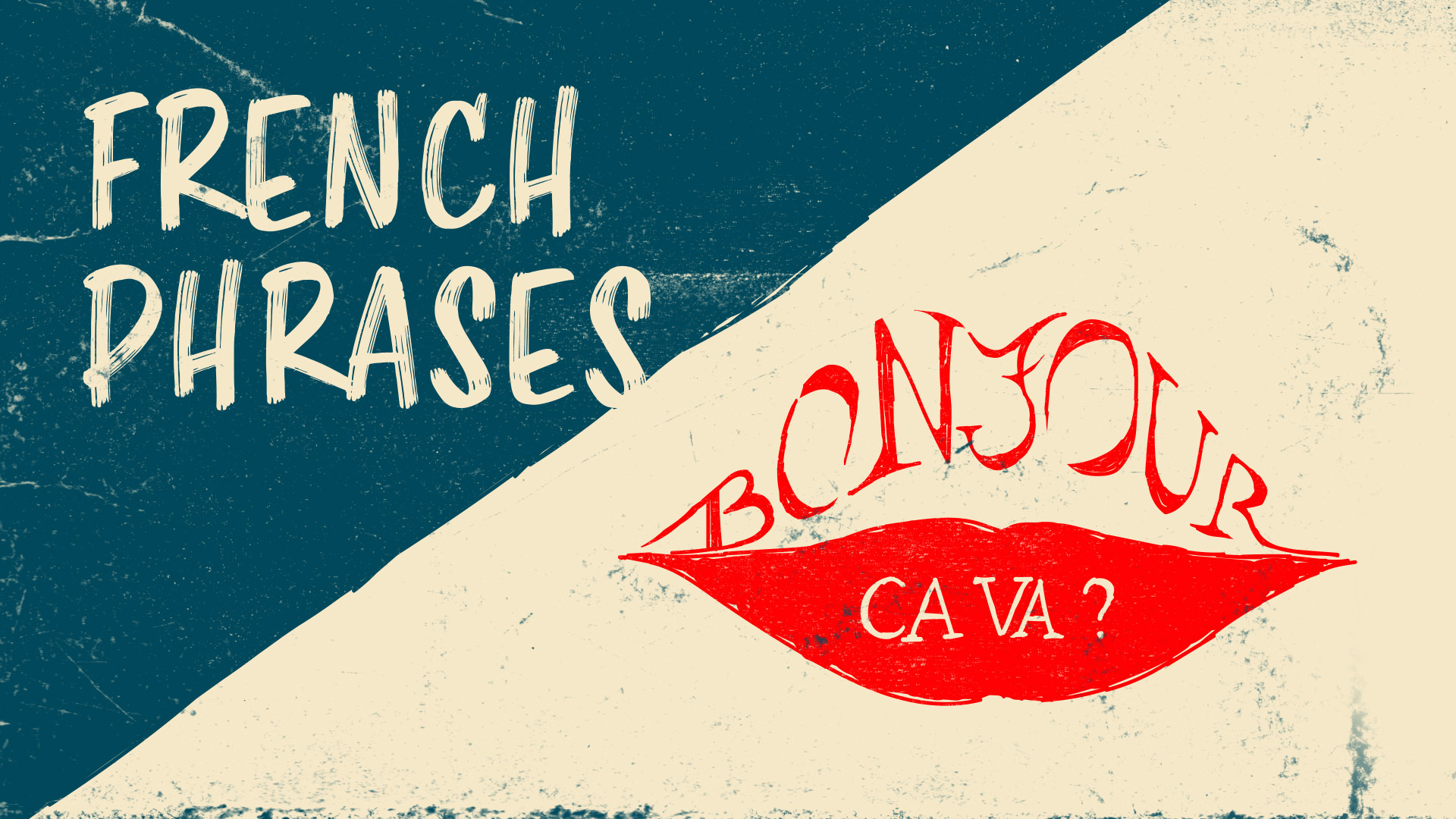
Full disclosure: This post contains affiliate links. ?
written by Benny Lewis
Language: French
Reading time: 18 minutes
Published: Jan 11, 2021
Updated: Jun 6, 2024
60+ Essential French Phrases for Beginners to Start Speaking Now
What are some French sayings? What are the most common phrases in French? And can learning a few powerful French phrases really help you start speaking right away?
Absolutely!
Even if you'll only be spending a short time in the country, learning a few basic French phrases can be very rewarding and make a big difference to your trip.
Let’s start by mastering some of the most common French phrases you need to know as a beginner:
I've long advocated that set phrases are the best thing for beginners to learn when starting out.
After all, isn't the goal of language learning to communicate?
How do you expect to communicate with anybody if the only thing you've learned so far is a verb table?
So whether you're planning to travel to Paris for a week or move to Saint-Louis-du-Ha! Ha! for the rest of your life, here are the most important and useful French phrases that you should learn A.S.A.P.
Listen to the French Phrases:
Here's a quick “French phrases” video I made that will help you with pronunciation for most of the phrases in this article:
Before we get started, if you’re looking for an online French course, here’s the course I recommend: French Uncovered – Learn French Through the Power of Story, a course with a fascinating new method by my friend Olly.
French Greetings and Polite Phrases
Bonjour – “hello”.
There are many ways in French to say “hello” , but bonjour is undoubtedly the most well-known. It's universally polite and friendly, whether the situation is formal or informal.
Bonjour is a combination of the words bon (“good”) and jour (“day”).
In the evening, you could also say bonsoir (“good evening”). A more casual way to greet people is salut , which can mean either “hi!” or “bye!”.
S'il vous plaît / s'il te plaît – “Please”
As a tourist, the last thing you want to be is rude. So when in France, remember what your mother taught you, and say s'il vous plaît (“please”) when making a request.
You can also say s'il te plaît. What's the difference? It's all about “you”:
In French there are two ways of saying “you”.
Tu is what you'd use when addressing a friend. Vous is a more polite and formal version, best used when talking to a stranger or older person.
( Vous is also what you should use when addressing a group of people in any situation, similar to saying “you guys” or “you all” in English).
So s'il vous plaît and s'il te plaît both mean “please” (literally, “if it pleases you”), but s'il vous plait is the more polite version. If in doubt, use s'il vous plaît .
(Why is it s'il te plait and not s'il tu plait ? It's a grammatical thing that you don't need to worry about as a beginner. Just learn the phrase as a whole for now, and things will become clear later.)
In fact, when asking for something in French – e.g. asking a stranger for directions or asking to see a menu in a restaurant, you should start with “ Bonjour. S'il vous plaît… ” It literally means “Hello, please…”, which would sound a bit strange in English, but it's the normal way to start a polite request in French.
Comment vous appelez-vous? / Comment t'appelles-tu? – “What’s your name?”
When meeting anyone, one of the first things you'll want to know is their name.
In French, you can find it out by asking “ Comment vous appelez-vous? ” (formal) or “ Comment t'appelles-tu? ” (informal).
Literally, these questions mean “what do you call yourself?”. You could also ask “ c'est quoi ton nom? ” – which is a more literal translation of “what's your name?”
If you're on the receiving end of this question, answer with “ Je m'appelle… ” (“my name is”, literally “I call myself”) or a simple “ Je suis… ” (“I am…”).
Oui/Non/Si – “Yes/No”
Two essential words to learn in any language are “yes” and “no”. In French, “yes” is oui and “no” is non .
Informally, it's also common to say ouais or ouaip instead of oui – like saying “yeah” or “yep” in English.
Then you have si . This is a handy little word that has no direct equivalent in English. Use it to say “yes” when someone asks you a negatively phrased question.
To illustrate what I mean, imagine that someone asks you, in English, “haven't you been to Paris?”
If you reply “yes”, it's not exactly clear what you're saying. Do you mean “yes, I have been to Paris – contrary to your assertion” or “yes, you're correct: I haven't been to Paris”?
French avoids this confusion with the word si . It means “yes”, but more specifically it contradicts the assertion in the question. In the above example, if you say si , it clearly conveys that you have, in fact, been to Paris.
Si is one of many linguistic features that I sorely miss when I speak English.
Comment allez-vous? – “How are you?”
This is the polite way of saying “how are you?” in French. Note the use of the polite vous rather than the informal tu .
Another, more informal way to say “how are you?” is ça va ? This phrase is extremely common – when in France you'll likely hear it several times per day.
If someone asks you “ ça va? ”, you can respond with a simple “ ça va bien ” – “it's going well”.
Excusez-moi – “Excuse me”
To get someone's attention, whether they're a waiter in a restaurant or a stranger on the street, say “ excusez-moi ”, “excuse me”.
This is also the polite way to ask someone to get out of your way. For example, if you're trying to exit a crowded train, a soft “ excusez-moi ” should (hopefully) be enough to make people step aside.
Pardon – “Sorry”
Picture getting off a crowded train, being careful you don't bump into anyone as you walk through the crowded metro station. But if a collision does occur, it's fine. Just say pardon , “sorry”, and all will be forgiven.
“ Pardon? ” is also how you'd ask someone to repeat themselves if you didn't hear or understand what they said. In this case, you should say it with a rising tone to indicate that it's a question.
Another way to say this is “ pourriez-vous répéter, s’il vous plaît ?” – “Could you repeat, please?”
Merci beaucoup – “Thanks a lot”
And of course, don't forget to say thank you!
The French word for “thank you” is merci . Or you can make it stronger by saying merci beaucoup – “thanks very much”.
Use merci in all the same situations you'd say “thank you” in English.
Other Must-Know French Greetings and Polite Phrases:
- Nice to meet you – Enchanté
- How’s it going? – Comment ça va?
- And you? – Et toi?
- Are you well? – Vous allez bien?
- What’s new? / What’s up? – Quoi de neuf?
- Good, thanks! – Bien, merci!
- So-so / It’s okay – Comme ci, comme ça (Literally: “like this, like that”)
- Same as always – Comme d’hab
- It could be worse – Ça pourrait être pire
- You’re welcome – Je t'en prie
- Don’t mention it / You’re welcome – De rien
- Goodbye – Au revoir
- See you soon – À bientôt!
French Phrases for Maintaining a Conversation
Je voudrais parler français – “i would like to speak french”.
The French are famously protective of their language. Sometimes they can be a bit impatient with us anglophones, and reply in English to your imperfect French questions.
It's frustrating when this happens, but if you ever want to make progress in a foreign language, you absolutely must stop speaking English !
Be polite but firm when someone tries to speak English with you – tell them “ Je voudrais parler français ” – “I'd like to speak French.”
Note that, unlike in English, names of languages are not written with a capital letter in French.
Je ne comprends pas – “I don’t understand”
Sometimes pardon doesn't quite cut it. If you really can't figure out what the other person is saying, try telling them “ je ne comprends pas ” – “I don't understand.”
There's no shame in being a beginner! Just remember not to fall back to English when the going gets tough. If you don't understand something, persevere in French anyway – it's the only way you'll learn.
Que veut dire ça? – “What does that mean?”
Maybe the reason you didn't understand is because there was a specific word you didn't recognise. If that's the case, say “ que veut dire X? ” – “What does X mean?”
You can also phrase this as “ ça veut dire quoi? ” – “What does that mean?”
Plus lentement – “More slowly”
Sometimes, vocabulary isn’t the problem. You’d know the words if you could make them out, but you can't because the other person is talking too fast!
In this case, try saying plus lentement – “more slowly”.
Better yet, say a full sentence: “ Pourriez-vous parler plus lentement, s’il vous plaît? ” – “Can you speak more slowly, please?”
Comment dit-on __ en français? – “How do you say __ in French?”
What if you need to say something in French, but the exact word escapes you?
Just fill in the blank in the above sentence: “ Comment dit-on X en français? ” means “How do you say X in French”?
A side note: the pronoun on , seen above, is an interesting one. It’s a colloquial alternative to nous (“we”). However, on is also used to refer to an unspecified person or people in general, like the word “one” is sometimes used in formal English. (If you speak German, note that on in this sense is like the German word man .)
One doesn't use the word “one” very much in modern English – one finds it rather old-timey and stuffy. These days you normally use “you” when you're talking about people in general.
Comment ça s'écrit? – “How do you spell that?”
If you learn a new French word using the phrase above, you might want to write it down before you forget it.
Unfortunately, French spelling isn't the easiest.
The relationship between spelling and French pronunciation can be complicated. Generally, it's easier to figure out a word's pronunciation from its spelling than it is to know its spelling from its pronunciation. I wrote a guide to help you with French pronunciation here .
So if you're not sure, ask someone “ comment ça s'ecrit? ” – “How do you spell that?” Literally: “How does that write itself?”
Or if you don't trust your own transcription abilities, try asking them to write it for you: say “ Est-ce que vous pouvez l'écrire? ” – “Can you write it (down)?”
Other Helpful Phrases for Maintaining a French Conversation:
- Can you speak more slowly please? – Pouvez-vous parler plus lentement s'il vous plaît?
- Can you say it one more time? – Pouvez-vous le dire une fois de plus?
- Do you speak French? – Parlez-vous français?
- Do you understand? – Comprenez vous?
- What do you do for a living? – Qu’est-ce que tu fais dans la vie?
- How old are you? – Quel âge as-tu?
- I’m _ years old – J’ai _ ans
- Where are you from? – D'où êtes-vous?
- I’m from… – Je viens…
- Are you married? – Es-tu marié?
- Are you single? – Es-tu célibataire?
- When can we meet? – Quand pouvons-nous nous rencontrer?
- What’s your phone number? – Quel est ton numéro de téléphone?
French Phrases for Getting Around
Où est… – “where is…”.
Struggling to find your way around? Not to worry. Just get a stranger's attention (remember what phrase would you use to do this?) and ask “ où est X ” – “Where is X?”
“X” could be many things: la Tour Eiffel, le Louvre, Notre Dame … or perhaps something less exotic, like le metro or un restaurant .
Où se trouve la station de métro la plus proche? – “Where is the closest metro station?”
Another way of saying “where is it?” is où se trouve , literally “where is (it) found”.
Here's an example of où se trouve combined with another handy phrase to know: la station de métro la plus proche means “the closest metro station”.
One more piece of useful vocabulary: once you're in the metro station, you might want to ask someone “ où est le guichet? ” – “Where is the ticket window?”
Je voudrais acheter un billet – “I would like to buy a ticket”
Now that you've found the guichet , you probably want to buy a billet – a ticket. But what type of ticket do you want?
- un billet aller simple – a one-way ticket
- un billet aller retour – a round-trip ticket
Make your decision, and tell the assistant “ je voudrais un billet aller simple/retour pour X ” – “I would like to buy a one-way/round-trip ticket to X”, where X is your destination.
C'est combien? – “How much is it?”
France isn't the cheapest of countries – so whether you're at the guichet or elsewhere, it doesn't hurt to be price-conscious.
To ask how much something costs, say “ c'est combien? ” – “how much is it?” You can also say “ Combien ça coûte? ” – literally, “how much does it cost?”
Où sont les toilettes? – “Where are the toilets?”
It's worth learning this phrase, because you might need it in a hurry! Où sont les toilettes means “where are the toilets?”
Although if you want to use a public toilet, you could be searching for a long time.
They aren't very common in France – and if you do find one, you'll probably have to pay to use it. You're probably better off buying something in a café and using their toilets instead.
(Why is it “ où sont “, when previously we used “ où est “? Easy: sont means “are” while est means “is”. Since toilettes is plural, you must use sont , not est – “where are the toilets?”, rather than “where is the toilets”, which wouldn’t make sense.)
À quelle heure est-ce qu’il faut régler la note? – “What time is check out?”
If you're checking into a hotel in a French-speaking country, one useful thing to know the checkout time.
One way to find this out is to ask “ à quelle heure est-ce qu’il faut régler la note? ” – “What time must we check out?”
Another similar expression is: “ quelle est l'heure limite d'occupation? ” (Lit: “What is the occupancy cut-off time?”
La carte/le menu, s’il vous plaît. – “The menu, please.”
France is famous for its food, so while you're there, you'll probably want to dine in a restaurant or two!
When dining out in any language, there are usually a few subtleties around how to order. Here I'll explain one of the more important things to know in French: the words for “menu”.
I say “words” because there are two main ways to say “menu” in French.
The general word is carte , which you may recognise from the expression à la carte .
A carte is what you typically think of when you hear the word “menu”. It's a list of individually-priced options; you pick and choose what you want, then add up the prices to get your total bill.
But you can also ask for a menu , which is usually called a “fixed-price menu” in English. When ordering from a menu , you pick an option for each course (starter, main course, etc.) and pay the same, fixed price no matter what you selected.
Whichever option you choose, inform the serveur/serveuse (“waiter/waitress”) by saying “ la carte/le menu, s’il vous plaît ” – “the menu/fixed-price menu, please.”
Je ne peux pas manger… – “I can’t eat…”
This doesn't apply to everybody, but for those to whom it does apply, it's very important: informing the waiter about your dietary restrictions.
The simplest way to do this is to say “ je ne peux pas manger de X ” – “I can't eat X”. Here are some of the more common ways to fill in the blank:
- cacahuètes – peanuts
- noix – nuts
- gluten – gluten
- fruits de mer – shell fish
- œufs – eggs
- poisson – fish
- produits laitiers – dairy products
- viande – meat
If you're vegetarian, say so with “ je suis végétarien ” (for men) or “ végétarienne ” (for women.)
A vegan is a “ végétalien(ne) “, although végan/végane is sometimes used too.
You could also explain “ je ne consomme pas de produits animaux .” – “I don't consume animal products”
Nous voudrions commander maintenant. – “We would like to place an order now.”
To “order” in French is commander , when you're talking about ordering something in a restaurant.
Don't confuse this with ordonner , which is used in the sense of “to order a person to do something”, such as in the military.
After receiving the carte or the menu , and perhaps informing the waiter of your dietary restrictions, you may be given some time to make a decision. When you're ready, say “ nous voudrions commander maintenant ” – “we'd like to order now.”
It’s also acceptable in nearly any restaurant to use on instead of nous for we, as I mentioned earlier: On voudrait commander maintenant.
Or if you're by yourself, say je voudrais (I'd like) instead of nous voudrions (we'd like). Bon appétit!
L’addition, s’il vous plaît. – “The bill, please”
One final bit of restaurant-related vocabulary – the bill (or “check” if you're American) is l'addition .
So when you're ready to leave, say l’addition, s’il vous plaît – “the bill, please”.
You’ll often hear la facture used in Quebec instead of l’addition – however both are perfectly understandable to waitstaff.
Other French Phrases for Out and About in France:
- Can you help me please? – Pouvez-vous m'aider s'il vous plaît?
- I would like… – Je voudrais…
- I’d like one of those please – J'en voudrais un s'il vous plait
- Three: Trois
- Four: Quatre
- Five: *Cinq
Learn more: French Numbers: Counting in French from 1 – 100+
Romantic French Phrases
Je t'aime – “i love you”.
Finally, let’s talk about love.
They say that French is a romantic language, so maybe in your travels you'll find love on the road? Or maybe after you get home, you'll want to use your newfound French skills to woo that special someone.
So how do you say “I love you” in French?
The French word for “to love” is adorer – but you generally only use this word when talking about things rather than people, for example to say that you love a place, book, or song.
When talking to a person, say je t'aime . Aimer usually means “like”, but in this context it means “love” in the most romantic of senses. Use it wisely!
Here are some other romantic French phrases:
- My heart – Mon cœur
- My love – Mon amour
- You’re beautiful – Tu es belle (to a woman); Tu es beau (to a man)
- You’re too cute – Tu es trop mignon
- I like you (Lit: “You please me”) – Tu me plais
Bonus: French Slang
Wondering what a famous French saying is that you could use in everyday life? Or how do you say “cool” in French slang?
Here are some bonus French sayings and slang to level up your French:
- Cool – Cool (yes, really! Just say it with a French accent 😉)
- Awesome – Génial
- That sucks – C’est nul
- That’s great – C’est top
- Don’t worry – T'inquiète
- Losing my mind – Perdre la tête
Over to You
Can you think of any other useful French phrases for tourists? What are the most important words and phrases for beginners to know? Let us know in the comments.
And if you’re ready to learn more French, check out the 111 core French words that are commonly used. Or learn some more fun French slang !
Benny Lewis
Founder, Fluent in 3 Months
Fun-loving Irish guy, full-time globe trotter and international bestselling author. Benny believes the best approach to language learning is to speak from day one .
Speaks: Spanish, French, German, Italian, Portuguese, Esperanto, Mandarin Chinese, American Sign Language, Dutch, Irish
Have a 15-minute conversation in your new language after 90 days
You are using an outdated browser. Please upgrade your browser or activate Google Chrome Frame to improve your experience.
108 French Travel Phrases
Having essential French travel phrases on hand can totally transform your trip. If you meet people, get lost or just need to ask a local some questions , these expressions and sayings will help you out in most scenarios and make your time in France truly memorable.
I’ll introduce you to 108 basic French phrases for travelers, as well as tips and cultural context so they’re easier to memorize ahead of time.
Common French Words and Phrases
French phrases to introduce yourself, questions for traveling in france, french for getting around, clarifying french phrases, basic french phrases for shopping, phrases for dining out in french, french words for a night out, how to prepare for traveling to france, and one more thing....
Download: This blog post is available as a convenient and portable PDF that you can take anywhere. Click here to get a copy. (Download)

Let’s start with the absolute basics.
Bonjour (Hello) Add a monsieur (sir) or madame (ma’am) to be polite.
Salut ! (Hi/Hey!) This is a more casual version of “hello.” You’ll hear the young folks throwing this one around.
Au revoir (Goodbye)
À plus / À plus tard ! (See you/See you later!)
À la prochaine ! (See you next time!)
Bisous / Bises ! (Kisses!) This is a casual way to say goodbye.
Bonsoir (Good evening)
Bonne journée ! ([Have a] good day!)
Bonne soirée ! ([Have a] good evening!)
Vous me manquez déjà ! (I miss you already!)
Pardon (Excuse me)
Merci (Thank you)
S’il vous plaît (Please)
Excusez-moi monsieur / madame (Excuse me sir/ma’am)
Parlez-vous anglais ? (Do you speak English?)
Comment dit-on … en français ? (How do you say … in French?)

These phrases will help you out when meeting locals and trying to make French-speaking friends.
Je m’appelle… (My name is…)
Moi, c’est… (Me, I’m…) This is a more casual way of introducing yourself.
Comment vous appelez-vous ? (What is your name?)
Tu t’appelles comment ? (What’s your name?) Use this one for when you want to keep things casual, with the tu form .
Comment allez-vous ? (How are you?)
Ça va ? En forme ? (How are you? You good?)
Nous sommes arrivés / arrivées… (We arrived…) Use this phrase to let someone know when you got into town.
Nous restons… (We’re staying…) Use this phrase to explain to your new friends where you’re staying, as well as how long you’re staying.
Je vous présente… (lit. “I present you…”) This is another way of saying “This is [my]…” when you want to introduce two people to each other.
Enchanté/Enchantée. (Pleased to meet you.)
Je suis ravi / ravie de faire votre connaissance. (I am glad/delighted to meet you.) You’ll raise some impressed eyebrows if you bust out this fancy French “nice to meet ya.”
Je parle un peu français. (I speak a little French.)
If you’re learning French, chances are you’ll want to practice your language skills when you go out there. However, it can be intimidating approaching a native—letting them know that you’re not fluent will really put your mind to rest!
Saying je parle un peu français will enable you to continue practicing your speaking skills, while at the same time alleviating any pressure you might feel to talk fluently. Use this phrase when you’re first starting a conversation, or want to continue talking to someone in French.
J’apprends le français depuis… (I’ve been learning French for…)
People are sure to notice your French accent and they’ll probably want to know how long you’ve been learning the language of love.
Je suis là pour les vacances / le travail. (I’m here for vacation/work.)
After you’ve made your initial introductions, it’s likely that a person with whom you’re speaking will ask about the time you’re spending in France. While many people travel to the country for vacation, this isn’t always the case, so informing the other person of your reasons for traveling can help fuel the conversation you have.
It’s likely that the other person will want to expand on the topic, so having a few words ready about your future itinerary or your job wouldn’t go amiss.
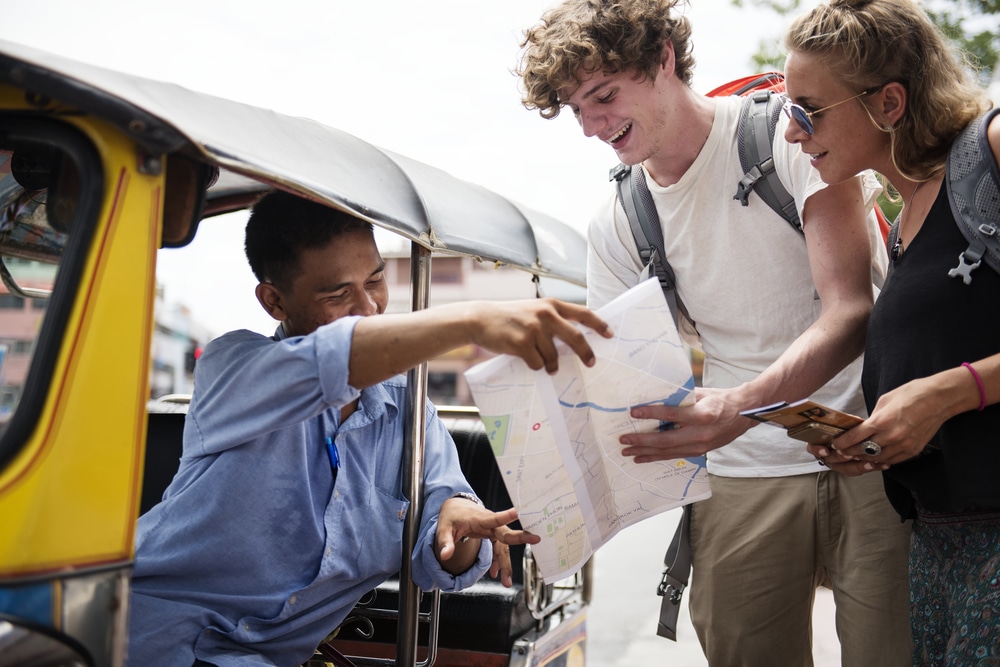
Où est… ? (Where is…?)
This is a phrase that you’ll need to use a lot in France, and it pays to memorize the names of a few places so you can get by if you’re stuck.
Here are some French phrases for travelers to build off of “où est.”
Où est…
l’hôtel ? (the hotel?)
la banque ? (the bank?)
l’aéroport ? (the airport?)
le guichet ? (the ticket window?)
la plage ? (the beach?)
Quel temps va-t-il faire aujourd’hui ? (What will the weather be like today?)
Don’t forget that much of the time, the weather in France is described using the verb faire .
Learning some French vocabulary for weather is a great idea before you venture out—being able to understand what sun and rain are in French will help you to listen out for all the right words.
Il fait beau aujourd’hui (It’s beautiful weather today)
Il pleut (It’s raining)
Il fait chaud (It’s hot)
Il fait froid (It’s cold)
Il fait soleil / Il y a du soleil (It’s sunny)
Il fait venteux / Il y a du vent (It’s windy)
Est-ce que vous pourriez prendre ma photo, s’il vous plaît ? (Could you take my photo, please?)
Everyone loves a souvenir, and it’s likely that you’ll take your camera along with you to capture precious memories. In touristy zones, natives are used to being asked to take photos, but if you’re going to do it, it’s especially nice to be able to inquire in French.
If there are a group of you, replace ma photo (my photo) with notre photo (our photo). And to be polite, start your request with excusez-moi monsieur/madame .
Addressing someone by the equivalent of “sir” or “madam” in French is generally expected, so if in doubt, err on the side of being over-polite—the person taking your photo is much more likely to accept your request!
Pouvez-vous m’appeler un taxi, s’il vous plaît ? (Can you call me a taxi, please ?)
Getting home in France when public transport has stopped running can be a real worry, and unless you’re right next to a taxi stand, it can be very difficult to find a cab. If you’re at a venue late, ask this question to one of the staff.
Staff are likely to have all the information about local transport and taxis and normally will be able to supply you with one in no time at all! As usual, address the person in the most polite way you can and thank them for their help.
Learning about other forms of transport will also help you to no end, especially when you’re searching for a way to get home.
Le bus (The bus)
Le train (The train)
Le bateau (The boat)
Le car (The coach)
La voiture (The car)
Pouvez-vous m’aider ? (Can you help me?)
In the unlikely scenario that you get into trouble when in France, it’s really important to have armed yourself with the right words to get out of a bind. Even just knowing this phrase is incredibly handy.
Of course, just because you need help doesn’t mean you’re in trouble—you might just need directions . The above phrase can be used in those scenarios, too, and is a great way to identify people who are able to speak French and who know their way around town.
Où est l’ambassade américaine ? (Where is the American Embassy?)
Again, travel French isn’t just about getting around, eating well and having fun. There are also French phrases to know in case of emergency.
If you run into trouble in France, one good address to have on hand is that of the American embassy . A stolen U.S. passport or ID card can be replaced at the embassy, and you might need their help if there is ever a political problem in France and you need to exit the country quickly.
That’s a rarity to be sure, but it’s better to be prepared while traveling!
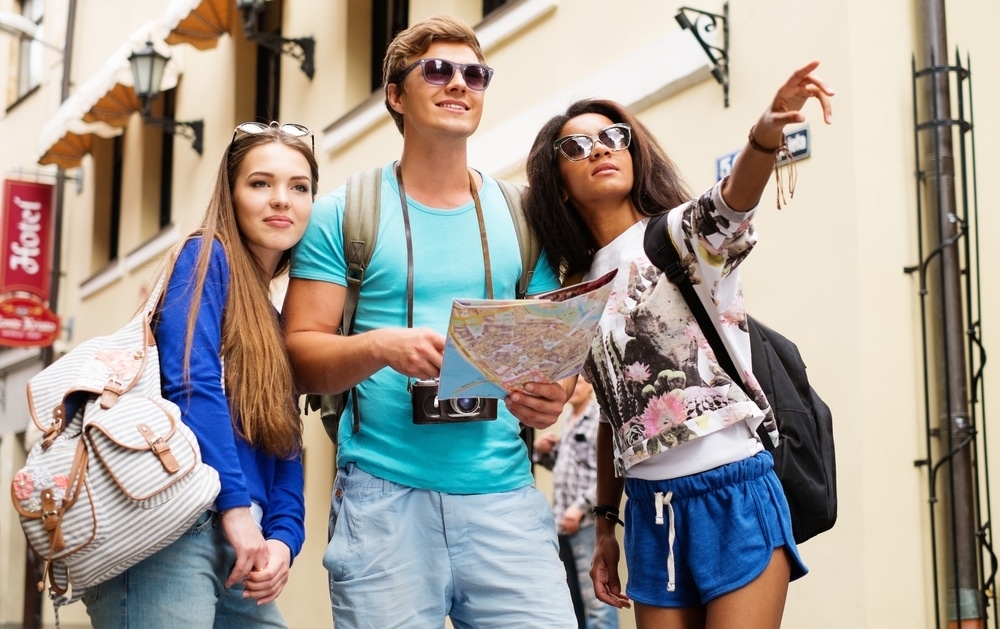
You’ll likely benefit from some further directional guidance while traveling around France. These phrases will come in handy.
Où est le métro ? (Where is the metro?)
Où sont les taxis ? (Where are the taxis?)
Où est la sortie ? (Where is the exit?)
C’est près d’ici ? (Is it close by?)
C’est loin ? (Is it far?)
Est-ce que ce bus passe par… (Does this bus pass by…)
Emmenez-moi à cette adresse, s’il vous plaît. (Take me to this address, please.)
Use this polite phrase with your taxi driver before you hand over that crumpled sticky note with François’ address on it.
Je vous dois combien ? (How much do I owe you?)
After your chauffeur de taxi (taxi driver) has so graciously driven you to François’ place, you’ll have to pay up.
Puis-je avoir un plan de la ville, s’il vous plaît ? (Can I have a map of the city, please?)
Use this phrase when you roll up to the office de tourisme (tourist office). You can also ask for a public transit map specifically:
Puis-je avoir un plan du métro, s’il vous plaît ? (Can I have a metro map, please?)
Je cherche… (I am looking for…)
Je cherche is another handy French travel phrase, especially if you’re traveling for the first time in a French city.
Unlike in English, where we say “I am looking for …” the French don’t use a preposition (“for”) after the verb, and simply follow this phrase with what they’re searching for.
Je cherche…
le bus (the bus)
un taxi (a taxi)
les toilettes (the toilets)
l’hôpital (the hospital)
Je ne comprends pas. (I don’t understand.)
A necessity if you’re trying to make conversation with a native, je ne comprends pas will serve you well if you ever get stuck.
Often, French people are so pleased to find a foreigner who’s able to speak their language that they’ll get a little carried away and enthusiastically try to start a complex conversation. While situations like these are incredible if you’re a learner, they can also be very intimidating.
Don’t worry if you don’t understand. Simply excuse yourself, say that you don’t understand and if you would like to continue the conversation, try the following French phrase:
Pouvez-vous répéter, s’il vous plaît ? (Could you repeat that, please?)
Parlez plus lentement, s’il vous plaît. (Speak a little slower, please.)
For French learners, the coveted native speed of speaking can seem unattainable, and while you can learn to understand it over time, it does take a little adjusting to. If you’re speaking to a local and would like them to speak a little more slowly, it’s better to just ask them, rather than suffering in silence.
Saying parlez plus lentement, s’il vous plaît will let your speaking partner realize they might be going a little too fast for you, but that you would still like to continue.
If you’d like them to go back over something they’ve been talking about, you can again ask them to repeat themselves to have them re-cover a topic that might have gone over your head.
Don’t worry about seeming rude—French people are often willing to help learners with their language skills, and will likely have no problem adjusting their speed.

If you’re traveling in France, you’ll probably be doing some shopping while you’re there!
Je suis à la recherche d’un… (I’m looking for a…) A great line for engaging the chipper shop girl, practicing your French and finding gifts for the folks back home.
Non, je regarde pour l’instant. (No, I’m [just] looking for the moment.)
C’est pour… (It’s for…)
Combien ça coûte ? (How much does this cost?)
Puis-je commander cela sur l’Internet ? (Can I order this on the internet?)
Je voudrais payer en liquide / espèces. (I would like to pay in cash.)
Est-ce que vous acceptez les cartes étrangères ? (Do you accept foreign cards?)
Be aware that paying for items when abroad may not work the same way as at home.
If you’re in a smaller town in France especially, it’s always worth checking with hotels or shop owners if they accept foreign modes of transaction. Asking est-ce que vous acceptez les cartes étrangères ? will ensure that you don’t find yourself in any sticky payment situations down the line.
If you’re from North America, asking acceptez-vous les cartes sans puce ? (do you accept non-chip cards?) might be more to the point. Many North American cards don’t have chip-and-pin security, and some stores in France don’t have magnetic strip readers.
Generally, most tourist destinations will be equipped to deal with foreign credit cards, but if you’re ever not sure, it always pays to double check!
À quelle heure est-ce que cela ferme ? (What time does it close?)
Across France, especially in the summer months, it’s worth checking out closing times. To ask when a shop or attraction is closing, use this question.
On the other hand, to inquire when a place will be opening, ask à quelle heure est-ce que cela ouvre ? (what time does it open?). Both of these phrases are really essential when traveling, so make sure you learn them ahead of time!
And remember, French time works a little differently and is often given on a 24-hour cycle, so if someone responds with dix-sept heures (literally, “17 hours”), they mean 5 p.m.
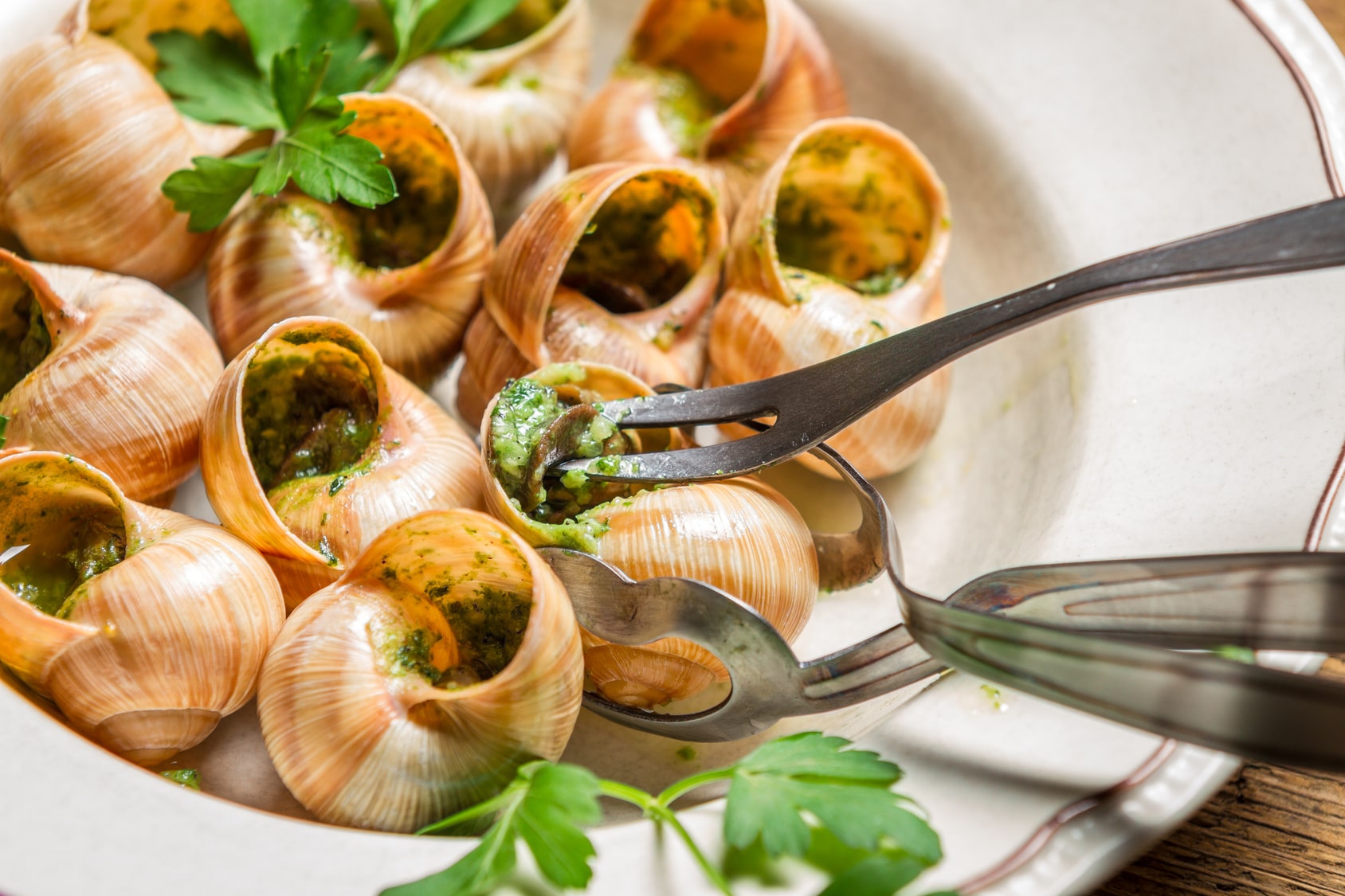
French cuisine is famous around the world, so what better place to try it than in its country of origin? These French phrases will help you make the most of dining in France.
Une table pour 4, s’il vous plaît. (A table for 4, please.
Le menu, s’il vous plaît. (The menu, please.)
La carte des vins, s’il vous plaît. (The wine menu, please.)
Est-ce que le service est compris ? (Is the tip included?)
C’est trop bon ! (This is so good!)
J’ai bien mangé. (I ate well/I’m full.)
Je suis répu / repue. (I’m satisfied/I’m full.) This one will really impress people. This is some real français soutenu (formal French) , and you’ll rarely hear a young French person say this.
On prend l’apéro ensemble ? (Let’s have an apéritif together?)
An apéritif is a beverage one drinks before eating—typically something alcoholic like whiskey, vodka or pastis , for example.
Je voudrais… (I would like…)
Je voudrais is likely to be a phrase that you’ll need to use very frequently—when ordering food , attending new places or just trying to buy something in a shop.
While most phrasebooks will contain the names of most foods and items that you would need to order, it’s worth remembering a few so that you don’t get stuck in a sticky situation! Here are a few you may want to commit to memory.
Je voudrais…
un café (a coffee)
une bière (a beer)
une baguette (a baguette)
de l’eau (some water)
l’addition (the bill)
À votre santé ! (To your health!)
Say this right before you clink glasses with your new French pals. Be sure to make eye contact while doing so .
You can also just say santé ! (health!). À la vôtre ! (to yours!) is also a good option when you’re with more than one person or having a tête-à-tête (one-on-one discussion) with a distinguished gentleperson.
À la tienne ! (to yours!) works for casual one-on-one scenarios. Tchin tchin ! (clink clink!) has the benefit of being pretty cute and onomatopoeic.
You’re sure to exude a certain je ne sais quoi (“I don’t know what”) as well as an ease with pronouns .
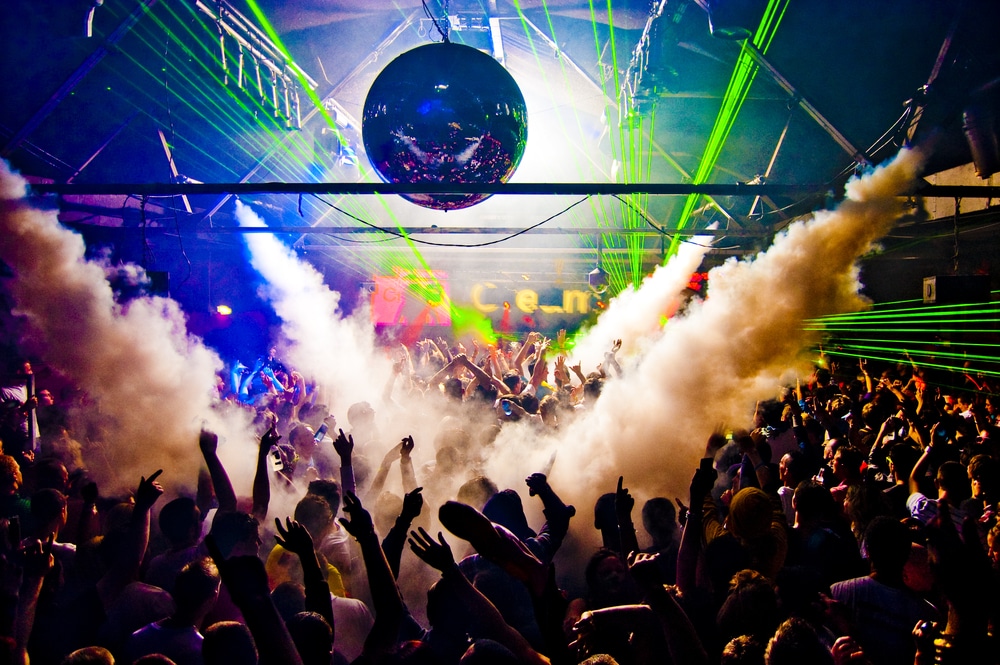
You’ve done the museums, the galleries, the restaurants, the cafés… time to party!
Ça te dit d’aller boire un verre ce soir ? (Want to go get a drink tonight?)
J’ai envie de faire la fête ! (I want to party!)
On s’installe là-bas ? (Let’s sit over there?)
Je voudrais une pinte de blonde / un verre de vin. (I would like a pint of light ale/glass of wine.)
On va prendre la bouteille. (We’ll take the bottle.)
On prend des shooters ! (We’re taking shots!)
Est-ce qu’il y a un after ? (Is there an after party?)
Je suis crevé / crevée, j’y vais. (I’m spent, I’m leaving.)
Rentrez-bien ! (Get home safely!) A good phrase to keep in your pocket when you’re leaving your party animal friends in the club.
Je me suis vraiment bien amusé / amusée. (I really enjoyed myself.) Did your new French pals take you on an exhilarating tour of the coins et recoins (nooks and crannies) of a charming neighborhood? Then let them know that you had fun!
Find a French phrasebook for travelers
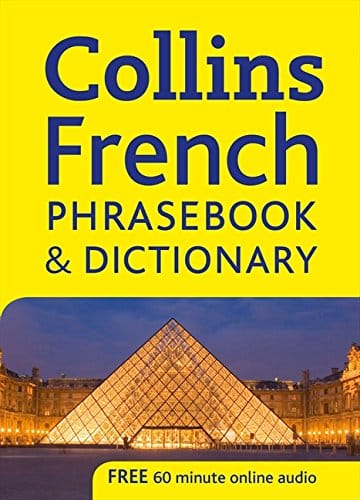
Before you travel, you’re going to want to arm yourself with a few essentials, and at the top of your list should be a really great French phrasebook . Although I’ve just given you lots of helpful, common French travel phrases, it’s always good to be ready for any eventuality, and a phrasebook will act as a great backup.
One great phrasebooks for French learners are the “Collins French Phrasebook,” which contains a French dictionary for your convenience.
For more options, you’ll want to explore Lonely Planet to see what’s available. There are French phrasebooks for every corner of the French-speaking world, and some have additional features like accompanying audio files, travel guides or apps.
Research local customs
Wherever you go in France, you’ll find a whole host of things that make the area unique. Whether it’s local French cooking , events or linguistic differences, it pays to research the place you’re going and, if necessary, learn a few basic French phrases relating to whatever may be going on around you.

In Paris, for example, some museums and galleries are free to all on the first Sunday of the month—a deal worth taking full advantage of! If you want to check out the region to which you’re traveling, France.fr is a great place to do so.
And of course, your French phrasebooks or regional travel guides can offer you insight into customs, culture, etiquette and holidays.
Make a list of activities
Just getting to France may seem like a dream come true, but unless you have some idea of how you want to spend your time, it can pass you by in a haze.
Before you leave for your trip, try making a list of things you’d like to do. This way, you can adjust the phrases you learn accordingly and be ready to ask about certain exhibitions in the area or how to find a place to eat that serves a certain local dish you’d like to try.
Spontaneity is wonderful, but a little planning doesn’t hurt, either!
Use an immersion program
You can get used to hearing the French language before you leave your house with immersion programs. Using an immersion program at home is a good way to get used to the sounds and natural speed of the language. It’s also a way to hear turns of phrases , filler words and slang —basically, parts of the language that are rarely taught in textbooks. Learn these, and your French will sound much more natural.
Learn polite French terms of address
The French take manners very seriously, and if you’re meeting someone for the first time, or talking to a stranger, it’s important that you address them in the right way.
If you’re trying to attract the attention of someone who might be able to help you, say either “hello sir/madam” or “excuse me sir/madam” in French, as given above. Similarly, when you enter a shop, it’s always nice to greet the shopkeeper by saying hello or good morning, also as you learned above.

You can get a head start on polite conversation for practical, everyday matters with ed2go’s Beginning Conversational French course. This is a short online course that prepares you for communication in places like restaurants, hotels and other typical scenarios you may encounter on your travels.
There are also different terms of address in French, and depending on how well you know someone, you’ll have to address them in a certain way. For people you know, you can say tu (you) when talking to them. This can also be used for children and animals.
For strangers, figures of authority or your elders, you must use vous (you). This is a much more polite term of address, and expected when you haven’t gotten to know someone well yet.
If you’re struggling to know which one to use, always veer on the side of caution and use vous. The other person will tell you if they want you to say tu to them instead!
Traveling to France is a thrilling and eye-opening experience.
In order to get the most out of the trip, it’s a great idea for tourists and travelers to learn some basic French phrases and words ahead of time.
These French travel phrases will have your back throughout your trip!
FluentU has a wide variety of great content, like interviews, documentary excerpts and web series, as you can see here:

FluentU brings native French videos with reach. With interactive captions, you can tap on any word to see an image, definition and useful examples.

For example, if you tap on the word "crois," you'll see this:

Practice and reinforce all the vocabulary you've learned in a given video with learn mode. Swipe left or right to see more examples for the word you’re learning, and play the mini-games found in our dynamic flashcards, like "fill in the blank."

All throughout, FluentU tracks the vocabulary that you’re learning and uses this information to give you a totally personalized experience. It gives you extra practice with difficult words—and reminds you when it’s time to review what you’ve learned.
Start using the FluentU website on your computer or tablet or, better yet, download the FluentU app from the iTunes or Google Play store. Click here to take advantage of our current sale! (Expires at the end of this month.)
Related posts:
Enter your e-mail address to get your free pdf.
We hate SPAM and promise to keep your email address safe

Survival French: 120 Must-know Phrases for visitors to France
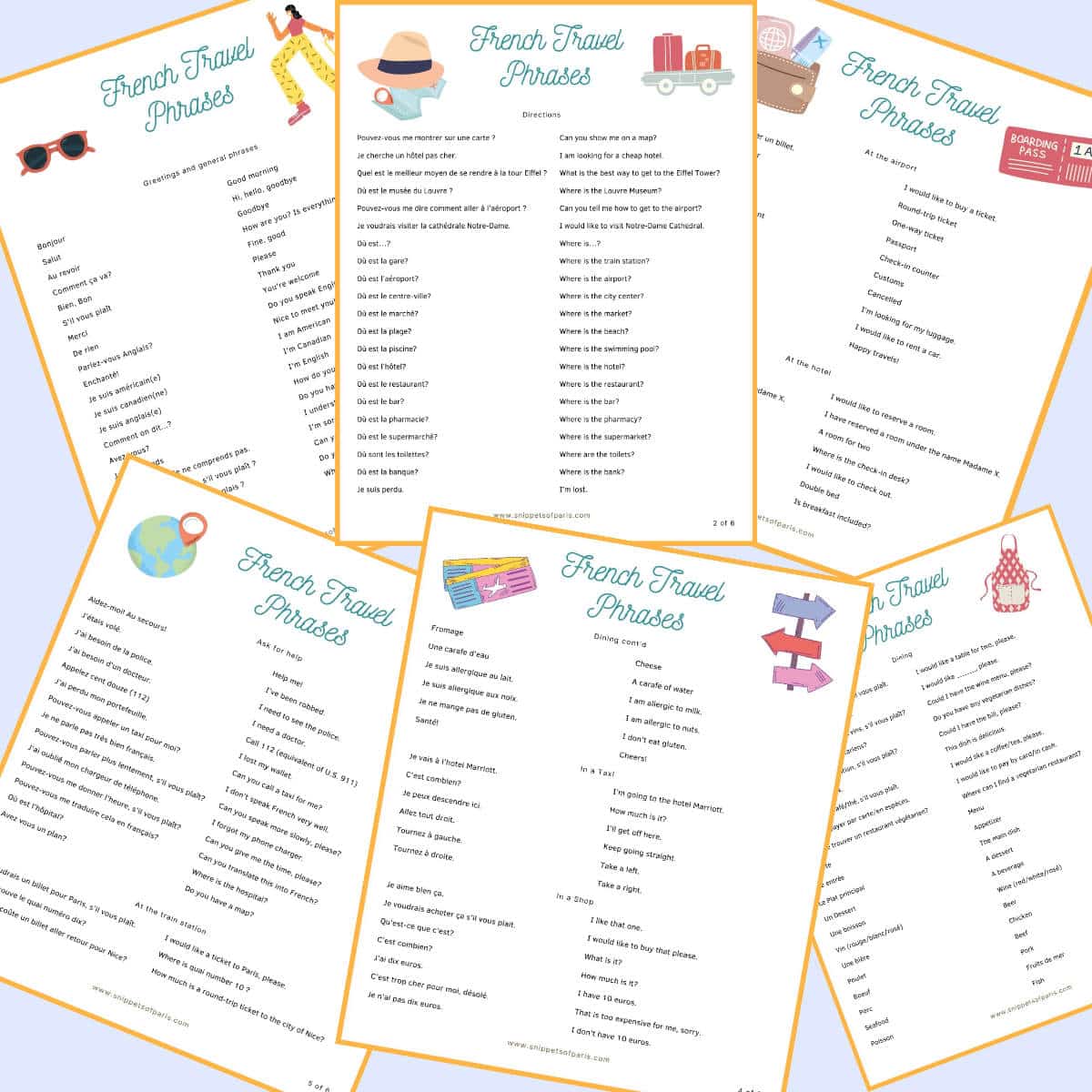
- Post category: French Language / Travel to France
- Post author: Nassie Angadi
If you are planning a trip in France, you may want to learn a few french travel phrases to make the most of your visit. Travel can be stressful, so there’s no better way to calm your nerves than by understanding the local language .
The French are notoriously shy about speaking English, so a few phrases in French is bound to put everyone at ease. In this article, I will cover some useful phrases in various instances, from asking directions, ordering at a restaurant, going somewhere in a taxi, etc.
So, without further ado, let’s take a look at the top useful French travel phrases for your big trip to France. Allons-y!
Greetings and general phrases
There is quite a lot of different French greetings but the most basic is the Bonjour . If there is only one word to remember on your trip, this is the one.

Asking for help
You can find more information on calling emergency numbers in France here.
At the airport
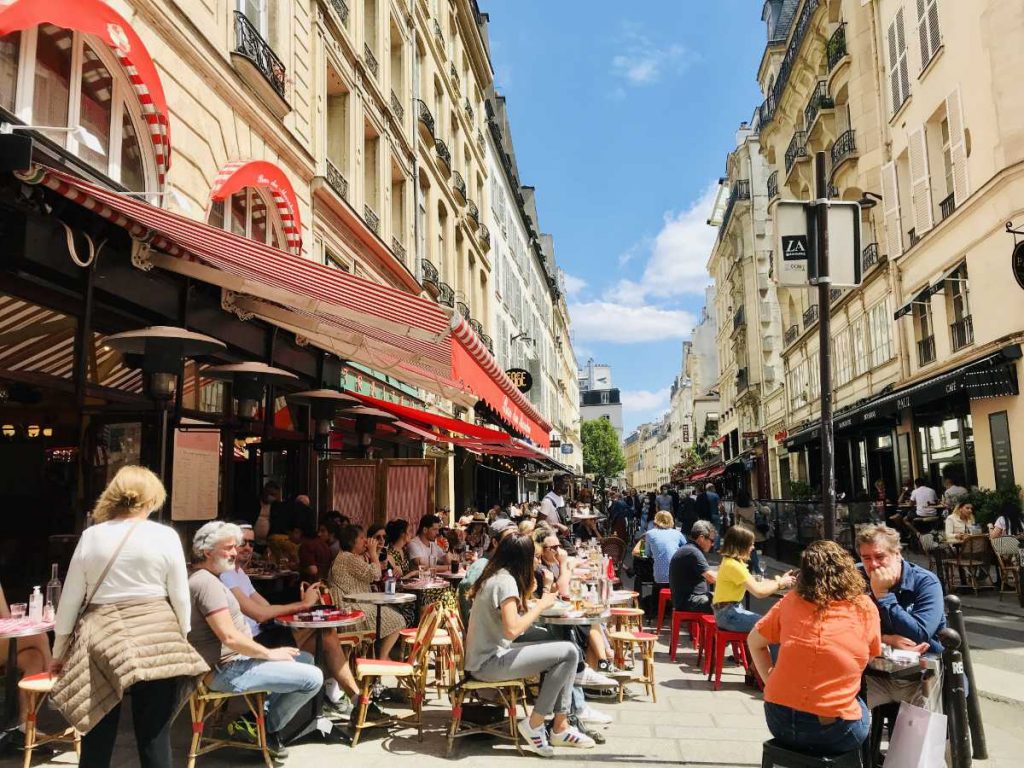
Food, restaurants and dining out
You can find more French food culinary terms here and top foods to eat in France here.
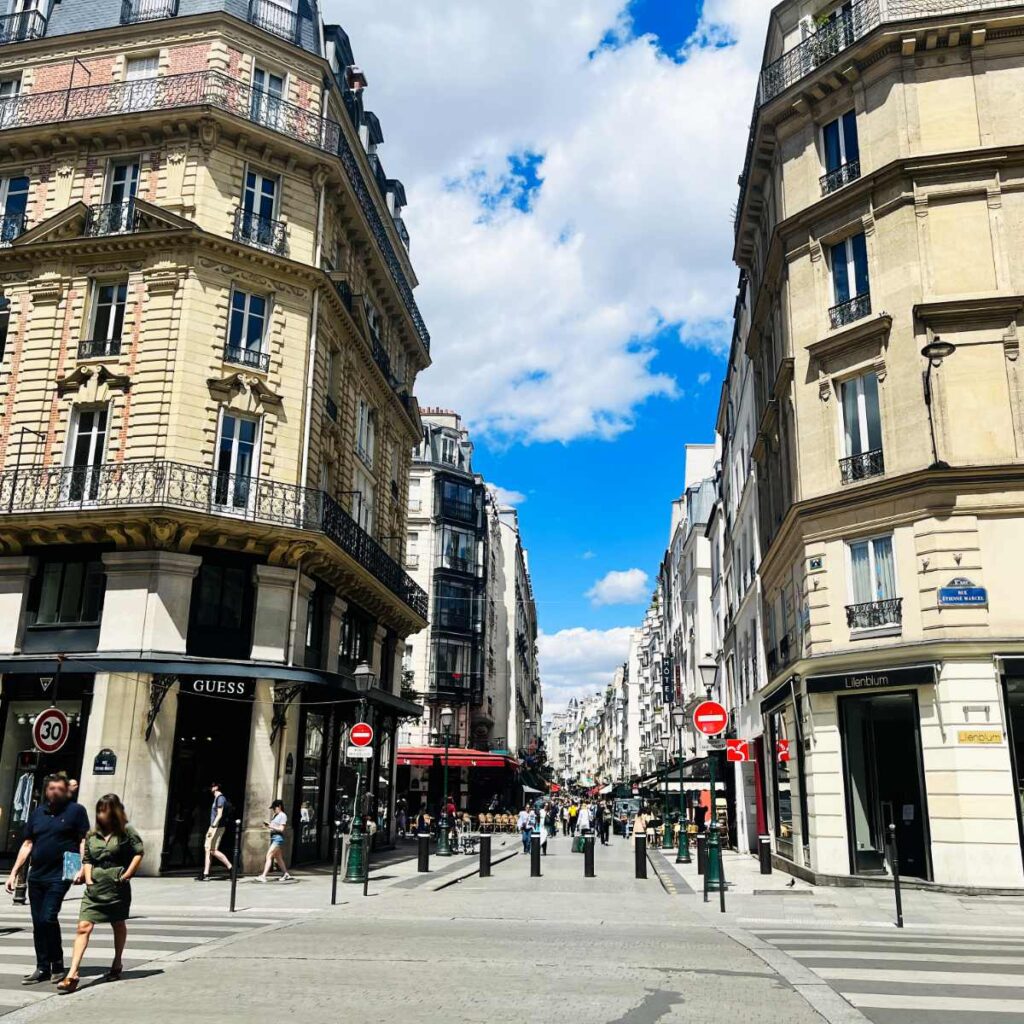
At a train station
For more numbers in French , you can find my printable here.
In a museum
You can find the top museums in Paris here. If you like, you may want to download the list in printable format below.
- Traveling to Paris
- Resources for learning French

You Might Also Like
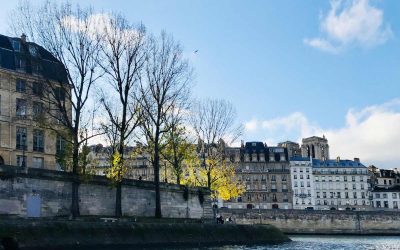
12 Famous French poems that are true classics
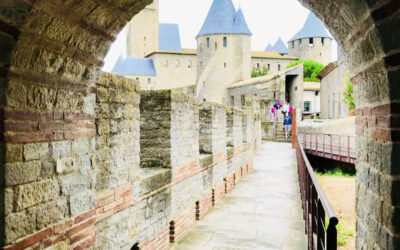
10 French walled cities you must visit

16 Funny Quotes about Britain and France

Is France safe to travel?
- Paris & Île-de-France
- Alsace & Lorraine
- Bourgogne-Franche-Comté
- Bretagne & Normandy
- Auvergne Rhône Alpes
- Loire Valley
- Northern France
- Nouvelle Aquitaine
- Provence & French Riviera
- Events and holidays
- Facts and history
- Get the Look
- Moving to France
- Appetizers & Starters
- Main dishes
- Side dishes
- Common Questions?
- Newsletters
30+ common French phrases for your trip to France
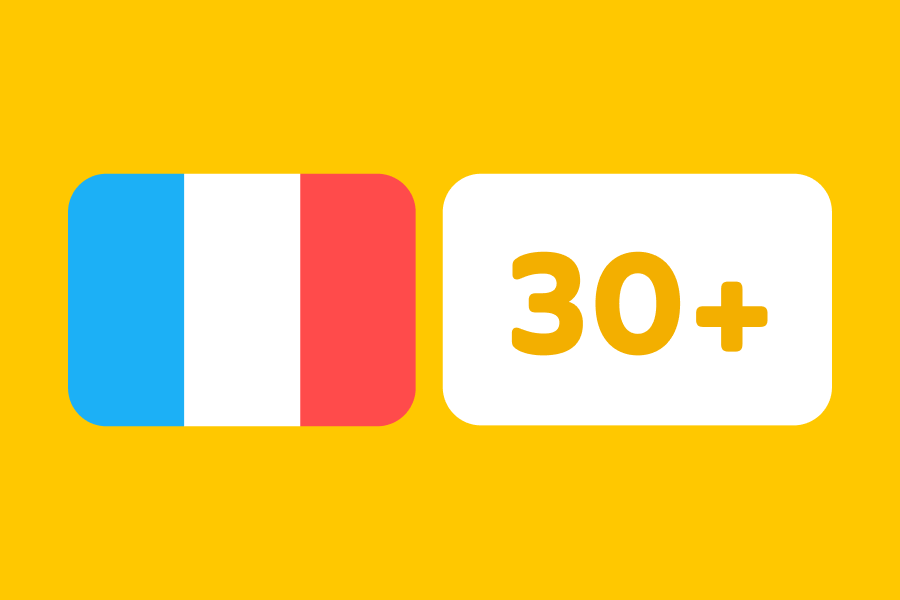
There's no better way to level up your trip to France than by practicing your French! Learning a few key phrases will help you feel more confident ordering in a French pâtisserie (pastry shop) and chatting with locals at a marché (market).
Here are the most important phrases you'll need in France. On y va !
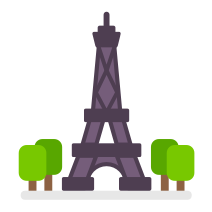
You don't have to be fluent to have fun with French. You're on vacation, so don't stress! Enjoy using the French you know and see what else you learn along the way. (And you might be pleasantly surprised that even beginners can have real conversations !)
It's the effort that counts. Using some French shows locals that you're interested in their culture and community .
Study smart, not hard. Focus on the most useful French words and phrases , and worry less about getting every grammar detail right. A few key words go a long way!
Asking for help
Getting around town, ordering food.
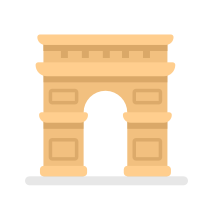
Local language
Bonjour ! It's considered polite to greet people with "good morning" or "good afternoon" when you enter stores, cafés, or souvenir shops.
Le truc. A favorite of the French, you might overhear locals use this casual word for "thing."
The beginning of your journey with French 🇫🇷
These basics will get you far in France, but there's a lot more French where that came from. To make real connections during your trip, let Duolingo be your guide! Our bite-sized lessons make it easy to fit study time into your busy schedule, and our entire French course is free—so you can save your euros for souvenirs.
Related Posts All Posts
5 meanings of "se" every spanish learner should know, verlan: the amazing system of french slang.

French Travel Phrases
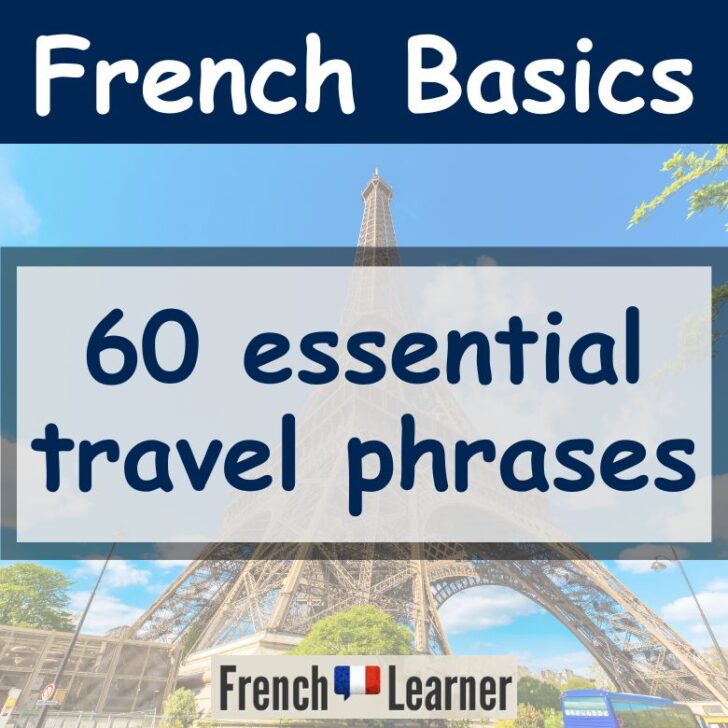
The most essential French travel phrases are Bonjour (hello), au revoir (goodbye), Où est? (Where is), C’est combien? (How much is it?) and l’addition s’il vous plaît (the check, please). This page covers over 60+ useful words and phrases which you can use on a trip to France.
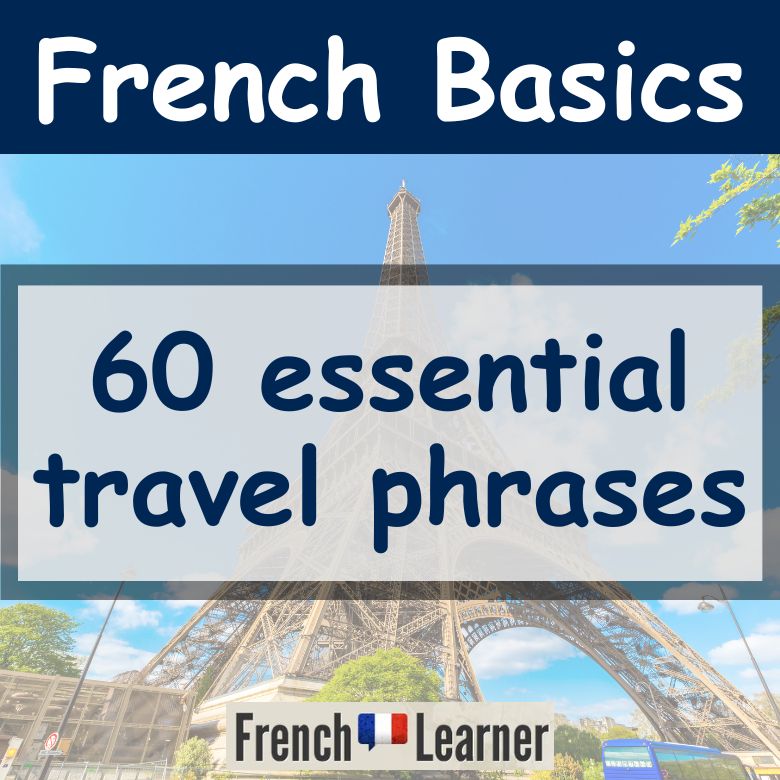
French Greetings
If you are going to France it is very important to learn the basic greetings. While you might not speak French fluently just yet, the French people will really appreciate your trying to make an effort.
- Bonjour Hello, good morning, good day
- Au revoir Goodbye
- Salut Hi/bye (informal)
- Merci! Thank you!
- Merci beaucoup! Thank you very much!
- Ça va? How are you? How’s it going? (informal)
- Bien, merci! Fine, thank you!
- S’il vous plaît Please
- De rien You’re welcome
- Enchanté! Nice to meet you!
This page on our site covers French greetings in detail.
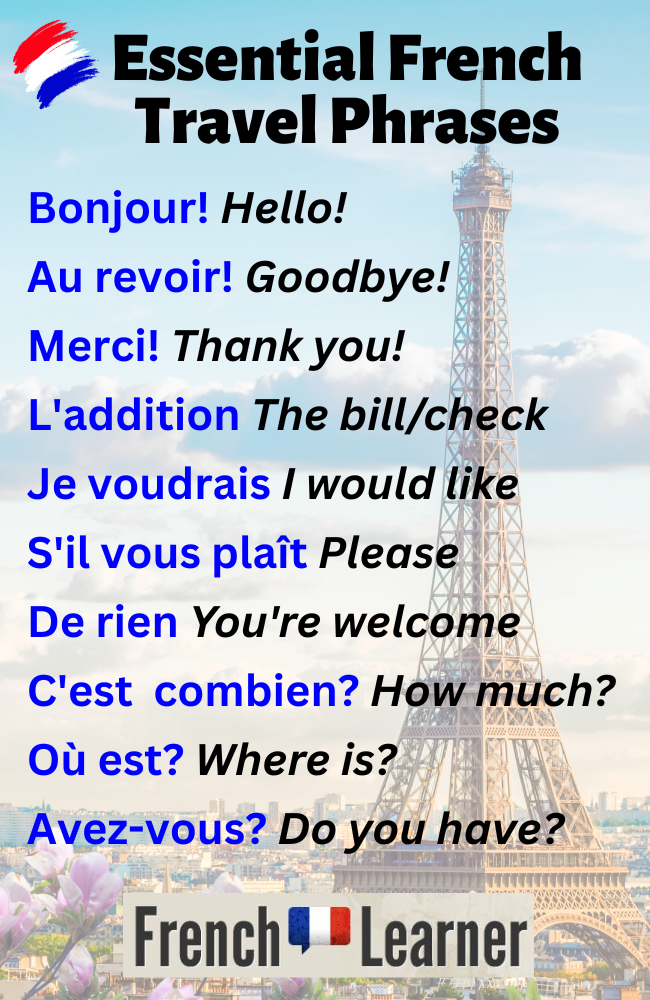
Asking directions
When asking directions in France, it’s very important that you know a few basic words. This page on our site covers asking directions in detail.
- Où est…? Where is…?
- Où est la gare? Where’s the train station?
- Où est la gare routière? Where’s the bus station?
- Où sont les toilettes? Where’s the restroom?
- Où est la banque? Where’ the bank?
- Où est un bureau de change? Where’s a exchange counter?
- Je suis perdu I’m lost
- Le plan city map
Asking for things
On your trip you’ll inevitably need to ask for things. This short list of words is a very good start. Learning the verb vouloir is a good idea as it means “to want”.
- Je veux (slightly informal)
- Je voudrais I would like
- Donnez-moi Give me
- Avez-vous? Do you have?
- Auriez-vous Would you happen to have?
- Qu’est-ce que c’est? What is it?
- Nous avons We have
- Nous n’avons pas We don’t have
- C’est disponible It’s available
Restaurant phrases
One of the best places to try practicing speaking French is a restaurant. Here’s a short list of words in phrases you may use. This page on our site offers a very comprehensive list of restaurant vocabulary . In addition, this page on our site covers food vocabulary and this page covers beverage vocabulary.
- Une table pour deux, s’il vous plaît A table for two, please
- Je prends I’ll have (from the verb prendre , to take)
- La carte menu
- La soupe soup
- La salade salad
- L’entrée appetizer
- Le dessert dessert
- La boisson beverage
- Le vin rouge red wine
- Le vin blanc white wine
- La a bière beer
- Le café coffee
Taxi/Uber phrases
If you find yourself in a taxi or Uber, some of the the following phrases should come in very handy.
- Je vais à I’m going to
- Je descends ici I’ll get off here
- Voici l’adresse Here’s the address
- Allez tout droit Keep going straight
- Tournez à gauche Take a left
- Tournez à droite Take a right
Hotel phrases
The following is a short list of words and phrases that you can use in your hotel. While most hotel staff speak basic English, it’s still nice to know these words in French.
- L’hôtel hotel
- Une chambre à deux double room
- Un grand lit Double bed
- La réception Check-in desk
- Quitter la chambre To check out
- La piscine swimming pool
- Le petit déjeuner compris Breakfast included
- Réserver une chambre To reserve a room
Miscellaneous words and phrases
The following is a list of miscellaneous French words and phrases which we feel are essential for a trip to France and belong on this list.
- Je voudrais louer une voiture. I’d like rent a car.
- Je voudrais acheter un billet. I’d like to buy a ticket.
- Un billet aller-retour Round-trip ticket
- L’aller simple One-way ticket
- Le passeport passport
- Les vacances vacation
- Je voudrais annuler. I’d like to cancel.
- Un voyage A trip
- Bon voyage! Enjoy your trip!
- Bon séjour! Enjoy your stay!
Further your learning We feel that it’s a great idea to carry a French phrase book while traveling in France. Most phrase books on the market won’t show you how to actually say the phrases. For an audio option, check out French Today’s Modern French Audio Phrasebook !
Discover more:
- Ways to say “thank you” in French
- How to say “hello” in French
- Ways to say “you’re welcome” in French
- Guide to French verbs
- Guide to French vocabulary

Sharing is caring!
David Issokson
David Issokson is a lifelong language learner and speaks over seven languages. Of all the languages he speaks, he's the most passionate about French! David has helped hundreds of students to improve their French in his private lessons. When not teaching or writing his French Word of the Day lessons, David enjoys his time skiing, hiking and mountain biking in Victor, Idaho.
See all posts by David Issokson
Which Language Do You Want to Learn?
- Inside Babbel
- Babbel Bytes
ARTICLES ABOUT
How to start speaking french before your vacation.

Illustration by Aura Lewis , courtesy of the Bright Agency.
You’ve bought your plane tickets, done your hours of research, and planned your itinerary. You’re just about ready to go, but there’s one thing missing: You don’t speak French. Whether you’re heading off to Paris for some art and culture, Brittany for a breath of fresh Atlantic air, or Bordeaux for the wine tour you’ve always dreamed of, you’ll enjoy it even more if you have a bit of the language under your belt. But where should you begin? Luckily for you, here at Babbel, we have tons of courses to teach you everything you’ll need for your trip.
Learning some French for your vacation will make it easier for you to get around, to order exactly what you want to eat or drink in a restaurant or café, and to really experience the culture by making connections with the local people. Here’s a little timeline we put together to get you speaking confidently in just two weeks!
Days 1-3: Get Started With The Basics!
There are some pretty standard things everyone should know how to say in the local language when they travel to a foreign country. Here are just a few:
- How are you?
- Good morning / afternoon / evening
- I don’t understand
- How much is _______?
To master these things in French, we suggest you start with our French beginner’s courses. They teach topics that range from introducing yourself and asking simple questions, all the way to booking a hotel and finding your way around a busy Parisian train station! You’ll also find a number of lessons focused on pronunciation, so you won’t have to worry about being misunderstood when you speak.
Depending on what you plan to do during your stay, some courses might be more valuable to you than others. Really think about what you plan to do on your trip, and try to come up with a list of situations you can imagine yourself in. We recommend taking a look at the courses on our web version so that you can see exactly what each lesson contains. This way you can pick and choose which lessons will be the best for you.
Here’s an additional lesson we think is a must-do:
Finish that one, and you’ll have the vocabulary and phrases you need to be the most polite tourist ever!
Days 4-6: Practice Ordering A Meal!
Ratatouille, bœuf bourguignon, crêpes, quiche … the list goes on! France is a veritable wonderland of food and flavor, and you’ll most likely be spending a fair amount of time in restaurants and cafés. That being said, you should plan to brush up on some useful words and phrases for ordering a meal. As menus are often only in French, it’s a good idea to learn as much food vocabulary as you can! After all, you want to make sure you know exactly what you’re ordering.
For example, let’s say you’re craving a nice Surf and Turf with scallops and a juicy steak, so you order the escalope and filet mignon. You will be understandably disappointed when you end up with a veal cutlet and a pork tenderloin. But don’t worry, we can help you avoid embarrassing situations like this. Under the “Countries and Traditions” category, you’ll find our “French Cuisine” section, which gives you a rundown of the culinary specialties from the different regions of France. After doing these courses, you won’t be surprised at what you find on your plate when you order les cuisses de grenouille!
We also have a couple of other courses about food, drink, and ordering. Here are two you should try before you jet off:
These two lessons will introduce the phrases you’ll need in order to understand the menu, order food, and ask for the bill. The satisfaction of getting through an entire meal in a restaurant en français will make the time you spend practicing absolutely worth it!
Bon appétit!
Days 7-10: Learn To Ask For Directions And Use Public Transportation
Getting lost in a place where you speak the language is bad enough. Now imagine being lost somewhere where you can’t communicate with anyone! Knowing how to ask for help will definitely lower your stress levels if you get turned around.
Now, you should have made it through some of the beginner’s courses, but just in case you missed some of them, here’s a little tip. In Beginner’s Course 2, you’ll find a unit called “Pardon, où est … ?” . These lessons will teach you all you need to know to bravely go where no tourist has gone before! You’ll not only be able to ask for and understand directions but also learn some vocabulary for common locations in a city. Make a list of the places you’d like to visit so you can learn the words for these things as well.
If you still feel like you want a little more practice, then check out these lessons too:
These will help you perfect the skills you learned from the beginner’s course, and also give you more specific information about using public transportation, which can be a confusing affair. It’s also a good idea to learn a bit about French signs and street names. After completing these lessons, you’ll truly be a well-prepared voyageur!
Days 11-14: Put It All Together (And Have Some Fun!)
With just a few days left before you leave, you’ll want to review everything you’ve learned so far so that it’s fresh in your mind and ready to be used! This is where the Babbel Review Manager will come in handy. All of the core vocabulary and phrases you’ve picked up over the last two weeks have been stored there so you can easily go back over them and practice.
If you’re feeling confident with the basics, then now it’s time to have a little fun! We have a huge selection of courses with interesting cultural and linguistic content that you can find under the categories “Countries and Traditions” and “Specials.” With these lessons, you can get your French slang up to snuff ( cimer! ), find some ideas for sightseeing, learn a bit about true and false friends, and also pick up a few idioms to really impress the locals. We promise it won’t all be pour des prunes!
After these two weeks, you should be more than ready to communicate effectively during your vacation. Our final tip for you is, of course, to have fun!
Bon Voyage!
101 Basic French Words For Travel In France
Are you planning your trip to France but feel nervous about actually speaking french among the natives? Do not worry. We made a special guide for you to help you during your trip!

Samuel Bonne
Although France lies next door to England, a native English-speaking country, you may not always be able to get by with speaking English, especially if you wish to immerse yourself in the culture or walk around the French suburbs. So, before you plan a trip to Metropolis, it's a smart option to brush up on some fundamental French terms and phrases.
Learning a few introductory greetings and courteous phrases in the mother tongue will make the most of your trip and facilitate your interactions with the locals. Even if speaking the language isn't your forte or you're not too confident, this guide below will help you speak french like a native .
Below are a few that will allow you to communicate and will surely make your vacation worthwhile.
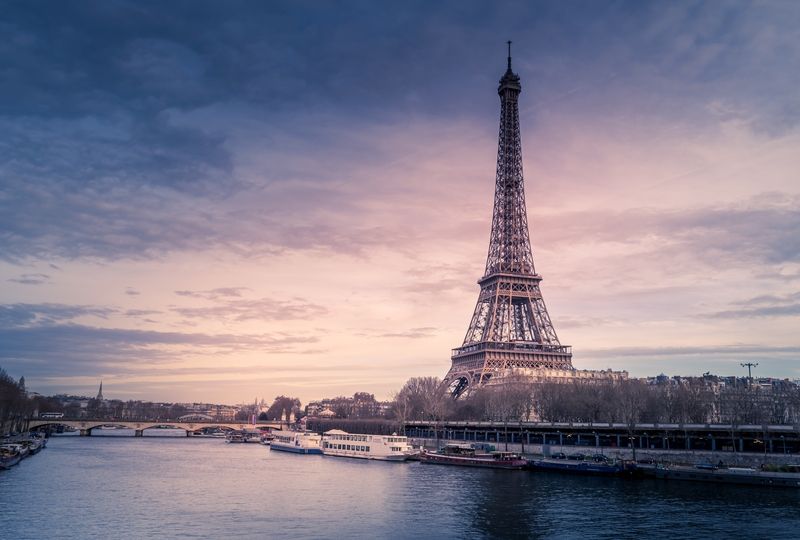
Why Visit France
France has been on each one of us's bucket list. Why not? It is known as one of the most beautiful spots on the planet.
Every tourist will find that the country has a lot to offer. Whether you've come to learn about the city's rich culture and history through its museums and architectural marvels, or you've come on a romantic trip with your loved one in, you guessed it! The City of Lights, Paris, la France has something for everyone.
Paris, as well as Bordeaux, Lyon, Cannes, and Nice, France is known for its magnificent cities and luxurious lifestyle that will certainly capture your heart. It is home to world-famous art and movies; museums such as the Louvre and the Cannes Film Festival , as well as films such as La Vie en Rose and Amelie. Moreover, learning french through art and artists is a fun and engaging way to understand the language.
It should come as no surprise that France and fashion are sides of the same coin, hence prepare to see many shopping centres and boutiques around the region. It had to be, given that it is the birthplace of some of the world's most well-known fashionistas, like Yves Saint-Laurent, Christian Dior, and LVMH.
It's also famed for its delectable cuisine, scenic towns, outdoor sports, and, most importantly, its love language, le français. So, even if you can't fly to this lovely nation just yet, you may begin to feel a connection by growing your French vocab and develop your accent right now!
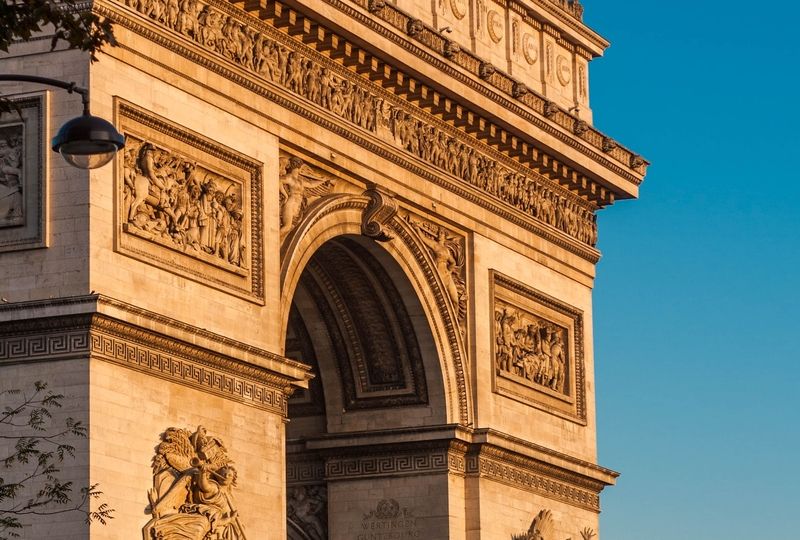
Basic French Phrases To Visit France
Learning to approach people respectfully in French is the very first step toward feeling at ease in France. It will also enhance the level of service you receive and your interactions with the French overall.
Male and female expressions are generally different, just as there are various definitions of greeting in French depending on how well you know someone.
There are often articles associated with every word, be it an object, a material or a person; they are categorised into masculine and feminine . You can use le (the)/ un (a) for a masculine noun like un garçon means a boy. Likewise, you use la (the)/ une (a) for a feminine noun like une fille means a girl.
Similarly, when speaking to someone you know or addressing a child or an animal, you can say 'tu' , which means you. However, you must use ‘vous’ while speaking to strangers, authorities or your seniors. It is a far more polite and formal way of addressing someone. Remember, it's usually safer to use ‘vous’ as a general rule.
To start a discussion, here are some simple French words and phrases to use:
The Basics Phrases You Need To Know
Common courtesy is fairly serious among the French, so whether you're meeting someone for the first time or conversing with a stranger, it's key that you address them correctly and with the appropriate expression.
Bonjour : Good morning/ Hello Do not forget to say bonjour as you enter a shop or start a conversation with someone!
Salut : Hello (casual way of saying hello)
Bonsoir : Good evening
Monsieur/ Madame/ mademoiselle : Mister/ Madam/ Miss
S'il vous plaît : Please
Merci/ Merci beaucoup : Thank you/ Thank you very much
Excusez-moi/ Pardon : Excuse me Pardon is an informal way. You can use either if you bump into someone or make your way through a crowd.
Au revoir : Goodbye
Bonne journée! : Have a good day!
Je suis désolé(e) : I'm sorry (an e is added if you identify as female)
Making Yourself Understood In French
It is important to make yourself understood if you are a tourist and you are not familiar with the language. Je is used as a subject and it stands for I.
- Je ne comprends pas : I don't understand
- Je ne sais pas : I don't know
- Parlez-vous anglais? : Do you speak English
- Je ne parle pas français : I do not speak French
- Je parle un peu français : I speak a little French
- Répétez, s'il vous plaît : Repeat please You can say this when you have not understood what has been said or if the person might have spoken too quickly, you can say:
- S'il vous plaît, parlez lentement : Please speak slowly
Introducing Yourself In French
- Je m'appelle ... : My name is ...
- Quel est votre nom? : What is your name?
- Comment allez-vous? : How are you?
- Je vais bien, et vous? : I am well, and you?
- Je viens de ... : I come from ...
- Enchanté(e) : Pleased to meet you (an e is added if you identify as female).

Transportation Words In French
The transit system is usually the main mode of transport in the country, connecting the big cities so you will have no problem travelling from one end to the other.
Prices vary over distances and it is a fast and comfortable option. You can even travel within as well as to neighbouring countries. You might need to know certain terms to be able to get your way through!
Le bus : the bus
Arrêt de bus : Bus stop
Un taxi : a taxi
Je voudrais partir à la gare : I would like to go to the bus/train station
Train : Train The high-speed train of France is called Train à grande vitesse (TGV) , you can simply say TGV.
Le Métro : Subway
Un Avion : Airplane
Une Voiture : Car
Un Billet : Ticket
Le Guichet : Ticket window
Quelle est l’horaire? : What is the schedule?
L'aéroport : Airport
La gare : Bus/ train station
Directions Phrases In French
- À gauche : To the left.
- À droite : To the right.
- Tout droit : Straight ahead.
- Où sommes-nous? : Where are we?
- C’est loin/près d’ici? : Is it far/close by?
- La Sortie : The exit
- Nord : North
- Sud : South
- L'Est : East
- L'Ouest : West
- Là-bas : There
Places Or Accomodation Terms In French
As you explore the country, you should have an idea of what certain places are called so that it's easy for you to maneuver around.
L'hôtel : Hotel
L'auberge : Hostel A hostel is usually cheaper than a hotel but you have to make sure that they are accessible and clean.
J'aimerais faire une réservation : I'd like to make a reservation
Je voudrais une chambre pour deux : I would like a double room.
À quelle heure est-ce qu’il faut régler la note? : At what time should we check out?
La plage : The beach
Les Magasins : Shops
Centre commercial : Shopping mall
L'église : Church
L'ambassade : Embassy
La poste : Post office
Le supermarché : Supermarket
La pâtisserie : Pastry shop
Asking For Help In French
As a foreigner, it is essential to learn how to ask for help if ever you find yourself in trouble, face an emergency situation or simply having issues in finding something. Keep reading to know how to deal with such circumstances!
- Je cherche : I'm looking for
- Où est : Where is... You can say either followed by the thing or place you might be looking for.
- Où sont les toilettes? : Where is the restroom?
- Où est l'hôpital/ la pharmacie? : Where is the hospital/ the pharmacy?
- Aidez-moi : Help me
- Je suis perdu : I'm lost
- J'ai perdu ... : I've lost..
- J'ai perdu mon porte-monnaie : I've lost my wallet
- J'ai mal au cœur : I feel sick
- Appelez une ambulance : Call an ambulance
- Appelez la police : Call the police You might be able to properly explain yourself to authority figures as they usually understand English.
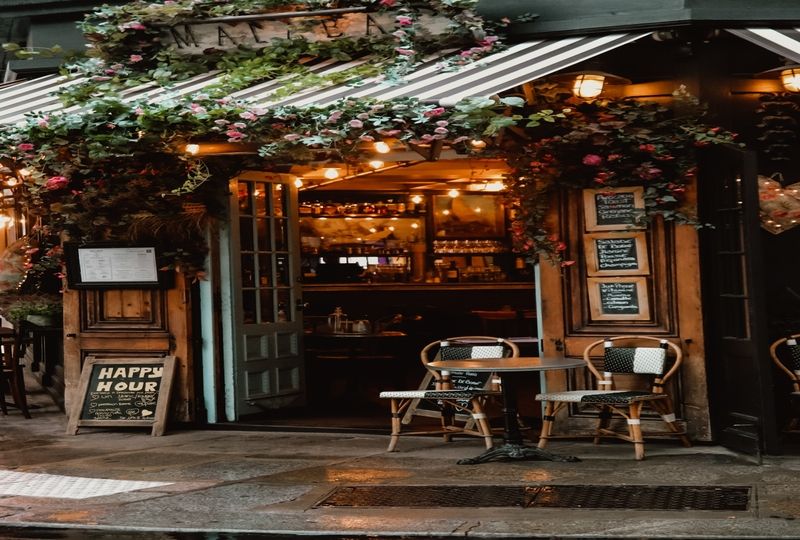
Food And Ordering In Restaurant In France
Home to one of the most popular cuisines, France will surely make your mouth water with its myriad choice of cheese and pastries, not to forget its unique dishes! However, most menus are not offered in the English language, so a few basic culinary vocabulary will make your dining experience more fun. Moreover, you can also learn french by following french recipes yourself!
Le menu, s’il vous plaît : The menu, please.
Quels sont les plats du jour : What are today's specials?
Je suis allergique à ... : I'm allergic to ...
Options végétariennes : Vegetarian options
Je prendrai : I'd like
L’addition : The bill
Est-ce que le service est compris? : Is the tip included? You should remember that tipping is not a common practice in many restaurants.
C’est trop bon! : This is so good!
Le Pain : Bread
Un Fromage : Cheese
La viande : Meat
Drinks Words In French
La carte des vins, s’il vous plaît : The wine menu, please.
Un verre de vin : A glass of wine You cannot visit France and not try a wine collection!
Du thé : Tea
Un café : a coffee
Une bière : a beer
Du jus de fruit : Some fruit juice
De l’eau : Some water
Boisson pétillante : Fizzy drink

Money Terms In French
If you are travelling to France, you are bound to use some euros to enjoy your stay. What better way to start understanding money terms in french than now!
Billet d'argent : Notes
La monnaie : Coins
Combien ça coûte? : How much does this cost?
Je voudrais payer en liquide : I would like to pay in cash.
Acceptez-vous les cartes? : Do you accept cards? It is important that you inquire before paying as many small restaurants do not accept cards. It is also a wiser option to carry cash with you.
Je vous dois combien? : How much do I owe you?
C'est trop cher : It is too expensive
La banque : The bank
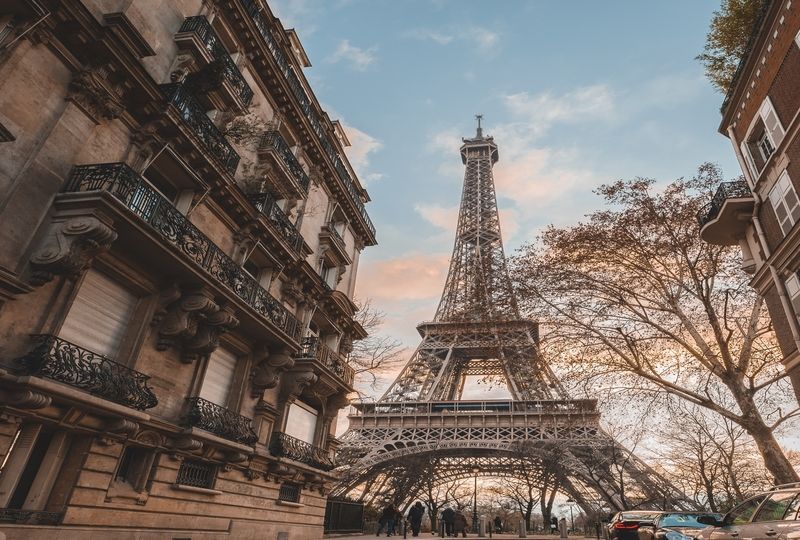
Best Places You Need To Visit In France
A vacation to France will keep you busy with all the wonderful activities available.
Since you made it this far, we added 5 more beautiful places to visit in France along with their gorgeous names.
La tour Eiffel : The Eiffel tower One of the must-see locations in France is surely the Eiffel Tower , a real and amazing structural masterpiece. You can mount the Tower and look down on beautiful Paris.
Bordeaux : Bordeaux If you are a wine enthusiast, you may tour the winery in Bordeaux , which is also a city full of history and art.
Le Musée du Louvre : Louvre museum The Louvre, which houses the Mona Lisa, has some of the most renowned works of art in contemporary history.
La Cathédrale Notre-Dame de Paris : Notre-Dame de Paris cathedral Notre Dame Cathedral is a Gothic architectural marvel and one of the most amazing tourist sites you should see.
La plage de Saint-Tropez : Saint-Tropez beach You may also choose between the captivating beaches of Saint-Tropez and the ski resorts of Chamonix , or you can simply do both.
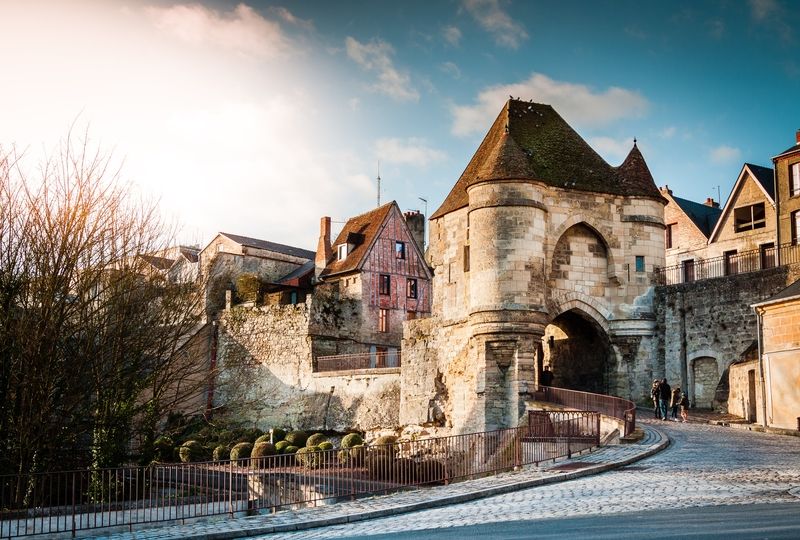
Now, Up To You To Practice You French!
Now that you have an idea of what le français consists of, it is time for you to practice saying these words. You can also improve your french with the tools that Speechling provides.
Remember as many as you can to make the most of your next trip to France!
Speechling is a nonprofit app and website that combines human coaching with technology to improve your foreign language speaking.

French Travel Phrases: Your Survival Kit for Smooth Trips

If you’re reading this, you already know why you want to travel to France, be it the beauty and diversity of its landscapes, the appeal of its cuisine, or its wealth of history. But you may find yourself in need of helpful French travel phrases, and fast!
As a travel destination, France is notorious for a reason and it will delight the casual beach-goers and culture vultures alike. But to be fair, it’s not the cheapest travel destination and the language barrier can be challenging. Even though the number of English speakers has been rising rapidly over recent years, we’re still lagging behind most of our European neighbors. Even in the most touristic spots, you might bump into a waiter, a taxi driver, or a ticket seller who doesn’t speak anything but French.
This is where our French travel phrases will come in handy!
In this guide, you’ll find everything you need to travel around France, from the basic daily words to specific topics such as transportation, restaurants, hotels, and much more. You’ll also find more French travel tips to help you find your way around your new favorite country with these key French travel phrases!
Without further ado, let’s move on to our list of French travel phrases.
Table of Contents
- Survival Basics: Simple French Travel Phrases
- Lost in Translation
- Moving Around
- Hotel / Hostel
- Restaurants
- Asking for Directions
- Emergencies
- How FrenchPod101 Can Help You Learn More French Vocabulary

Arras, in the “Hauts-de-France” region.
1. Survival Basics: Simple French Travel Phrases
In this chapter, I gathered a list of basic French travel phrases and words that can prove useful in most encounters in France. These French phrases for travel are just what you need to get started on your journey here. Later on, we’ll examine more specific scenarios and make sure you’re well-equipped for anything that could come your way! You’ll certainly be glad to know this survival French for travelers!
1- Being Polite
As I’ve mentioned in other articles, France invented the word “ étiquette ” and is still a place where courtesy matters…a lot. I’m not saying all French behave like white knights of exquisite politeness, but knowing how to greet and thank your French hosts and friends will take you a long way, while doing so in their language makes you instantly more likable.
These are just the ten most useful phrases. To read more on this topic or to practice some of these French travel phrases with pronunciation, please have a look at the following resources on FrenchPod101 :
- How to Say Hello in French
- Vocabulary List: Common Ways to Say Hello
- How to Introduce Yourself
- Vocabulary List: 10 Lines to Introduce Yourself
2- General Toolkit
Now that you’ve shown your good manners, let’s look at a few more essential French phrases for travellers. Here are some common words and expressions to gracefully make your way through France.
This is a small sample of the most common general phrases. You can find out more on our List of 24 Key Phrases with audio recordings, on FrenchPod101 .
2. Lost in Translation
Even if you’re well-prepared and almost fluent, there will be times when your interlocutor doesn’t make sense to you, and you’ll have to make them repeat. Heck, even as a native speaker, I’m helpless with the thickest cases of southern French accents! So just know that even knowing the best French travel phrases won’t always save you from the awkwardness of asking someone to repeat what they said.
It’s perfectly fine to ask someone to talk slower, repeat themselves, or rephrase what they were saying. Most French people will be happy to see you putting in the effort and will help you understand.

Je ne comprends pas ( “I don’t understand” )
3. Shopping
From the sparkling fancy boutiques of the Champs-Elysées to the dusty antiques of a typical Brocante (“Garage sale”), from the sprawling suburban malls to the modest Bouquinistes ( “Book sellers” ) along the Seine river, France caters for all tastes and budgets.
French shopping is usually a painless experience: Prices are displayed almost everywhere and credit cards are widely accepted, even in small bakeries or convenience stores. We don’t do five hours of siesta in the middle of the day, and unless you’re strolling around the Eiffel Tower in the crowd of souvenir sellers who won’t let you leave without a dozen dust collectors, shop owners aren’t likely to jump on you.
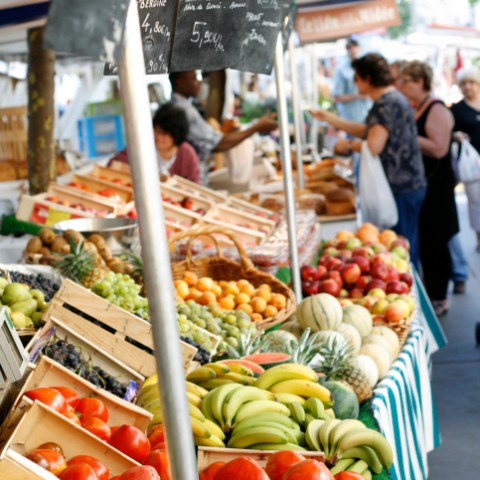
Le marché ( “The market” )
For more shopping words, check out our free Shopping vocabulary list .
While shopping in France, you’ll also need to know how to handle prices or quantities. Make sure to read my previous article about French Numbers: From 0 to Infinity, and Beyond and the complementary vocabulary list .
4. Moving Around
No list of basic French phrases for tourists would be complete without information on talking about your ride. Whether you travel by bus, train, taxi, or plane, you need to be able to ask your way around, inquire about the timetables and details of the trip, navigate until you board the correct ride, and figure out when to get off.
Here are the most popular ways to move around France:
- Le train ( “Train” ) This is the fastest, most comfortable, and usually most scenic way to travel from one city to another. However, compared to buses, it can be pretty expensive, especially when booked at the last minute . Although locals will often complain of the trains being late or canceled, our national network is actually pretty strong and reliable compared to those of some of our close neighbors.
- Le bus intercité ( “Intercity bus” ) Bus travel has been developing rapidly in recent years and offers cheap prices to compete with the train and car sharing services. For instance, you can book an overnight trip from Paris to Nice for 28€ while a train on the same date would be around 60€.
- Moving around the city with Les transports en commun (“The public transport”): Bus , Métro , or Tram ( “Bus,metro, or Tramway” ) The subterranean metro or Trams are only available in big cities, but you can always move around with a local bus. Without the monthly or annual card, individual trips can be purchased for around 2€ in the metro or tram station, or directly on the bus.
- Le taxi ( “Taxi” ) is the expensive alternative to public transportation that you only want to take when you’re going to the airport in the middle of the night or going back home dead drunk after an intense night out.
- Questionable business practices aside, Uber is a much cheaper and more convenient substitute to taxis, and it’s well-developed in France.
- L’avion ( “Plane” ) Keeping in mind the dire environmental cost, traveling by plane is by far the fastest way to cover long distances and the prices of the Billets d’avion ( “Plane tickets” ) have continued to drop steadily over the years. Prices are especially low if you can book around a month in advance.
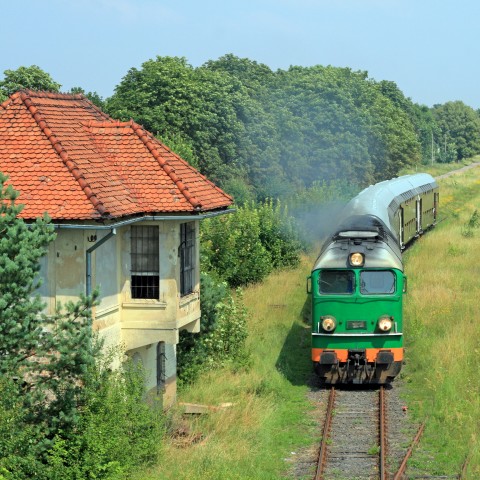
Le train ( “The train” )
Now, where do you want to go?
Then, using your brand new words, find your way there:
Now, you have to ask the right questions before buying your tickets:
Personally, I don’t see why anyone would go to Dunkerque, but I’ll let you be the judge of that (or rather don’t!).
And finally, you’ll just have to figure out where your ride is leaving from and when you should get off:
To learn more vocabulary about transportation, please check out our lists of vocabulary for Airplanes , Bus or Train Stations , and Crossing Borders .
5. Hotel / Hostel

As the most visited country in the world (nothing wrong with a bit of bragging!), France has no shortage of accommodation of all shapes, sizes, and prices. You’re not likely to run out of options when looking for a place to spend the night. But you may still want a couple of French travel tips and phrases regarding your stay.
Prices vary greatly depending on the season and proximity to the tourist attractions, but considering the quality of the transport network all over the country, it’s usually fine to sleep outside of the city center.
While the Gîtes ruraux (“Rural houses” used as vacation rentals) and Chambres d’hôte ( “Bed & Breakfast” ) are popular choices among locals for their summer vacations, the most common options are still L’hôtel ( “The hotel” ) and its budget version, L’auberge de jeunesse (“The hostel” or “Youth hostel”).
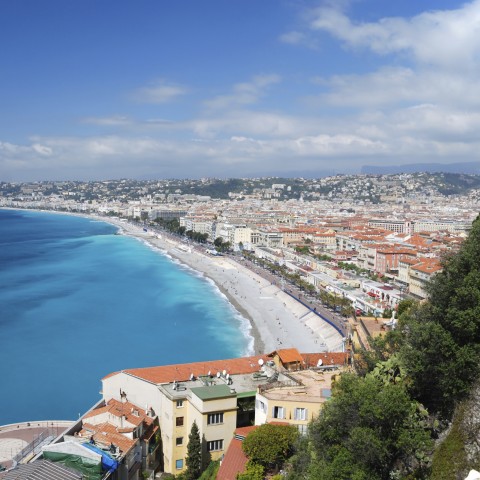
Nice, on the Mediterranean coast.
Most visitors in France will book their room through the usual Booking.com or HostelWorld , but there are times when you just want to stroll around and find the perfect place all by yourself. Here’s how to ask for a room in French:
Next step: you probably have some questions about the room.
6. Restaurants

You’ve found a nice room with a convenient location in this cute family-run hostel. You’ve dropped your bags and are now ready for more adventures. But wait, what’s that sound? Is that the infamous Beast of Gevaudan or your growling stomach?
If there’s one thing France is acclaimed for, it has to be the food! Good food is at the heart of our friends, family, and even business meetings; alongside wine, it stands as the cornerstone of our philosophy of Art de vivre (“The Art of Living”).
Some people imagine French meals as fancy and snobbish, but this is mostly untrue. From the biggest cities to the tiniest towns, you can always find a good Brasserie ( Literally “Brewery” ) to serve you a generous portion of typical and unpretentious food such as Cassoulet (A mixture of white beans and sausage simmered in goose fat), Steak au poivre (“Pepper steak”), or Tartare de boeuf (“Beef tartare”), served with a glass of Beaujolais .
Many restaurants have the menu displayed outside, which is really convenient if you want to quietly check your options before entering. When they don’t, you can simply ask for it before sitting; if you don’t like what you see, just give it back, thank them politely, and leave.
Otherwise, if you like what they offer, go ahead! Most restaurants will take you to a table, while simple Brasseries , Pubs, or fast food places will let you seat yourself.

1- How to Order Drinks
Before you order the food, the first question you’ll usually hear is:
- Voulez-vous boire quelque chose ? ( “Do you want something to drink?” )
- Voulez-vous commander quelque chose à boire ? ( “Would you like to order a drink?” )
It’s worth noting that when you order a meal, water is always free in France (we have a law explicitly stating it). I’m talking simple tap water in a pitcher, and not sophisticated bottled sparkling water, but this is an amazing feature of French restaurants, especially if you’re on a budget! And you can get refills.
To ask for your free water, don’t just ask for water; sneaky waiters could take your order as mineral water and charge you for it. Instead, use this phrase:
The important word here is Carafe (“Jug”), as it differentiates this from a paid order of mineral water. Also, don’t worry: water is properly filtered all over the country and it’s always fine to drink from the tap.
Oh, and you know what else is always free? Delicious French bread!
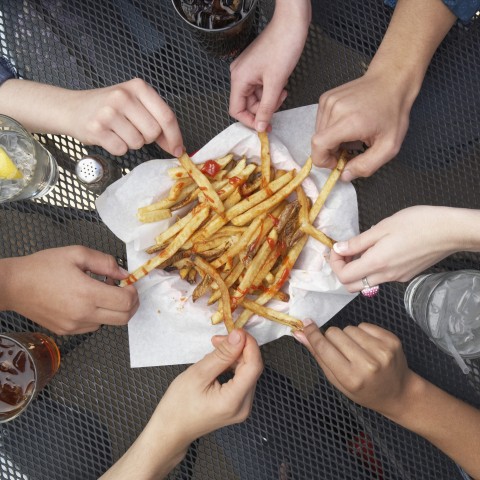
Did you know that French Fries are not French?
2- How to Order Food
Alright, now, let’s get some food on this table!
If you have any specific diet or allergy, it’s probably best to start with this:
And here’s how to order something from the menu:
Your stomach has stopped growling, your belly’s full of French delicacies, and your mind is at peace. It’s time to thank the chef and ask for the bill:
You can find more vocabulary and practice your pronunciation with our vocabulary list on Restaurants and key phrases for restaurants .
7. Asking for Directions
As Mandy Hale says, “Sometimes when you lose your way, you find yourself.” But sometimes, you just get severely frustrated and waste your day trying to reach this freaking museum your GPS keeps making you circle around.
One way or another, you’ll always end up relying on the help of locals to reach well-concealed destinations. Let’s start with the most common questions:

Je suis perdu. ( “I am lost.” )
As I often noticed while traveling, asking for directions is always the easy part, but making anything of the other person’s answer can prove much more challenging. Here are some examples of the answers you could receive:
To understand these kinds of instructions, it all comes down to knowing the right keywords, such as Droite (“Right”), Gauche (“Left”), En face (“In front”), Tout droit (“Straight”), and a few others.
Check out our lists of vocabulary for Position Words and Direction Words on FrenchPod101 to learn more about this.
And here’s more vocabulary and recordings about Key Places in Town , as well as the French Tourist Attractions .
8. Emergencies
In case of an emergency, you don’t want the language to get in the way of you and the help you need. Let’s have a look at the main emergency words (which may just be the most important French travel phrases when you need them) and how to use them.
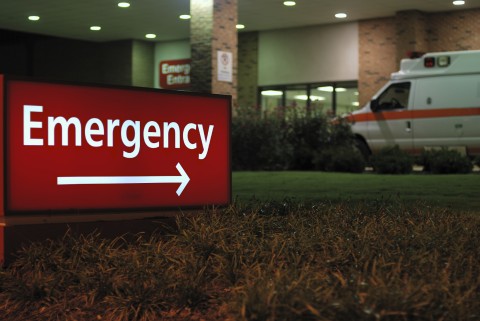
C’est une urgence ! ( “It’s an emergency!” )
For more words on this topic, make sure to visit our free list of vocabulary about The Words and Phrases to Help You if You are in an Emergency .
If you’re in need of medical assistance, you’ll be glad to know about the Common Health Problems and some basic vocabulary about Medicine .
9. How FrenchPod101 Can Help You Learn More French Vocabulary
French travel phrases in language learning are so important, and in this guide, you’ve learned a LOT of French travel phrases. I hope it wasn’t too overwhelming! Using these travel phrases to learn French will surely benefit you, but you don’t have to remember them all, as long as you keep these phrases accessible in a notebook or on your phone.
Did I forget any important words or expressions? Are you ready to get out there and ask locals about your travel needs?
Make sure to explore FrenchPod101 , as it has plenty of free resources for you to practice your grammar and learn new words. The vocabulary lists are also a great way to revise and listen to the words. And you’re in luck, because we have tons of lists about traveling:
- Top 30 Travel Phrases
- Most Useful Verbs for Traveling
- Travel and Traveling general lists
- Vocabulary for Nationalities
- Summer Vacation Phrases
- Words for the Beach
- Winter and Snow Vocabulary
Remember that you can also use our premium service, MyTeacher , to get personal one-on-one coaching. Practice creating French travel phrases with your private teacher so they can give you personalized feedback and advice, or record them for you, so you learn the correct pronunciation.
About the Author: Born and bred in the rainy north of France, Cyril Danon has been bouncing off various jobs before he left everything behind to wander around the wonders of the World. Now, after quenching his wanderlust for the last few years, he’s eager to share his passion for languages.
Or sign up using Facebook
Got an account? Sign in here

How To Say ‘Thank you’ in French

How to Say “Hello” in French: Break the Ice Like a Pro!

How to Say I Love You in French – Romantic Word List

The French National Anthem: La Marseillaise

60 Classroom Phrases for Studying or Teaching in France

The Only Guide to French Restaurant Phrases You’ll Ever Need
How to celebrate april fools’ day in french.
- Forum Spotlight
- French Bazaar!!
- French Holidays
- French Language
- French Translation
- Scheduled Maintenance
- Guest Bloggers
- Advanced French
- French Grammar
- French Phrases
- French Podcasts
- French Words
- Tips & Techniques
- Media Coverage
- Feature Spotlight
- Success Stories
- Teaching French
- Team FrenchPod101
- Twitter Lessons
- Uncategorized
- Word of the Day
- Immigration, Visas
Copyright © 2024 Innovative Language Learning. All rights reserved. FrenchPod101.com Privacy Policy | Terms of Use . This site is protected by reCAPTCHA and the Google Privacy Policy and Terms of Service apply.
The Top 50 Common French Phrases for Travelers and Tourists
Whether you're planning a trip to france or any other french-speaking country, learning a few key phrases can greatly enhance your travel experience., introduction.
French is a widely spoken language that is popular among travelers and tourists. Whether you're planning a trip to France or any other French-speaking country, learning a few key phrases can greatly enhance your travel experience. This article presents the top 50 common French phrases that every traveler should know. These phrases will help you navigate various situations, interact with locals, and make the most of your trip.
Essential Greetings and Polite Expressions
- "Bonjour" - Hello
- "Merci" - Thank you
- "S'il vous plaît" - Please
- "Excusez-moi" - Excuse me
- "Pardon" - Pardon me
- "Au revoir" - Goodbye
- "Oui" - Yes
- "Je m'appelle [Your Name]" - My name is [Your Name]
- "Comment ça va?" - How are you?
Basic Conversational Phrases
- "Parlez-vous anglais?" - Do you speak English?
- "Je ne comprends pas" - I don't understand
- "Pouvez-vous m'aider?" - Can you help me?
- "Je cherche [a hotel]" - I'm looking for [a hotel]
- "Combien ça coûte?" - How much does it cost?
- "Je voudrais [a coffee]" - I would like [a coffee]
- "Où est [the bathroom]?" - Where is [the bathroom]?
- "Qu'est-ce que c'est?" - What is it?
- "Je suis perdu(e)" - I am lost
- "Est-ce que vous acceptez les cartes de crédit?" - Do you accept credit cards?
Transportation and Directions
- "Où est la gare?" - Where is the train station?
- "Je voudrais un billet pour [Paris]" - I would like a ticket to [Paris]
- "Je voudrais un billet aller-retour - I would like a round-trip ticket
- "À quelle heure part le prochain train?" - What time does the next train depart?
- "Est-ce que ce bus va à [l'aéroport]?" - Does this bus go to [the airport]?
- "Combien de temps cela prend-il pour aller à [la plage]?" - How long does it take to get to [the beach]?
- "Excusez-moi, je cherche [la rue Saint-Michel]" - Excuse me, I'm looking for [Saint-Michel Street]
- "Est-ce que vous pouvez m'indiquer le chemin?" - Can you give me directions?
- "Je suis en retard. Pouvez-vous appeler un taxi?" - I'm running late. Can you call a taxi?
- "Est-ce que je peux utiliser mon téléphone ici?" - Can I use my phone here?
- "À quelle heure ferme le métro?" - What time does the metro close?
- "Pouvez-vous me déposer à l'hôtel?" - Can you drop me off at the hotel?
Food and Dining
- "Une table pour [deux personnes], s'il vous plaît" - A table for [two people], please
- "Je voudrais voir le menu, s'il vous plaît" - I would like to see the menu, please
- "Qu'est-ce que vous recommandez?" - What do you recommend?
- "Je suis végétarien(ne)" - I am a vegetarian
- "L'addition, s'il vous plaît" - The bill, please
- "Je voudrais réserver une table pour ce soir" - I would like to book a table for tonight
- "Est-ce que le service est inclus?" - Is the service charge included?
- "Je voudrais essayer [le plat traditionnel]" - I would like to try [the traditional dish]
- "Avez-vous des plats sans gluten?" - Do you have any gluten-free options?
- "Quelle est la spécialité de la région?" - What is the regional specialty?
Learning a few common French phrases can go a long way in enhancing your travel experience. With these top 50 phrases at your disposal, you'll be able to navigate through various situations, communicate with locals, and immerse yourself in the local culture. Remember to practice these phrases and embrace the opportunity to engage with native speakers during your travels. Bon voyage!
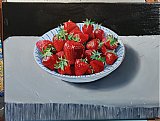
Discover a better way to learn French.
Regular conversation practice is the key to fluency. There's no better way to build confidence, develop comprehension skills and an authentic accent. Our classes are fun, effective and guaranteed to get you talking.
Find your French teacher and start for free today. We've helped thousands of students learn a new language and we can help you too.

Ayami Hamakawa
Radu Titirca

David Askill
John Barton

Sharyn Doherty
Daniel Moore
Get Started Today Bring Learning French to Life
Native teachers, great pricing, ultimate flexibility.
Sign up and take a free trial lesson with no obligation. No credit card required.
FRENCH TOPICS
Success stories, skype lessons, zoom lessons, conversation, site language, learning french.
Get a free trial lesson with a native speaking online French tutor today.
50+ Basic French Travel Phrases To Use While Abroad
- , November 17, 2022

Bienvenue en France! While traveling through this beautiful country, knowing basic French travel phrases is essential to help you get around. Many French people do not speak English, so it’s actually quite necessary to know a bit of French to help make your travels as smooth as possible.
It can be frustrating to travel to a place that does not speak your native language. Still, one part of exploring new places is navigating these difficulties. If you prepare yourself beforehand by learning a few French phrases, you can turn these frustrations into meaningful interactions with local people.
Whether you need to order food from a restaurant, tell your cab driver where you’re headed, or ask French locals general questions, these 30+ travel phrases will help you navigate easily and cement memories to last a lifetime.
Essential French Phrases For Travelers

Basic French Phrases For Conversations
These basic words and phrases are the first level of interactions while traveling and probably the words you will use the most in everyday conversations. So pay special attention to them!
These basic words and phrases are the first level of interactions while traveling, and probably the words you will use the most in everyday conversations. So pay special attention to them!
Basic French Phrases For Directions
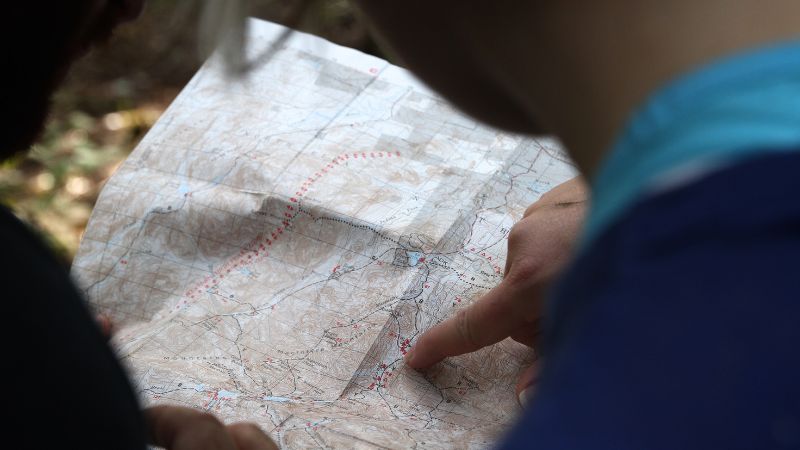
Are you lost in a big city with no phone service? Whip out these basic phrases for directions to get someone to point you in the right direction and save yourself a headache.
Basic French Phrases For Money & Shopping

France is known for its opulent, high-end clothes and style. You’ll definitely be tempted to shop in all the beautiful boutiques, so learn basic phrases for money and shopping. Want to learn more about this topic? Check out Shopping Vocabulary In French: 20+ Useful Phrases & Expressions .
Basic French Phrases For Transportation

France has an excellent public transport system, so you’ll most likely be taking trains and buses while traveling through. These are some phrases to help you get by.
Basic French Phrases For Instruction

These French phrases will help you find the bathroom, the nearest grocery store, or wherever else you need to go. These are easy to pop out while walking or sightseeing, so keep them in mind!
Basic French Phrases For Dining
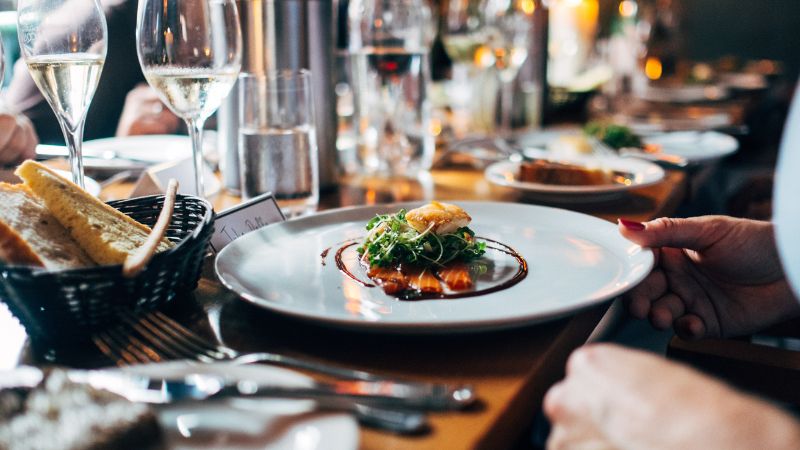
Food is a huge part of French culture, so when you’re fine dining, you’ll definitely want to know some basic phrases to fit in and avoid any awkward situations.
Final Thoughts

Whew! I know that is a lot of information, but take it one category at a time to learn these basic French words and phrases for travelers. Trust me, when you’re in France you’ll want to speak French! Not only is it a beautiful language, but French speakers find it extra respectful when you speak French to them.
Interested in learning more French but need specific, targeted resources? Download the Ling App ! It is a user-friendly language-learning app with games, quizzes, and interactive features proven to help you learn a new language.
You can download it for free on the App Store and Play Store . What are you waiting for? If you start today, you’re one step closer to being prepared for your traverse through France.
Want even more resources? Check out #1 Best Guide: French Vocabulary To Use At The Airport & French .
Leave a Reply Cancel reply
You must be logged in to post a comment.
Discover more

People also read

9 Public Holidays In Latvia: An Exclusive Guide

An Easy Ways To Wish Happy New Year In Latvian For 2022

Religion In Latvia – #1 Best Guide

#1 Comprehensive List Of Latvian Prepositions From A to Z

The Latvian Government – Exclusive #1 Guide

#1 Easy Guide To Conjunctions In Latvian
Southeast asia, east europe.
© 2024 Simya Solutions Ltd.
20 Essential French Phrases For Travel
- Everything About
- The alphabet
- Funny phrases
- Common words
- Untranslateable Words
- Reading Hacks
- Writing Tips
- Pronunciation
- Telling time
- Learn FASTER
- More resources
By OptiLingo • 9 minute read
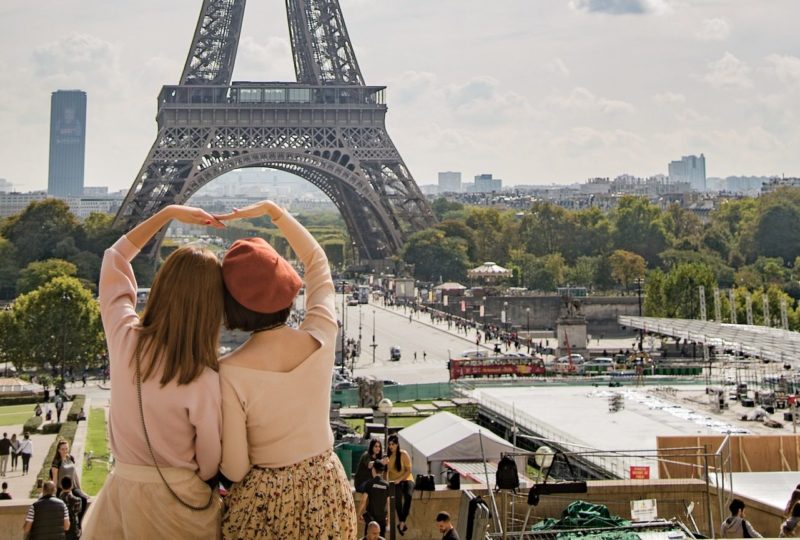
Learn Common French Phrases
Whether you’re saving up money for your next vacation, reading a travel blog , or you’re about to embark on your next business trip, you should know some basic French phrases before you get there. They’ll help you navigate easily, and you’ll receive better customer service and avoid some embarrassing mistakes . Not to mention how much French locals will appreciate your efforts. Here are some basic but useful French phrases and expressions that you can use while interacting with French locals.
20 Essential Phrases in French
There are so many reasons to learn French . But, travel is perhaps the greatest motivation you can find. Whether you’re out enjoying the nightlife of Paris, or you’re joining a sightseeing tour, it’s always worth expanding your French vocabulary. As you’re walking around in France, you’ll surely hear these common French expressions:
1. Bonjour – “Hello”
You can use bonjour in both an informal and formal setting. While there are many ways of saying hello in French, this is the widely used phrase. At night or evening, when having a drink with friends or acquaintances, you can replace bonjour with bonsoir. If you’re keen, there are a lot more useful French greeting you could use to sound like a local in France.
2. Au revoir – “Goodbye”
Whenever you part from your French friend or leave a shop, make sure you say goodbye. It’s very polite to do so.
3. S’il vous plaît / s’il te plaît – “Please”
Saying “please” is very important in French etiquette. When requesting something, remember the basics and start with, “S’il vous plaît or s’il te plaît ” to mean, please.
If you are saying please in a formal setting or addressing an older person or a stranger, you should use, “S’il vous plaît. ”
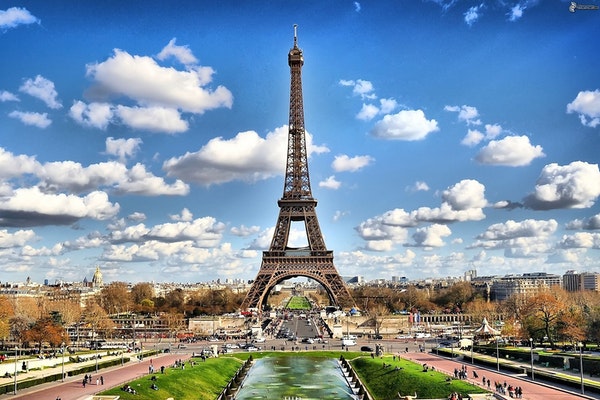
4. Merci (beaucoup) – “Thank you (very much)”
You’ll hear this a lot in France. French people are very polite, so it’s important that you learn this French phrase.
5. Comment t’appelles-tu? / Comment vous appelez-vous? – “What’s your name?”
The first thing that you will want to know when meeting someone is his or her name. If you are in a formal setting, you can ask, “Comment vous appelez-vous?” but if your setting is informal or you can ask, “Comment t’appelles-tu?”
On the other and, if someone asks your name, you should say, “Je m’appelle” meaning “my name is.” A simpler version is “Je suis” translated to “I am”
6. Comment allez-vous? – “How are you?
This is a polite way of asking a person how they are in French. While walking in France, you may hear the phrase “ça va?” being frequently used. It is used when you do not need to be formal, but you still need to find out how a person is.
If you are on the receiving end, you should respond to “ça va?” with “ça va bien, ” which means ” I am well.”

Psst! Did you know we have a language learning app?
- It teaches you useful words and phrases.
- Presented in a natural, everyday context.
- Spaced out over time, so you absorb your new language organically.
- It’s kind of like learning the words to your new favorite song!
You’re only one click away!
7. Oui/Non/Si – “Yes/No”
When learning any language, you must learn to say yes and no. Yes is “oui,” while no is “non.” Saying ouaip or ouais is typical in an informal setting. It substitutes oui and means “yep” or “yeah.”
Si is a useful word that you should use when saying yes. Use it to respond to a person who has asked you a question that is negatively phrased. For example, if someone asks, “haven’t you eaten pizza?” If your answer is yes, it will not be clear whether you ate pizza or not. French tries to avoid this scenario with the word si. Using the example above, if you answer with si, it will mean that you have eaten pizza.
8. Excusez-moi – “Excuse me”
This phrase is necessary when you want to get a person’s attention. It can be a stranger, a colleague, or even a waiter.

9. Je voudrais parler français – “I would like to speak French”
The French love their language and they’re very protective of it. Sometimes they can reply to your questions in English if you speak imperfect French. It can be a bit frustrating, but if it happens to you, politely but firmly tell the person “Je voudrais parler français.” The only way you will make progress when learning French is if you continuously practice speaking it.
10. Je ne comprends pas – “I don’t understand.”
If you do not understand what the other person is trying to tell you, say, “Je ne comprends pas.” Do not be ashamed of being a beginner. However, do not ask them to translate to English because if they do that, you may never learn. Persevere and try to grasp as much as you can.
11. Pardon – “Sorry”
If you bump into someone when walking, do not be embarrassed about it. Just say pardon, and the person will forgive you.
You can also use pardon when something is not clear, and you want an individual to repeat a statement because you did not understand or hear them. If this is the case, you should say the word with a high-pitched tone to show that it is a question.
You can also use “pourriez-vous répéter, s’il vous plaît?” which means, “could you repeat that, please?”
12. Comment dit-on __ en français? – “How do you say __ in French?”
If a word that you wanted to say in French escapes you, you can ask a person how it is said in French by filling the bank in the sentence above.
13. Comment ça s’écrit? – “How do you spell that?”
Use the phrase above if you want to know the spelling of a French word that you have just learned. Spelling in French is not an easy task because there is a complicated relationship between the pronunciation and spelling of a word. It is easier to know the pronunciation of a word when you spell it, rather than figuring out it’s spelling when you pronounce it.
14. C’est combien? – “How much is it?”
France is not a cheap country. If you are on tour, you wouldn’t want to spend much more than you had budgeted for because you do not know the prices.
You can ask the price of something by saying, “C’est combien?” Alternatively, you can use “Combien ça coûte?”
15. Où sont les toilettes? – “Where are the toilets?”
It would be best if you learned this phrase because you may urgently need it. However, note that public toilets are a bit rare in France, so you might have to search for them for a while. If you find one, you may have to pay before using it.
16. À quelle heure est-ce qu’il faut régler la note? – “What time is check out?”
If you visit any country that speaks French, and check into a hotel, you must inquire about the checkout time. Find out the checking out time by asking, “à quelle heure est-ce qu’il faut régler la note?”
17. La carte/le menu, s’il vous plaît. – “The menu, please.”
You have probably been dreaming of going to France because of its famous wine and food. When wining and dining in France, remember that you can ask for the “menu” in two ways.
A carte is your typical “menu.” It lists the various food options and their prices, so you can select what you want and sum the costs up to get your bill.
A “fixed-price menu” is also available in France and is known as a menu. When ordering from it, you are at liberty of choosing an option for each course and paying a fixed price irrespective of your selection.
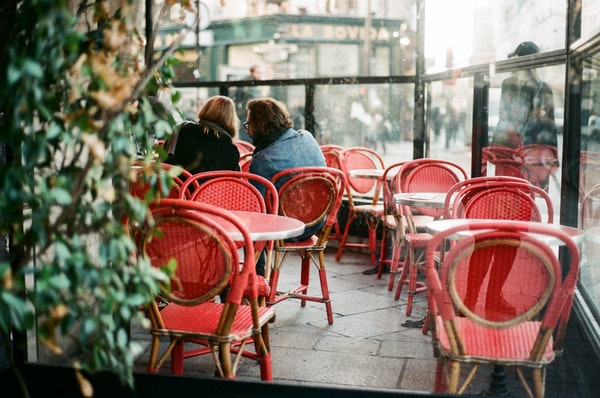
18. Nous voudrions commander maintenant. – “We would like to place an order now.”
When you want to order something in a hotel or restaurant, you can use the word commander. It would be best if you did not confuse it with ordonner that is usually used when you are ordering a person to do something, for example, in the military.
After receiving the menu or carte, the waiter will give you time to decide. When you are ready to order, you can tell him or her “nous voudrions commander maintenant.”
19. Où est ____? – “Where is ____?”
If you ever find yourself lost, you can ask for directions from French locals. While understanding the response is a different problem in itself, remember, spoken language isn’t the only form of communication. Hand signals and pointing at maps can be just as helpful.
12. Je t’aime – “I love you.”
I love you had to make it on the list. We have all heard that French is very romantic. Who knows? You might find love while traveling and use this phrase.
I love you in French is “Je t’aime”.
There are many other basic French phrases, but these should get you started to ensure that you are having an easy time during your adventure or that business trip.
How to Pronounce Common French Phrases and Expressions
This video is a great learning resource for these essential French phrases. Listen to the video and learn how to pronounce these useful expressions:
How to Learn These French Phrases
Luckily, learning these essential French phrases won’t take long. In fact, you can learn them in a day. With some great last-minute language learning tips , you can conquer French in record time.
- Read through the French expressions : Understanding the meaning of these French phrases is crucial to remember them. We’ve included translations and some common situations where you’d use these phrases.
- Listen to the pronunciation : At the end of this list, we included a handy video, so you know how to pronounce these essential French phrases. Listen intently, and try to recreate the sounds of French yourself.
- Say them out loud : The only way you can build your confidence is by speaking the language. You can become fluent in French quickly if you keep this in mind. Don’t be shy, give these French phrases a go. And don’t worry about your accent . As long as you’re speaking clearly, French locals will understand you.
- Review often : Spaced repetition is the key to language learning. This means, that after you’ve learned you vocabulary, you need to go back in a few days to review it. This way, you will commit your lesson to your long-term memory effectively.
Learn French in Record Time
You can reach French fluency faster than you think. But, you need the right resources. You need a language learning method that gets you speaking, not typing the language. And that’s OptiLingo.
With OptiLingo, you can discover the most useful French words and phrases. This app only gives you vocabulary that everyday French people use. Learn how to speak like a French local with a fun and engaging method. Discover how effective learning French can be when you try OptiLingo !
Related posts

15 Tips for Learning French on Your Own

Learn How to Read French Effortlessly In 8 Steps

A Quick Guide to French Nouns
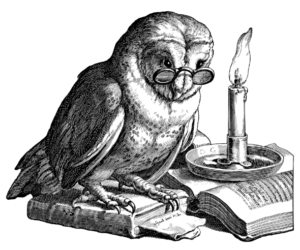
10 Famous French Sayings and Proverbs
Many people believe they aren’t capable of learning a language. we believe that if you already know one language, there’s no reason you can’t learn another..

Get my newsletter plus a FREE guide of DOs & DON'Ts for tourists!
Oui In France
50+ Basic French words and phrases for travel to France (with pronunciation)
French language · travel
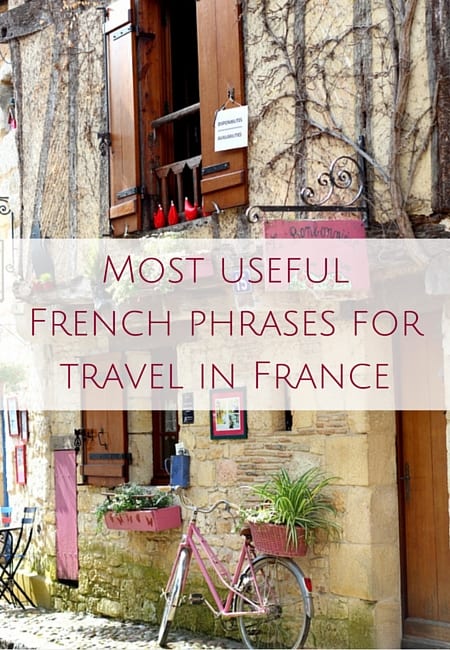
When traveling to a country where your native tongue isn’t spoken, the language barrier can be a major hurdle. Two of the most frustrating things are expressing yourself as well as not understanding what is being said to you. A relaxing, stress-free trip can get very stressful when you’re not able to communicate.
To help you out, I’ve put together some of the most common French words and phrases for travel to France — with audio, of course (thanks Tom!) because pronunciation is everything.
GO read my basic French words and phrases for travel
Basic French words and phrases with pronunciation for your France trip

Even the most talkative and friendly traveler can be silenced when one’s lexicon in the local language is nonexistent. Don’t let that be you and learn my basic French words and phrases before you go!
First, a quick primer on French etiquette. Before approaching a stranger and asking them a question, always start with a “Bonjour” at a bare minimum. Bonjour really is a magic word in France and I explain why here. It’s probably best to throw in “Excusez-moi” too.
If you’re interrupting someone who is busy working, eating or otherwise unavailable, it’s best to be extra polite and say “Bonjour, desolé de vous déranger mais…” (Hi, sorry to bother you but…) and then ask your question.
After the person has attempted to help, be sure to thank them with a “Merci, beaucoup, bonne journée!” Trust me, politeness goes a long way and these basic French words and phrases will come in handy.
Below I’ve used all formal/polite (vous) forms of phrases and questions.
Regarding my list of basic French words and phrases, this is by no means a comprehensive list and is just a starting off point. Write ’em down, learn ’em and keep ’em in your back pocket for when the perfect situation arises. Then show off your French skills like a boss. Or at least be happy someone understood you!
Click the triangle icon under all of my French phrases for travel for the audio (me saying the word in English and Tom saying the French equivalent) — because what good are travel phrases in a foreign language if you have no idea how they’re supposed to sound?
Tourists in France: Why a little bit of effort with French goes a long way >>
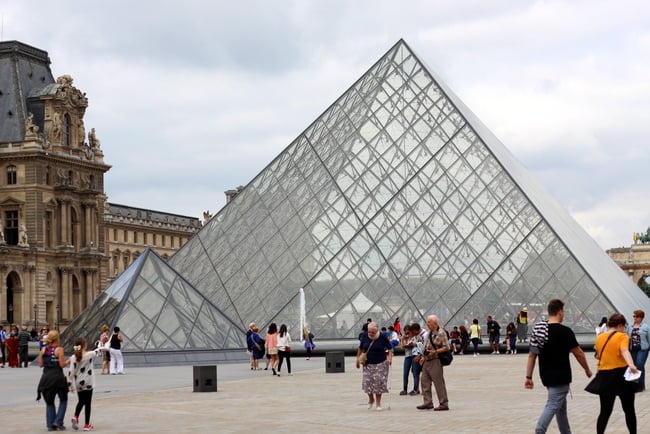
Basic French words and phrases for travel with pronunciation
Hello / Bonjour
Goodbye / Au revoir
Thank you / Merci
Sorry / Désolé(e)
You’re welcome / Je vous en prie (or De rien)
Excuse me /Excusez-moi
Do you speak English? / Parlez-vous anglais ?
I don’t speak French / Je ne parle pas français
Could you please speak more slowly? / Pourriez-vous parler plus lentement s’il vous plaît ?
Where is the restroom? / Où sont les toilettes ?
What time is it? / Quelle heure est-il ?
I’d like… / Je voudrais…
45 Things an American in France thinks when visiting for the first time >>
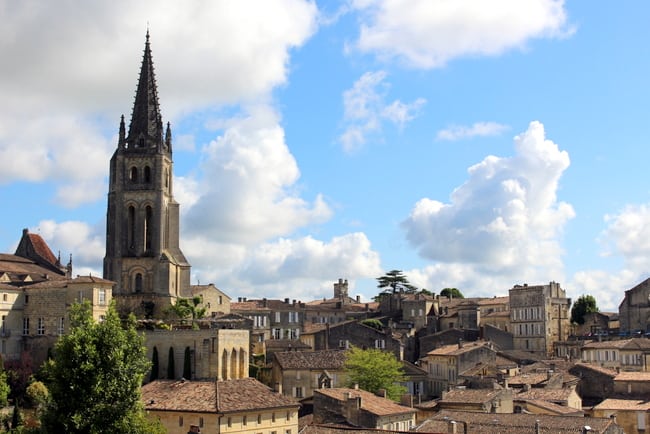
When traveling in France
Where is (gate 42)…? / Où est la porte d’embarquement 42 ?
I am on the train / Je suis dans le train
I need to change my reservation / Je dois changer ma réservation (mon billet)
We are going to be late (early) / Nous allons être en retard (en avance)
We arrive at 10 o’clock / Nous arrivons à 10 heures
What time are we arriving? / A quelle heure arrivons-nous ?
I need a taxi / J’ai besoin d’un taxi (Je dois prendre un taxi)
Where is the train station? / Où est la gare ?
Where is the airport? / Où est l’aéroport ?
To the train station (airport) please! / A la gare (l’aéroport) s’il vous plaît !
Go right / left / straight / Allez (prenez) à droite/à gauche/tout droit
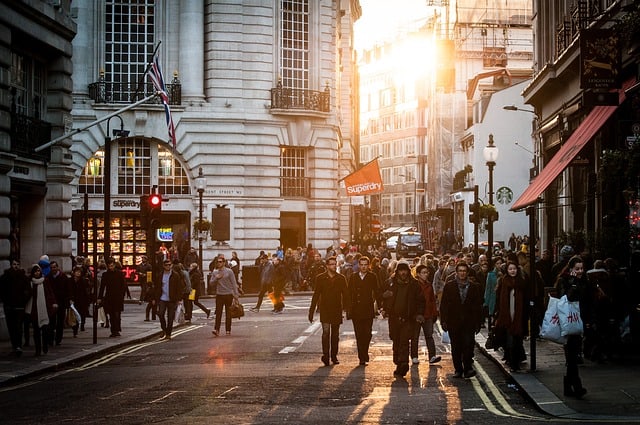
When shopping in France
How much is… ? / Combien coûte… ?
It’s too big / C’est trop gros
It’s too small / C’est trop petit
I like it / J’aime ça
I don’t like it / Je n’aime pas ça
Do you have these in size 39? / Est-ce que vous les avez en 39 ?
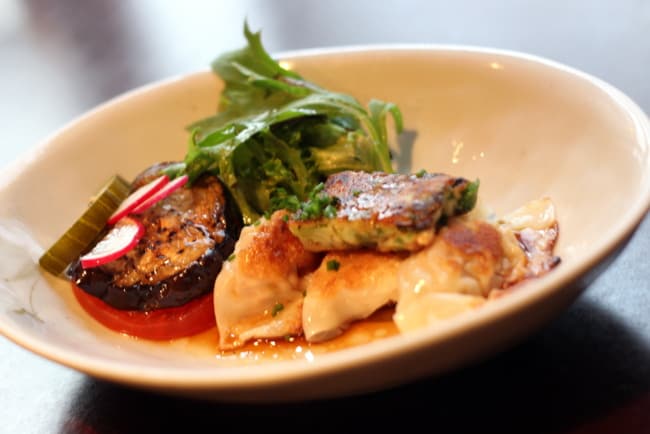
When at a restaurant in France
To go / A emporter
We’d like a table for 2 please / Une table pour deux s’il vous plait (Nous voudrions une table pour deux s’il vous plait)
Do you have a menu in English? / Avez-vous un menu en Anglais ?
I’d like another glass of wine please! / Je voudrais un autre verre de vin s’il vous plaît !
I’m allergic to dairy. Is there any in this dish? / Je suis allergique aux produits laitiers. Est-ce qu’il y en a dans ce plat ?
It was excellent! / C’était excellent (délicieux)
Check, please! / L’addition, s’il vous plait !
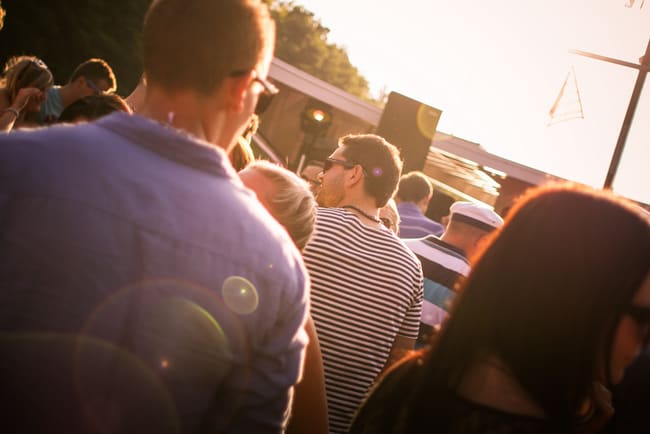
When socializing in France
Hey! (also “see ya”, when leaving) / Salut !
How are you? / Comment allez-vous ? (Comment vas-tu ? / Comment ça va ?)
What’s up? / Quoi de neuf ?
Where are you from? / D’où venez-vous ? (d’ou viens-tu ?)
I’m from the United States / Je viens des Etats-Unis
I’m American / Je suis américain(e)
Are you hungry? / Est-ce que vous avez faim ? (est-ce que tu as faim ?)
Want to grab a drink? / Vous voulez prendre un verre ? (tu veux prendre un verre ?)
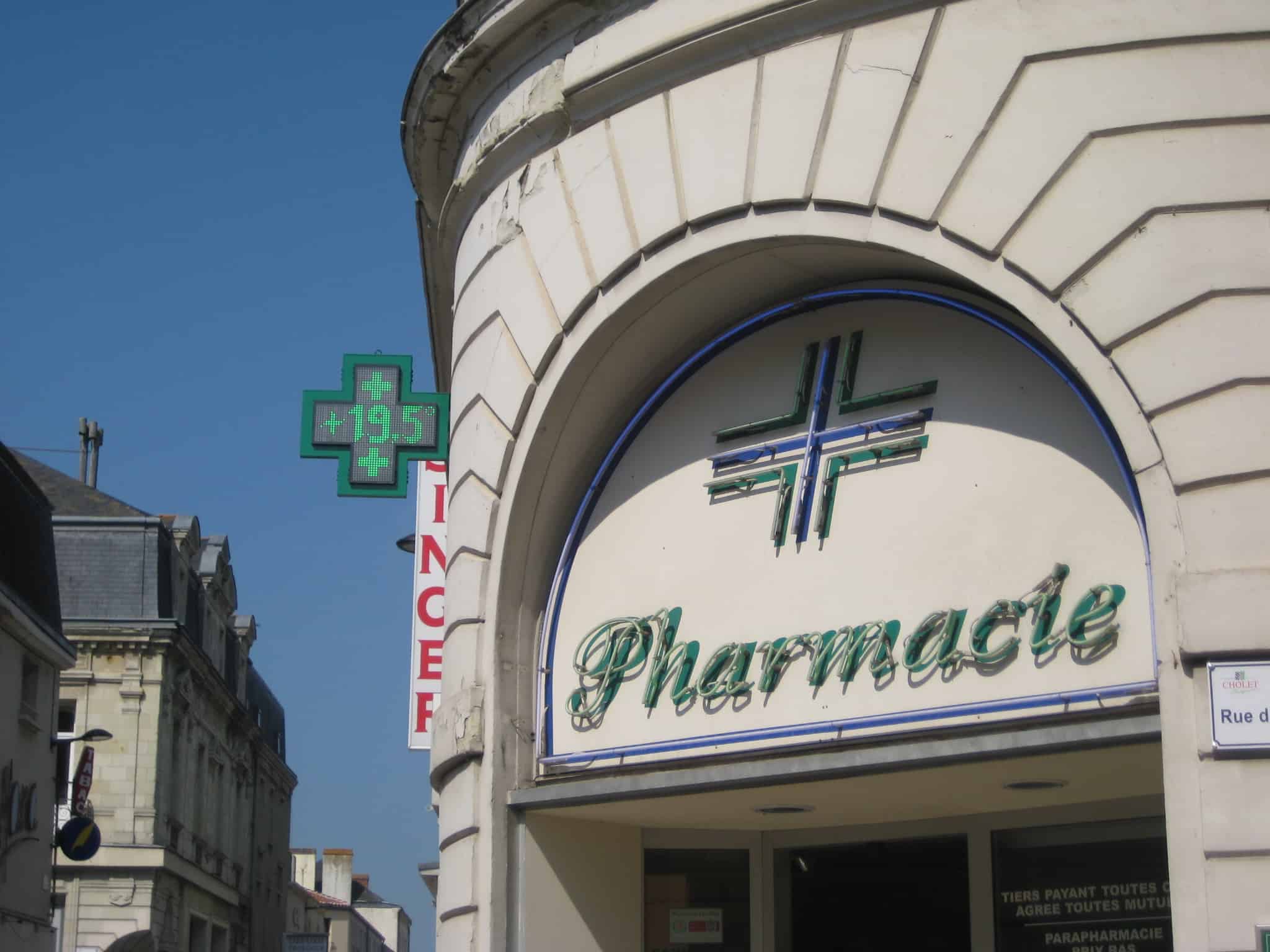
When you’re sick in France
I am sick / Je suis malade
My head hurts / J’ai mal à la tête
I’m nauseous / J’ai la nausée (j’ai mal au coeur)
I vomited / J’ai vomi
I need to see a doctor / J’ai besoin de voir un médecin (Je dois voir un médecin)
I need to go to the hospital / Je dois aller à l’hôpital
Call an ambulance! / Appelez une ambulance ! (Appelle une ambulance !)
Where is the pharmacy? / Où est la pharmacie ?
Help me please /Aidez-moi, s’il vous plait !/ Au secours!
With a little practice, your ability to bust out these basic French words and phrases will skyrocket the next time you’re speaking to a French person. So get to it! Anything you’d like to add? Talk to me in the comments about the most common French words for travel!
If you found my list of basic French words and phrases for travel helpful, would you mind sharing please?
PIN my basic French words for travel POST:
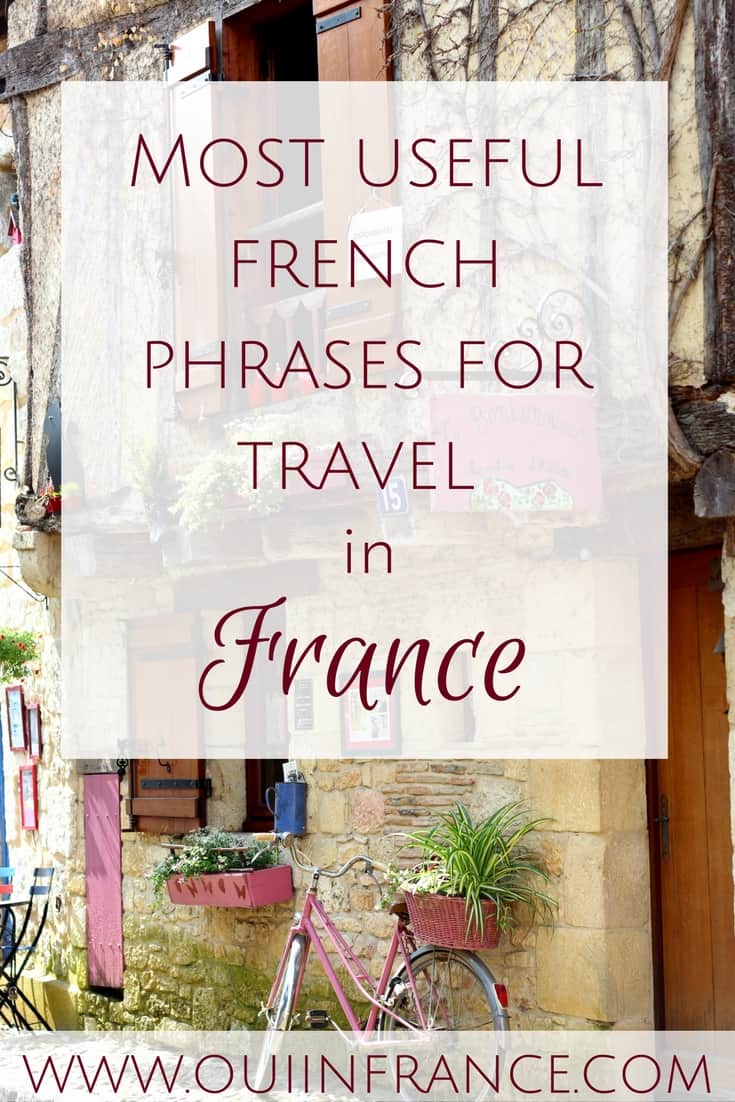
You might like

Sign up for the Oui In France Newsletter!
Stay up to date with everything Oui In France! Plus get my FREE GUIDE with 24 DOs & DON'Ts to keep in mind when visiting France!
January 4, 2016 at 5:11 pm
Great post Diane and good advice about interrupting someone. Last year in SuperU I asked an assistant (who was stacking shelves) where the batteries were. I started with ‘Excusez-moi Monsieur’ (at home I would just say ‘excuse me’ ) He very pointedly replied with ‘Bonjour Madame’, I felt very rude and now try to remember to always use Bonjour before an enquiry.
January 4, 2016 at 7:39 pm
Thank you! Yes, so true about the bonjour before saying anything else. I think sometimes people can be very goal focused — get the answer to your question and move on. But in France it seems like kids are taught that politeness is obligatory so I’m sure Americans launching right into a question can seem off-putting. Sometimes I forget the bonjour and right away I realize my error, so I kind of fake cough and say it again haha.
January 4, 2016 at 7:55 pm
Love your blog. Today was great! Your husband did a great job of taking words apart to hear.
January 5, 2016 at 6:31 am
Thank you, so glad you enjoyed it, and I’ll let Tom know! He was nervous recording everything!
January 5, 2016 at 2:49 am
Thank you I found this to be interesting
January 5, 2016 at 6:32 am
Great to hear, thanks so much!
January 6, 2016 at 4:21 pm
This was one of your best so far! Like having a mini translator guide with audio. Well done!
January 12, 2016 at 8:12 pm
Thank you, glad you found it useful!
January 11, 2016 at 12:14 pm
Starting with “bonjour” is just about the most important tip for any interaction with a stranger in French. A really useful post Diane, thanks for linking to #AllAboutFrance
January 12, 2016 at 8:13 pm
Yup, I always tell people even if you don’t know any other words or are too embarrassed to try, ALWAYS start any interaction with bonjour. Makes a good first impression! Thanks for hosting the linkup!
January 11, 2016 at 12:54 pm
Very helpful. Merci Beaucoup!!
You’re very welcome!
January 12, 2016 at 7:35 pm
What a handy tool! This is so easy to use — a great brush up before a trip to France!
Thank you for checking out the post. So glad you found it useful!
January 17, 2016 at 5:29 am
This is great and so useful! Bises from #allaboutfrance
December 12, 2016 at 4:28 pm
French are known for their lack of patience and quick exasperation, but if you know the right words to approach them you’re off with a positive and happy response. As you have mentioned above, Politeness is the #1 rule. Great post, should come in handy for many foreign travelers in France!
December 12, 2016 at 4:32 pm
Thanks so much, Frederic! I hope you’ll consider sharing this post on your FB page. I’m sure your community would find it helpful. 😉
May 7, 2018 at 11:05 am
Hey guys I was on Reunion Island where I took french courses at DP Langues and I really recommand it my experience there was amazing ! Cheers
June 20, 2018 at 2:32 am
Merci beaucoup! So helpful!
January 21, 2022 at 2:50 am
Stumbled across this post on Pinterest—a great summary! I’m requiring my kids to learn a little French before their first trip to Paris this summer, and I’ll use this to help. Thanks!
January 21, 2022 at 6:43 am
You’re very welcome! So glad it was helpful!
June 26, 2023 at 7:27 pm
Excellent basic French questions and phrases. I like it when the French guy says the French at a slow pace.
Leave a Reply Cancel reply
Your email address will not be published. Required fields are marked *
Notify me of new posts by email.

As an Amazon Associate I earn from qualifying purchases.

20 Basic French Travel Phrases for Beginners

When traveling to a French-speaking country, having a basic understanding of the local language can greatly enhance your experience.
Learning a few essential French travel phrases not only enables you to communicate with locals but also shows respect for their culture and makes your interactions more enjoyable.
Today, we will introduce you to 20 basic French travel phrases that are perfect for beginners. Each section will focus on a specific category of phrases, providing translations, guidance, and example usage.
We will leave you with some tips for learning French at home. Follow this guide, and you'll be speaking French in no time.

20 French Travel Phrases
Let's dive into our comprehensive list of 20+ essential French phrases so you have the tools necessary to make yourself understood in France.
We will kick things off with greetings and polite expressions so you can conduct yourself well on your trip to France.
Greetings and Polite Expressions
When interacting with locals in a French-speaking country, it's important to start with a friendly greeting.
- Bonjour - Hello
The phrase bonjour is the most common and widely used greeting in French. It sets a positive tone for your conversation. You can use this greeting all day.
- Bonsoir - Good evening Bonne soirée - Have a good evening Bonsoir is used in the evenings, from around 6 pm onward as a greeting. Meanwhile, bonne soirée is used to express the desire that someone else will have a nice evening.
- Bonne nuit - Good night Just as in English, you would use bonne nuit as "good night" before going to bed.
- Au revoir - Goodbye When leaving someone at any time of day, au revoir is a polite and pleasant way to say "goodbye."
- Comment t'appelles-tu? - What's your name? (informal) Comment vous appelez vous? - What's your name? (formal) Quel est ton nom? - What is your name? (informal) Quel est votre nom - What is your name? (formal)
Once you have greeted someone, you can ask "What is your name?" either formally or informally, as the situation dictates.
- Je m'appelle... - My name is…
- Je viens de ... - I come from... La France - France L'Allemagne - Germany L'Espagne - Spain Le Royaume-Uni - The UK Les États-Unis - The US
- (Comment) ça va? - Are you alright? (most informal) Comment vas-tu? - How are you? (informal) Comment allez vous? - How are you? (formal) To show interest in someone's well-being, ask "How are you?" It's a common way to initiate a friendly conversation and display your courtesy. You can reply to ça va? with ça va or ça va bien , both of which mean "I'm alright". Or, use je vais bien , which also means "I'm alright".
- Merci - Thank you Learning to say "thank you" in the local language wherever you go will endear the natives to you. On your trip to France, you will find yourself saying merci all the time.
For instance, with the phrase ça va bien, merci. Et toi?, meaning "I'm good, thanks. And you?"
- De rien - You're welcome If someone thanks you in a French-speaking country, the standard reply is de rien .
- S'il vous plaît - Please (formal) S'il te plaît - Please (informal) When asking for something in a hotel, restaurant, among friends, or in any other situation, it is always best to say "please". As you can see, there is a more formal and less formal way to say "please". Use the informal with friends, and the formal in other social situations. If you are ever in doubt about whether to use formal language, it is best to err on the side of caution and go for the formal structure.
- Je suis désolé - I am sorry It is always worth knowing how to say sorry if you need to apologize for anything in French, for instance not understanding something or not knowing the answer to a question.
- Je ne comprends pas - I don't understand Je ne sais pas - I don't know
Can You Speak English/ French?
With the following phrases, you can swap out anglais ("English") and français ("French") with any other language, as needed.
- Pourriez vous parler français - Could you speak French?
- Parlez vous anglais? - Do you speak English?
- Je ne parle pas français - I don't speak French
- Je parle un peu français - I speak a little French
- Parlez lentement, s'il vous plaît - Speak slowly, please
Useful French Travel Phrases
One of the most important things to learn in French is how to ask for directions. Let's look at some common questions in French regarding directions.
- Où est la plage/ le gare - Where is the beach/ the train station You can use où est...? for any other singular object, such as la tour Eiffel ("the Eiffel Tower") and le bus ("the bus"). Just make sure to note the gender of the object so you use the right article.
- Où est le guichet? - Where's the ticket booth? Note that you can also say je cherche... , which means "I am looking for..."
- Où sont les toilettes? - Where are the toilets?
- Où sommes-nous - Where are we? As you can see, où means "where" in French. This is followed by a conjugated form of the verb "to be", être , and the object of the sentence.
- Excusez moi, je suis perdu - Excuse me, I am lost Finally, a handy phrase to know is "excuse me, I am lost". It's a good idea to keep a copy of your hotel information on your person so you can show people if you need help directing yourself home.
Miscellaneous Common French Phrases
Now that you have learned 20 French phrases for travel, we will list some other miscellaneous French phrases for everyday life in a French-speaking country.
- Je t'aime - I love you You will come across je t'aime in music, movies, and even on t-shirts, so it is worth knowing what it means. And you never know - you might want to use this French phrase yourself when you get to Paris, the city of love.
- Es-tu célibataire? - Are you single?
- Je ne sais quoi - I don't know what Paris is known as a romantic destination as it has a certain je ne sais quoi in the air that makes it so unique and magical.
- Je voudrais (un café) - I would like (a coffee)
- Un verre de vin - A glass of wine When in France, you will want to get your hands on a coffee or a wine as soon as you find the right spot to sit and people-watch.
- Je voudrais acheter... - I would like to buy…
- Combien ça coûte - How much does it cost?
- C'est trop cher - It's too expensive
Asking a question in French
Finally, a note on forming a French question. In general, to ask a simple question in French, you can use est-ce que. Take a look at the following basic French phrases.
- Est-ce que vous parlez français? - Do you speak French?
- Est-ce qu’il parle français? - Does he speak French?
- Est-ce qu’elle parle français? - Does she speak French?
How to Learn French at Home
So, now that you have this useful vocabulary list to get you started, you will want to know how to start learning French at home. One great method is to watch French TV shows and movies.
This provides natural exposure to French slang and colloquialisms , idiomatic phrases, the French accent, and French culture. You can find great French shows on Netflix and Lingopie. Both streaming services offer French and English subtitles, and Lingopie has bonus language-learning features like digital flashcards and an interactive transcript.
You can also listen to French podcasts and French songs like La Vie en Rose and Je ne Regrette Rien. Any engaging resource that familiarizes you with French pronunciation and introduces you to new French words in a natural way is a great language tool.
Of course, you can also sign up for online French classes or find a private tutor. Many language learners also enjoy using language-learning apps to supplement their learning. You can also buy a French phrasebook if you want to have all of your useful French phrases in one place.,
FAQs About French Phrases for Travelers
Now, let's take a quick look at some frequently asked questions about basic French phrases for travel.
Is there another way to ask "où sont les toilettes?"
Yes, there is another way to ask où sont les toilettes? which means "Where are the toilets?" You can also say où est la salle de bain? , which means "Where is the bathroom?"
Both are appropriate in public and formal situations.
Is it rude to say "je ne comprends pas" in French?
No, it is not rude to say "I don't understand" in French. You can make the statement more polite by saying je suis désolé(e), je ne comprends pas , meaning "I'm sorry, I don't understand".
You might want to add répétez s'il vous plaît , meaning "can you repeat, please", or je ne parle pas français , "I don't speak French."
How do you say "s'il vous plaît" informally?
The phrase s'il vous plaît ("please") literally translates as "if it pleases you", but it is used like "please" in English. You can say "please" informally in French by switching out the vous ("you" - formal) for te ("you" - informal). So, it sounds like s'il te plaît.

Summing Up: Basic French Travel Phrases
Now that you have started to learn these 20+ basic French words and phrases, you are ready to dive into the French language and start practicing today.
Whether you're asking for directions, ordering food, or engaging in basic social interactions, these phrases will serve as a valuable tool during your journey.
French learners can head over to Lingopie's streaming site for access to a host of awesome French TV shows and movies with interactive learning features.
Your language-learning journey starts today with the help of Lingopie and this comprehensive vocab guide. Have fun learning French at home.

Milena Andrade

Learn German with How to Sell Drugs Online (Fast)

Best Podcasts To Learn Portuguese
You might also like.
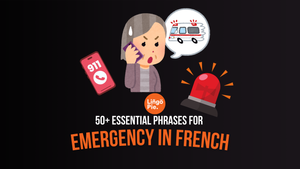
50+ Essential Phrases For Emergency In French

Emily In Paris French Words

French Vocabulary For Paris Olympics 2024
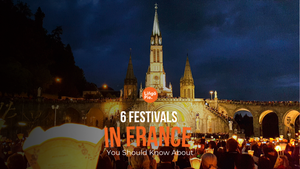
6 Festivals In France You Should Know About
Get the secret guide to language learning with tv and music for free, browse posts by popular tags.
Real French for Travelers
On your own schedule. at your own pace..
Real French for Travelers Complete Online Course gives you that freedom. Learn from someone who’s been in your shoes, not from a corporation. It’s easier than you think, especially with short, clear videos that’ll show you exactly how to say things and what it all means.
Choose among three options: the complete course, just the Foundations (Part 1) , or Situational French for Travelers (Part 2) to go deeper.
Why learn French?
(it’s easier than you think.).
You won’t have to ask, “Do you speak English?” anymore, and won’t that feel good? (You’ll love it. And feel proud of yourself.)
You’ll do things differently than your fellow tourists because you’re making the effort to learn like an insider. You don’t need to be fluent to do this. You can learn a basic French framework then build as you go. Step-by-step.
What’s even better than a phrasebook?
Real French, that’s what.
Get the complete course or just the first (or second ) half.
Scroll down to access two free sessions!
It’s the closest you can come to learning French in Paris.
(Café au lait not included …)
With real French, you KNOW what you’re saying, and others do, too. You can BUILD on what you learn because it’s real French. Real grammar. Real vocabulary.
Real. Isn’t that better? Especially when it comes to communicating with other people.
Read road signs and menus, ask for directions, ask for help if you’re lost or have a problem, or even strike up a simple conversation with a French person. (By the way, they love it if you make the effort to learn their language. You’d feel the same way.)
Real French for Travelers: The complete online course. Or the basics. Or Part 2, if you’ve had some French. Whichever you choose, it’s yours to keep. Review, practice, and master (all for the price of about 4 lessons with a private tutor) in as little as 8 weeks.
Unlike other French programs, it’s designed specifically for travelers.
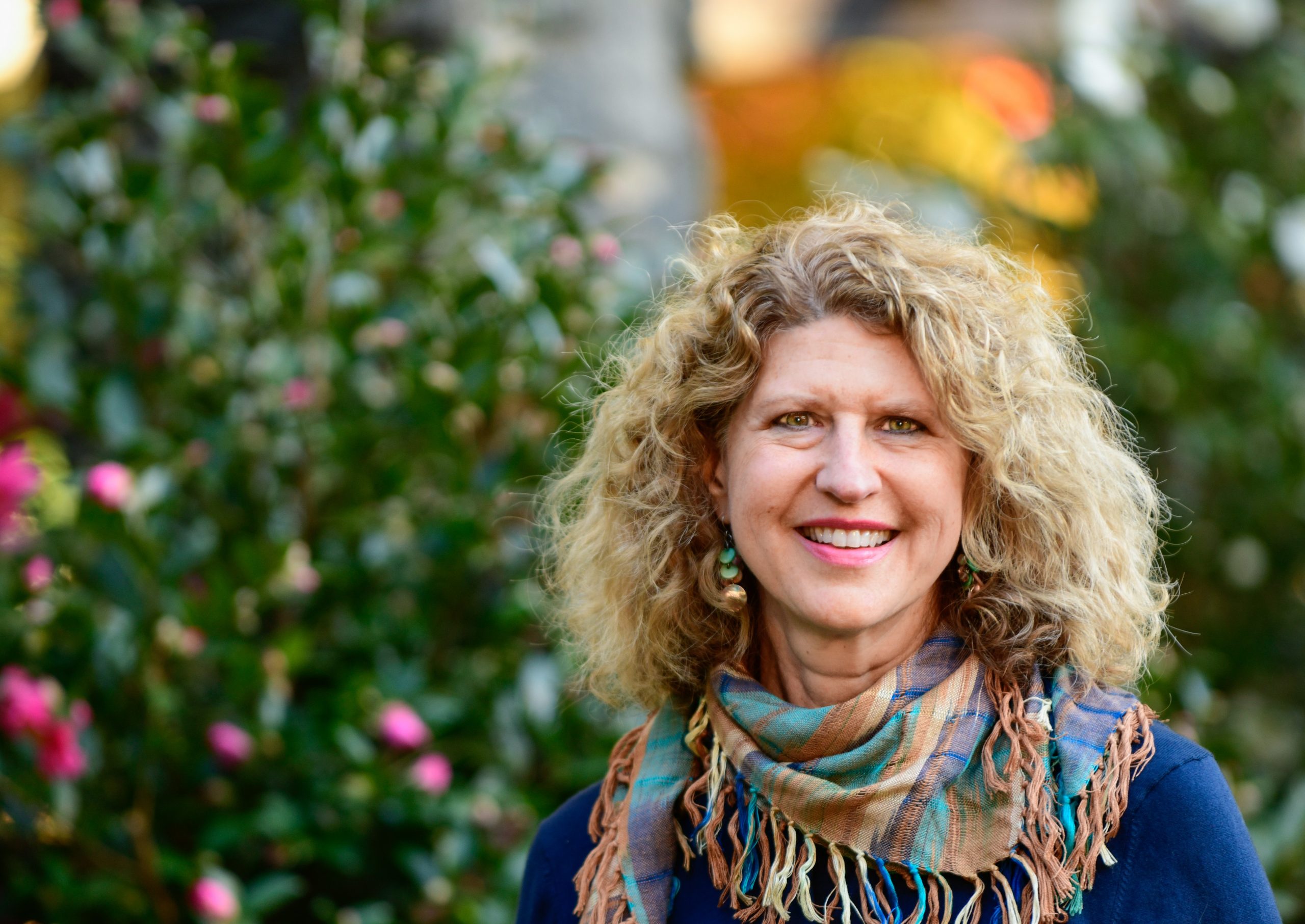
I’m Kyle and I’ll be your teacher for this course.
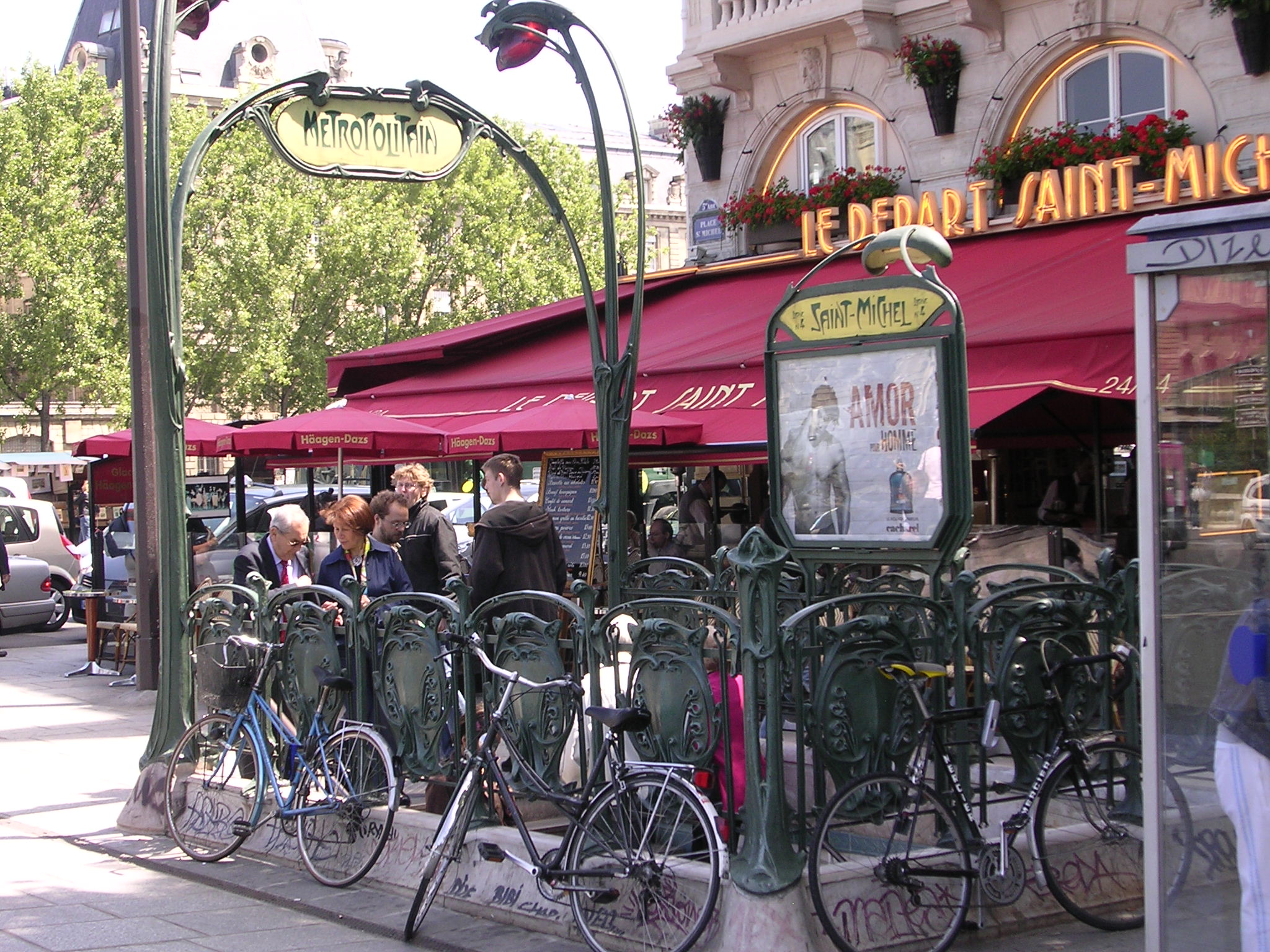
Real French in short, clear lessons. No intimidation here.
A course for travelers..
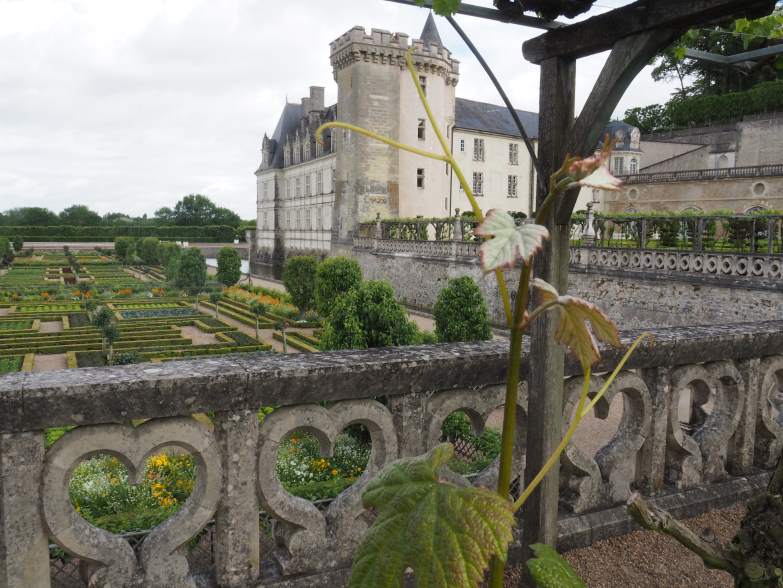
Real French for Travelers Complete Online Course
Includes: , clear, concise videos from zero to past tense. (42 in all), travel-oriented vocabulary covering a variety of situations, dialogues of realistic travel situations, downloadable reference (cheat) sheets, exercises for mastery with answer key, helpful travel tips throughout the course, quick-start phrases after each section give you a head-start in communicating, exercises to help you in listening comprehension, comprehensive pdf workbook that accompanies the videos, full 30-day money-back guarantee if you’re not happy with the course.
What students say
“ Real French for Travelers” online training is excellent! This training provided the right topics at the right pace for me to learn French.” -Cris L.
“i’ve tried a few other resources, but this one was the most comprehensive and easy to follow for a beginner. it’s well laid out, the workbook and exercises are helpful, the pronunciation is clear and easy to repeat, love the vocabulary cheat sheets and travel tips.” -shanna b., “ i highly recommend this teaching platform for beginner as well as advanced students. it can also be an excellent refresher for those who have not studied french for some time. this course will make your visit to paris much more enjoyable without the angst of not having years of french study. bon voyage” -julia w ..
For questions about the course, write to: [email protected]
www.Oliversfrance.com

Enjoy fast, free delivery, exclusive deals, and award-winning movies & TV shows with Prime Try Prime and start saving today with fast, free delivery
Amazon Prime includes:
Fast, FREE Delivery is available to Prime members. To join, select "Try Amazon Prime and start saving today with Fast, FREE Delivery" below the Add to Cart button.
- Cardmembers earn 5% Back at Amazon.com with a Prime Credit Card.
- Unlimited Free Two-Day Delivery
- Streaming of thousands of movies and TV shows with limited ads on Prime Video.
- A Kindle book to borrow for free each month - with no due dates
- Listen to over 2 million songs and hundreds of playlists
- Unlimited photo storage with anywhere access
Important: Your credit card will NOT be charged when you start your free trial or if you cancel during the trial period. If you're happy with Amazon Prime, do nothing. At the end of the free trial, your membership will automatically upgrade to a monthly membership.

Download the free Kindle app and start reading Kindle books instantly on your smartphone, tablet, or computer - no Kindle device required .
Read instantly on your browser with Kindle for Web.
Using your mobile phone camera - scan the code below and download the Kindle app.

Image Unavailable

- To view this video download Flash Player

French Phrase Book For Travel: Master Everyday Conversations with Ease: Essential French Phrases, Common Expressions, and Practical Vocabulary for Travelers, Beginners, Work, and Socializing Paperback – Large Print, August 22, 2024
Purchase options and add-ons.
- Everyday Conversations: Essential greetings, polite expressions, and common questions that make interacting with locals a breeze.
- Essential Travel Phrases: Key phrases and vocabulary needed for various travel scenarios, from navigating airports to dining out, ensuring smooth communication in French-speaking regions.
- Pronunciation Guides: Detailed explanations and phonetic transcriptions to help learners accurately pronounce French words and phrases, making it easier to be understood.
- Cultural Insights: Information on French customs and etiquette to enhance the travel experience and foster respectful interactions with locals.
- Situational Dialogues: Sample conversations covering a range of scenarios, helping users understand how phrases fit into real-life interactions.
- Effortless Navigation and Readability: The intuitive design and organized table of contents allow you to easily locate and explore various topics. Its convenient pocket-sized format ensures you can carry it with you wherever your travels take you.
- Emergency Phrases: Critical phrases and vocabulary for handling emergencies, ensuring users can effectively communicate in urgent situations.
- Print length 89 pages
- Language English
- Publication date August 22, 2024
- Dimensions 5 x 0.21 x 8 inches
- ISBN-13 979-8336639445
- See all details

Product details
- ASIN : B0DF2XXQ9P
- Publisher : Independently published (August 22, 2024)
- Language : English
- Paperback : 89 pages
- ISBN-13 : 979-8336639445
- Item Weight : 5.4 ounces
- Dimensions : 5 x 0.21 x 8 inches
Customer reviews
- 5 star 4 star 3 star 2 star 1 star 5 star 0% 0% 0% 0% 0% 0%
- 5 star 4 star 3 star 2 star 1 star 4 star 0% 0% 0% 0% 0% 0%
- 5 star 4 star 3 star 2 star 1 star 3 star 0% 0% 0% 0% 0% 0%
- 5 star 4 star 3 star 2 star 1 star 2 star 0% 0% 0% 0% 0% 0%
- 5 star 4 star 3 star 2 star 1 star 1 star 0% 0% 0% 0% 0% 0%
Customer Reviews, including Product Star Ratings help customers to learn more about the product and decide whether it is the right product for them.
To calculate the overall star rating and percentage breakdown by star, we don’t use a simple average. Instead, our system considers things like how recent a review is and if the reviewer bought the item on Amazon. It also analyzed reviews to verify trustworthiness.
No customer reviews
- Amazon Newsletter
- About Amazon
- Accessibility
- Sustainability
- Press Center
- Investor Relations
- Amazon Devices
- Amazon Science
- Sell on Amazon
- Sell apps on Amazon
- Supply to Amazon
- Protect & Build Your Brand
- Become an Affiliate
- Become a Delivery Driver
- Start a Package Delivery Business
- Advertise Your Products
- Self-Publish with Us
- Become an Amazon Hub Partner
- › See More Ways to Make Money
- Amazon Visa
- Amazon Store Card
- Amazon Secured Card
- Amazon Business Card
- Shop with Points
- Credit Card Marketplace
- Reload Your Balance
- Amazon Currency Converter
- Your Account
- Your Orders
- Shipping Rates & Policies
- Amazon Prime
- Returns & Replacements
- Manage Your Content and Devices
- Recalls and Product Safety Alerts
- Registry & Gift List
- Conditions of Use
- Privacy Notice
- Consumer Health Data Privacy Disclosure
- Your Ads Privacy Choices
- Search Please fill out this field.
- Manage Your Subscription
- Give a Gift Subscription
- Newsletters
- Sweepstakes
- Destinations
I Drove Through France Looking for the Best Local Cuisine — Here's What I Found
On a road trip deep into the culinary heart of France, I visited the village restaurants and country hotels updating the age-old French traditions of cooking local.
Rosecrans Baldwin is a Los Angeles Times best-selling author and essayist. His writing has appeared in The New York Times , The Nation , Slate , Salon , GQ , and The Morning News, among other publications.
Alex Crétey Systermans
I always know I’ve arrived in France when I take the first bite of a particular food — usually something simple, like a lemon tart or an almond croissant. Mostly I crave a good jambon beurre . One afternoon last June, my sense of that quintessentially French simplicity was redefined. I was visiting Domaine des Etangs, a resort in a château outside Massignac, a village in the southwest. I’d gone to meet the property’s farmer at his potager, or vegetable garden. When I arrived, a young man in chef whites was leaving with a basket on his arm; less than an hour later, five little plates appeared on a wooden picnic table in the middle of the farmer’s plot. No tablecloth, no formality, just a gourmet meal made from produce that, 45 minutes before, had been growing in the sun.
I was on day four of a 10-day road trip through France, during which I ate everything in sight, and this was probably the best meal I had. Call it “locavore traveling” to the extreme — this in a nation where the idea of eating locally is a bedrock of the culinary culture. I selected places — destination restaurants and hotels with restaurants — that emphasize terroir, as the French call it. To me, this means experiencing a place as deeply as possible through food and wine, as well as interactions with the people responsible for putting them on the table.
The idea for the trip was born out of one of my favorite France memories, from back when my wife and I lived in Paris for two years in the early aughts. One summer, a French colleague invited us for a weekend at his family’s house in Provence. On the first morning, his father took us shopping at a local market. The town center was full of tents and vendors, plus a hundred or so shoppers, as if the entire community had turned out. (The father said this was pretty much the case.) Later, the family prepared a meal that practically flowed from their neighbors’ farms and vineyards — good tomatoes, local rosé, a chicken roasted with garlic. This was locavorism not just as a concept, but as a way of life.
No tablecloth, no formality, just a gourmet meal made from produce that, 45 minutes before, had been growing in the sun.
I wanted to replicate that experience — the food, the markets, the sense of really being in a place. But instead of Provence , the focus would be on lesser-known parts of central and western France: villages with old cafés, hotels with farms or fishing boats. France is a nation, perhaps more so than anywhere else, where culture is created around the dining table. Even there, was locavorism still undeniably part of the culture? If so, how was it evolving?
The Countryside
Knowing I’d be tired and jet-lagged after flying from Los Angeles, I planned my first stop to be a short drive from Paris Charles de Gaulle Airport. Le Barn is nestled in the Rambouillet Forest, in the Île-de-France region, and has the feel of both a family estate and a rustic farm. My room overlooked an old manor beside a glossy pond, next to a row of bicycles guests can borrow. There were horses grazing on grassy fields fringed by dense woods. From my terrace, all I could hear was birdsong: goldfinches, wagtails, Eurasian blackbirds. The airport felt light-years away.
Le Barn’s guests are mostly Parisian families looking for a countryside retreat, plus a smattering of international visitors. The next morning’s breakfast spread seemed well suited to the relaxed weekend vibe: fresh bread and fruit, eggs softly scrambled with chives and cream. Afterward, I sought out the man whose honey I’d spread on my toast. Anton Shapoval — tattooed, shaved head, big smile — raises bees on an organic farm a five-minute drive away. We sat in the shade while he gave me a 90-minute lesson in apian biology. My French is good, but it doesn’t exactly specialize in swarms and hives; I probably caught half of what he said. That didn’t make a difference when we tasted honeys made with pollen from surrounding flowers. My favorite had an herbal taste, almost like anise — and it couldn’t have come from anywhere else.
“Terroir is deeper in the countryside,” Le Barn director Caroline Tran Chau told me that night over a glass of the local red. For her, the word locavore meant relationships, and sharing those relationships with guests. For example, the cheeses they serve at Le Barn are made by an artisan who lives 15 minutes down the road; the produce comes from the property’s own 27,000-square-foot garden, and guests can take foraging workshops with the resident farmer. The idea, Tran Chau explained, was to re-create country living for burned-out city dwellers, if only for a weekend. (She lives near the resort, she said, and driving to work one morning, four wild boars crashed out of the woods and ran in front of her car.) “The countryside is where our grandmothers used to cook chickens from the yard. Literally, the backyard.”
The next day’s drive was the longest of the trip, about four hours. It went by fast — azure sky, yellow sun, and green hills flashing by my window. Maybe I was daydreaming too much: I got lost, despite the GPS in my rental car, so I followed road signs for 20 minutes and wound up in a small town called Chabanais. It was Sunday, so most things were closed, but I found an open café on a public square. A dozen locals were drinking and snacking, so I went to the bar and ordered what everybody else was having: a small beer with a bowl of potato chips, caramelized-onion flavor. Heaven.
That night I stayed at Domaine des Etangs, part of the Auberge Resorts Collection, which is set on 2,500 acres of pasture and woodland peppered with swimming ponds and herds of rust-red Limousin cattle. At first glance, all the countryside opulence was almost too much to absorb. The place has a 13th-century castle for a centerpiece, surrounded by meticulously tended gardens, and a spa housed inside an old mill. Guests can stay in the castle’s suites or book one of six cottages scattered across the grounds. My rooms, suffused with light, occupied a turret. For two nights, I felt like Rapunzel, even if I don’t quite have the hair for it.
I had dinner at Dyades, the hotel’s main restaurant, and afterward I asked Pascal Dufournaud, who was the chef at the time of my visit, what locavore means in today’s France. How much was terroir a part of his cooking? He glared at me as if I’d insulted his mother. “Locavore has always existed in France,” he said sternly. “My assignment is: locale, locale, locale.” He named his nearby beef and pork suppliers as if rattling off the names of his cousins. “But the garden is the foundation of everything. When you see the garden, you’ll understand.”
This was the vegetable garden I mentioned earlier. It’s where, the next morning, I was met at the gate by Michael Villesange, the Domaine’s jardinier, or head gardener — and immediately did start to understand. It looked extraordinary: nearly half an acre, spiral-shaped, with no inches wasted, and all developed according to the principles of organic permaculture. Villesange planted the garden himself 12 years earlier, he explained, and still tills the rows by hand. “The work is very physical. It keeps you in shape.” He laughed. “You know Victor Hugo? Hugo once said there are no bad weeds, just bad gardeners.”
Villesange was no bad gardener. And after my tour, sitting at the picnic table, I got to experience his work as it deserved to be treated: transformed into plates of simple, delicious food. Grilled baby zucchini with a basil mayonnaise. A cup of soupe au pistou, a cream sorrel soup. A small, airy cake dotted with tiny strawberries and raspberries and vanilla cream. Each bite was simple, deep, redolent of the French countryside. Maybe profundity is where you find it.
Needless to say, locavorism isn’t exclusive to high-end resorts. For lunch, I tried a tiny bistro, Auberge des Lacs, in nearby Massignac. The restaurant was full of electricians, plumbers, and the local mail-woman. (I knew from their trucks parked outside.) I ordered what they were having: a tartelette of seasonal vegetables, a glass of local white wine, and a superlative lemon tart. When people left, they shouted into the tiny kitchen — Bonne journée! or Merci. Au revoir! — and the chefs responded in kind.
Driving west from Massignac the next day, I pulled over at a rest stop for a coffee. Long-haul truck drivers were eating lunch together in the parking lot: there was a folding table, a bottle of red wine, even a portable television playing a talk show. (I texted a photo to a Parisian friend. She wrote back: “This is very French.”) Inspired, I pulled off the road an hour later and stopped near a field of grapevines. I was just north of the Charente River, next to stone walls that looked 500 years old (and probably were). I sat in the grass, drank a Perrier, and read a book. Suddenly the day felt so much richer.
Heading west toward the ocean, I passed through the heart of the Cognac region, famous for its brandy. At the last minute, I decided to visit one of the region’s newer makers, Bourgoin Cognac — partly because I had drunk one of their cognacs the night before, but also because I’d heard that the couple making them were relatively young, a rarity in a region known for its centuries-old traditions.
Frédéric and Rebecca Bourgoin started bottling their artisanal cognac in 2015, though Frédéric’s family had been distilling wine for other brandy makers for generations. “From the moment he was two, Frédéric had his foot on the tractor pedal,” Rebecca said, laughing. She showed me a two-story stone house on the property, not much bigger than a shed, where her husband’s ancestors once lived, and where the family cow slept downstairs to warm the house.
I went to the bar and ordered what everybody else was having: a small beer with a bowl of potato chips, caramelized-onion flavor. Heaven.
The Bourgoins now collaborate with more than 150 chefs of Michelin-starred restaurants. (Their cognacs recently became available in the United States.) Rebecca echoed what I’d heard at other properties: that the concept of locavore dining in France was eternal, but evolving. For decades, people have been leaving their villages for urban living. Now the city folk miss a connection to the countryside and are seeking it out — but still want experiences that feel modern. At the same time, she thought, knowing a place through food and wine, at least for French people, was “tradition, not a trend. It’s naturally the way things work.”
France is divided into 13 regions, each with its own culinary traditions — cooking with oil in the south, for example, or cream in the north. Even butters from different places taste distinct. For my next leg, I wanted to experience the country’s coastal food culture. La Rochelle, a small fortified city known for seafood, is located on the Bay of Biscay. At the weekly market, I passed booth after booth selling fresh oysters and spiny langoustines. I dined that night at Restaurant Coutanceau, one of two restaurants run by chef Christopher Coutanceau and Nicolas Brossard, and stayed at their hotel in the city’s old town, La Villa Grand Voile. (Order the oysters for breakfast — trust me.)
That night, my table at the Michelin two-starred Coutanceau overlooked the bay, where a dark sky lashed the sea with rain. Dinner was a multicourse tribute to the same waters. I ate a grilled, smoky piece of mackerel, caught that day, which was served with egg yolk and roe. One course, of roasted langoustine, surprised me: the flavors were so fresh, so intense, that I teared up, transported to an early memory of eating lobster with my grandparents in Maine.
Coutanceau, a dedicated environmentalist who grew up fishing in La Rochelle, told me everything he did was in tribute to the region. Each aspect of the restaurant came from local partners, from the architects to the farmers to the artisans who designed the plates. “In France, like everywhere, when people say locavore, it’s not always the case.” He meant the many restaurants, in Paris but also New York and Tokyo, that fly in ingredients from around the world without regard for seasonality. “To eat anything at any time, that doesn’t mean anything. We’re here to create a memory for clients that’s like a tattoo.” I told him about my own memory, my lobster reverie, and he nodded. “People sometimes finish their meal in tears. That’s my inspiration.”
Afterward, I took a long walk by the sea. The squall was done. Wet cobblestones were bathed in crooked light. I thought about what Coutanceau had said. How often when I travel do I actually feel part of a place, rather than someone just passing through?
My final destination was the Loire Valley , home to the longest river in France. I stopped at the diminutive Domaine de la Charmoise, home to a family of winemakers. Jean-Sébastien Marionnet, now in charge, walked me through the fields to show what made his wines so special: the oldest vines in the entire country, he said, which survived the “Great French Wine Blight,” when many vineyards were ruined, beginning in the 1860s, by vine-destroying insects called phylloxera. Why were these vines not harmed? “It’s a mystery. We were lucky,” he said, then smiled. “I’m persuaded they don’t want to die.”
The vineyard was a short drive — past cyclists, an outdoor concert venue, a farm stand selling chèvre — from Le Bois des Chambres, a new hotel constructed from the remains of a farmhouse, where contemporary architecture meets rustic chic. The property sits about a stone’s throw away from Chaumont-sur-Loire, one of the valley’s grand châteaux, which overlooks the river. The castle once belonged to Catherine de’ Médicis. Today it draws hundreds of thousands of visitors for a summer garden festival and art program in which artists are invited to install works on the grounds.
Le Bois is also home to Le Grand Chaume, a domed restaurant that looks like a Modernist circus tent. It’s headed by chef Guillaume Foucault, who, like Coutanceau, finds the evolution of locavore culture in France problematic if it doesn’t insist on being seasonal and sustainable and supporting a system of local producers. “What’s vital is to be part of the community. The word for it in French is holistique. ” (I explained, over a very good glass of Sauvignon Blanc, that the term worked well in English, too.)
My last meal was in nearby Blois, at Fleur de Loire, a restaurant inside a centuries-old building by the Loire. Its chef, Christophe Hay, an icon of modern French cuisine, scoffed when I brought up the idea of locavorism. “Pure and simple, it’s marketing. I’m not a locavore chef. I’m a terroir-ist chef.” I made a bad joke about him being a terrorist and he laughed, but was basically in agreement with the other chefs I had talked to. He only serves fish from the Loire River and local mushrooms that are in season. At the same time, he loves to travel. He showed me a small garden behind the restaurant full of peppers and herbs, even fruit trees, that he’d brought home from South America and Southeast Asia. The plan was to grow them himself, there in the Loire, and see how they influenced his cooking. “I’m a little bit the Christopher Columbus of cuisine.”
Dinner was a pageant of dishes and wines, bread carts and cheese carts — an almost silent orchestration of local tastes. I drove back to my hotel feeling deeply nourished, nutritionally and emotionally, as much from my conversations as from the food. In the little village below my hotel, Chaumont-sur-Loire, a party was under way: a rock band was playing beneath strings of lights and dozens of people, young and old, were dancing. Two hours later, through the window, I heard the revelers walking home, singing. I realized that I may never know France like someone born there would, but that each visit places it deeper in my heart. The next morning I returned my rental car in Tours and took a high-speed train to Paris. There was only one thing left to do: eat a good jambon beurre .
Île-de-France
About an hour outside Paris, Le Barn is a refuge in the heart of the Rambouillet Forest with abundant opportunities for cycling, hiking, and horseback-riding.
La Serre , the restaurant at Le Barn, has a menu that emphasizes seasonal produce — much of it grown on the property.
Nouvelle-Aquitaine
Domaine des etangs.
Surrounded by tranquil ponds, Domaine des Etangs is a 13th-century château transformed into a resort for the 21st century. Kids will love the vast game room in the castle’s attic.
La Villa Grand Voile
A short walk from La Rochelle’s old port, La Villa Grand Voile , an 18th-century ship-owner’s mansion, has chic, contemporary interiors. The courtyard contains a small but inviting swimming pool.
Auberge des Lacs
Auberge des Lacs is a hidden gem in the center of tiny Massignac. Sit outside at lunchtime and order the three-course menu du jour.
Dyades , the restaurant at Domaine des Etangs, serves traditional dishes with modern presentation. Book a tour of the restaurant’s organic garden before your meal.
Restaurant Christopher Coutanceau
Restaurant Christopher Coutanceau , an ode to the sea, serves specialties such as sole and sea urchin. Even humble sardines get the star treatment.
Bourgoin Cognac
Bourgoin Cognac is a family-run operation making unique cognacs. Inquire ahead of time for a tour and a picnic in the vineyards.
Centre-Val de Loire
Le bois des chambres.
A blend of rustic and cutting-edge, Le Bois des Chambres has garden rooms with separate bedrooms in huts raised on stilts. The hotel lacks air-conditioning, but night breezes are cool.
Fleur de Loire
Fleur de Loire is a Michelin two-starred restaurant overlooking the Loire River. Chef Christophe Hay oversees an open kitchen that deploys elegant dishes that don’t feel fussy.
Le Grand Chaume
Under a rounded thatched roof is a playfully modern interior. The contemporary French cuisine at Le Grand Chaume is inspired by the Loire Valley.
Domaine de la Charmoise
Domaine de la Charmoise is a family-run winery with a small tasting room. Their vines are said to be the oldest in France.
A version of this story first appeared in the September 2024 issue of Travel + Leisure under the headline "Grass Roots."
Related Articles
UK Edition Change
- UK Politics
- News Videos
- Paris 2024 Olympics
- Rugby Union
- Sport Videos
- John Rentoul
- Mary Dejevsky
- Andrew Grice
- Sean O’Grady
- Photography
- Theatre & Dance
- Culture Videos
- Fitness & Wellbeing
- Food & Drink
- Health & Families
- Royal Family
- Electric Vehicles
- Car Insurance Deals
- Lifestyle Videos
- UK Hotel Reviews
- News & Advice
- Simon Calder
- Australia & New Zealand
- South America
- C. America & Caribbean
- Middle East
- Politics Explained
- News Analysis
- Today’s Edition
- Home & Garden
- Broadband deals
- Fashion & Beauty
- Travel & Outdoors
- Sports & Fitness
- Climate 100
- Sustainable Living
- Climate Videos
- Solar Panels
- Behind The Headlines
- On The Ground
- Decomplicated
- You Ask The Questions
- Binge Watch
- Travel Smart
- Watch on your TV
- Crosswords & Puzzles
- Most Commented
- Newsletters
- Ask Me Anything
- Virtual Events
- Wine Offers
- Betting Sites
Thank you for registering
Please refresh the page or navigate to another page on the site to be automatically logged in Please refresh your browser to be logged in
Why you should swap the crowded French Riviera for Marseille’s lesser-known shores
Nice local chloe braithwaite finds respite from the summer crowds of the cote d'azur in the sleepy towns that surround france’s oldest city, article bookmarked.
Find your bookmarks in your Independent Premium section, under my profile

Sign up to Simon Calder’s free travel email for expert advice and money-saving discounts
Get simon calder’s travel email, thanks for signing up to the simon calder’s travel email.
I n the peak of summer, Nice, like many of the major towns along the French Riviera , is rather full. Not as full as Paris or Barcelona , but enough that finding a bare patch of pebble along the city’s famous Baie des Anges is just this side of frustrating.
People hustle onto the tram by the city’s Old Town, sweaty bodies cramming into every available space, while visitors from out of town – not realising reservations are essentially obligatory – stand in queues surrounding restaurant terraces, sighing loudly in hopes of pity from the harried wait staff.
As a local, I adore the city year-round; its sunny disposition and famously colourful façades will always be charming to me, but when friends ask when they should stop by, I always say this is a town best visited in spring or autumn, when the promenade is calm(er), and the cafes and bars that line the narrow, labyrinthine streets can spare a seat for me.
However, the lesser-known shores by Marseille are perfect for summer. The trick is in finding those charmingly quiet fishing village-esque towns that are off-radar for many non- French visitors. This sweeping stretch of the Mediterranean feels forgotten, despite attracting a host of creatives and intellectuals over the years, like Virginia Woolf, Edith Wharton, Aldous Huxley and his wife Maria, Bertolt Brecht and Jacques Cousteau.
What is there to do in these tiny towns? Not much, and that’s the point. Whether you’re looking for long, languid mornings or hikes spent chasing the sun along those rough-hewn seaside paths the French call les sentiers du littoral , these tiny towns offer all the charm and wealth of the Riviera without the crowds – or the price tag.
Read more on France travel :
- I holidayed in France’s ‘most dangerous’ city and came away unscathed – and enamoured
- This chic Paris district is becoming the trendiest spot for a city break in Europe
- The carpooling app for exploring France cheaply and sustainably
Where to go
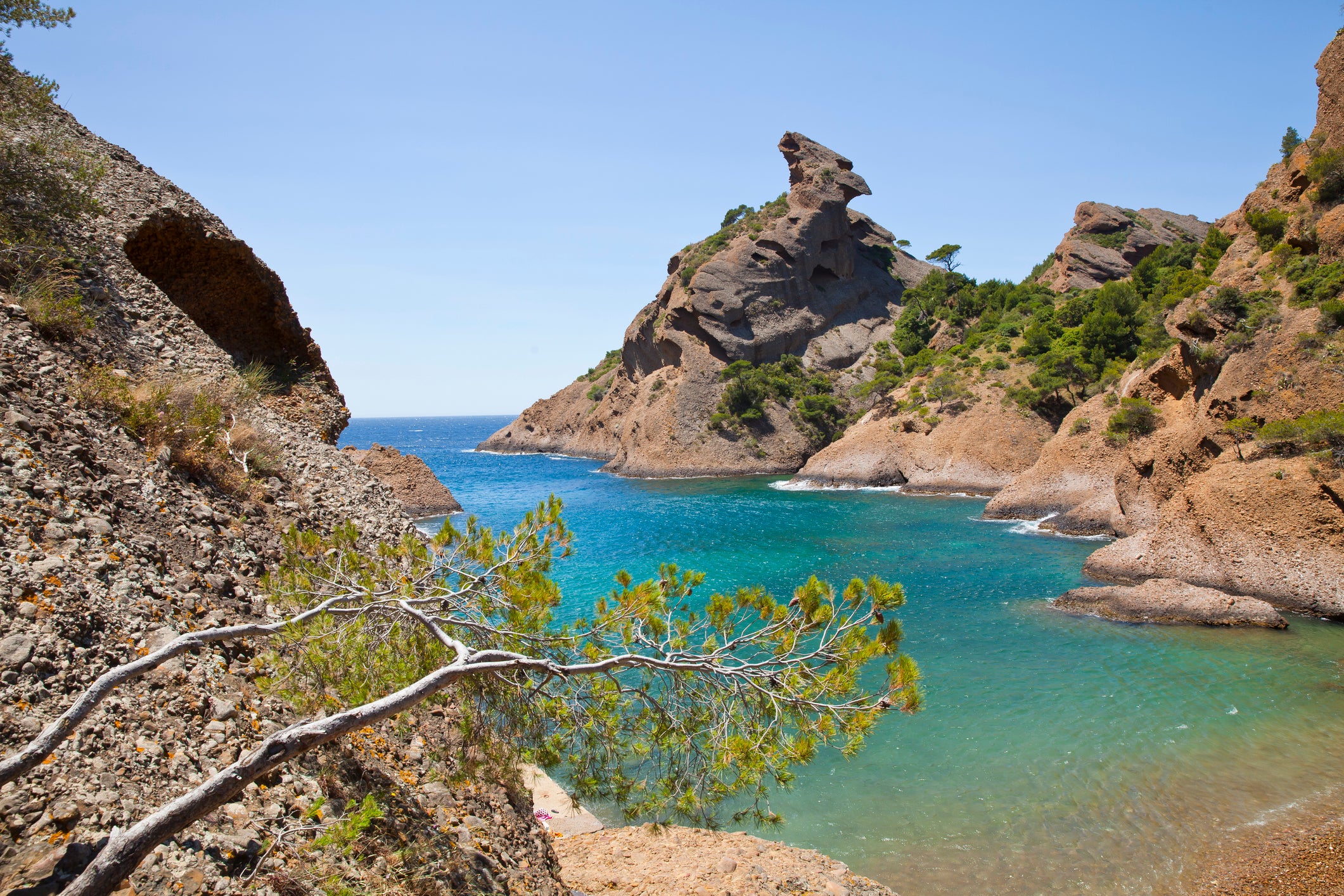
True cinephiles will know of La Ciotat, home to some of the earliest films ever produced by the Lumière brothers. Of the monuments in town dedicated to film, the Eden Theatre is the most impressive as the oldest cinema still in operation with its first screening in 1895. Fans of the brothers can even visit their former home, the Château du Clos des Plages – now a private residence and called the Palais Lumière – on certain days of the year. In town, Café de l’Horloge is a historic restaurant with a charming reading corner, while Old Town plays host to boutique shops and local artisans. Outside of film, La Ciotat is also the birthplace of pétanque , France’s unofficial national sport.
The town borders the Calanques National Park, easily distinguishable from the calanques of Cassis and Marseille by their distinctive red rock formations. Calanques Mugel and Petit Mugel are a short walk from the edge of town, with small beaches nestled between rocky cliffs. A little further west, also accessible by a sentier littoral , are the less popular Calanque de Figuerolles, overlooked by local institution hotel-restaurant Chez Tania. It’s the perfect Robinson Crusoe-style lookout to watch the sun go down.
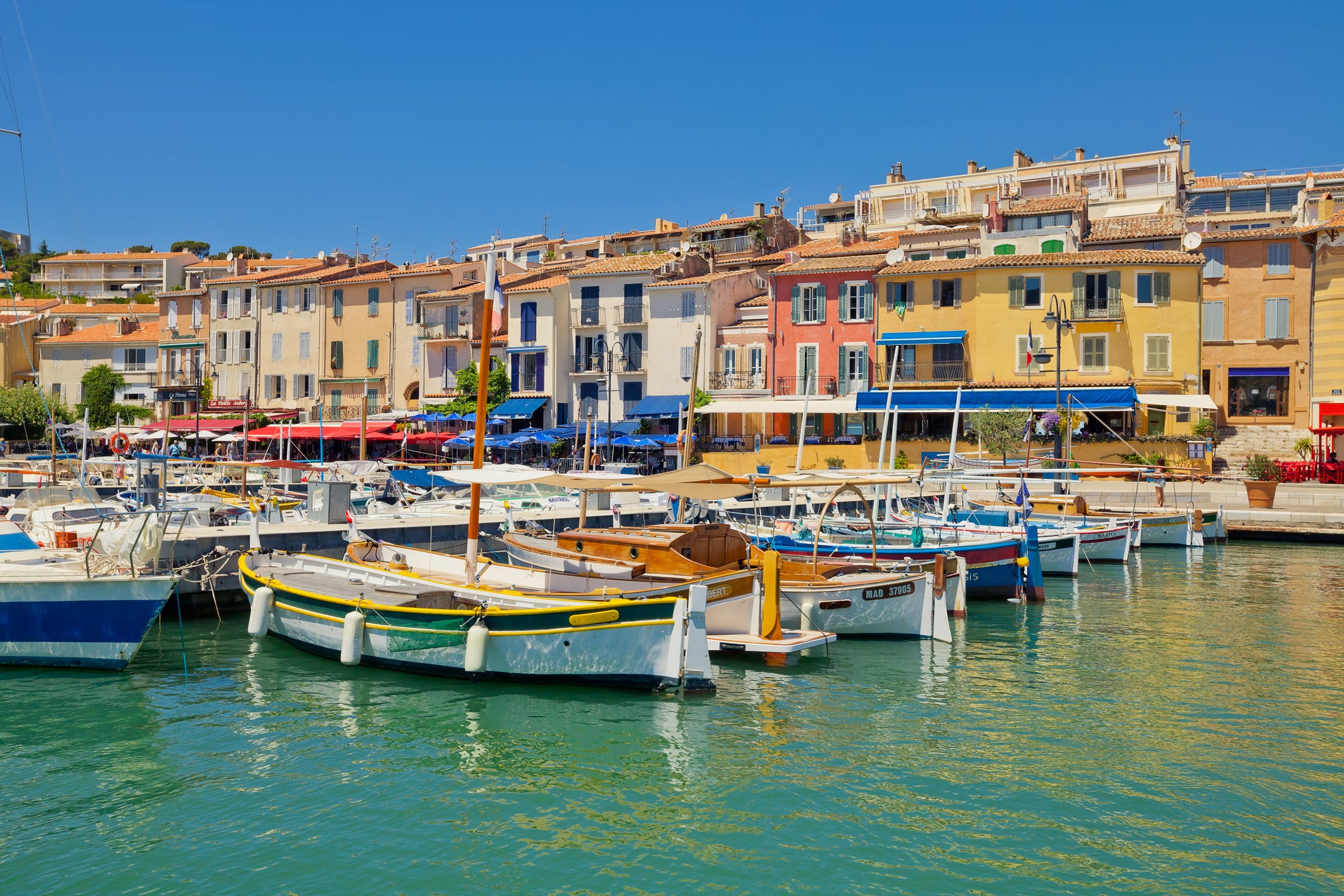
Picture-perfect Cassis is as pretty as a postcard. Not to be confused with the liqueur of the same name, Cassis is often overlooked by visitors in favour of Marseille or Aix-en-Provence. Nestled in a small valley between Cap Canaille and the Calanques, Cassis features the typical colourful façades so well-known along the Mediterranean and is a lovely alternative entryway to the Calanques National Park. The obvious attractions are the old town, port, and beaches, but recently, it’s the town’s wine that’s been having a moment.
Wine from Cassis enjoys its own AOC ( Appellations d’Origine Contrôlée – a protected product, like champagne), and is often described as delicate and elegant – floral, fruity and a little bit herby – thanks to the terroir called garrigue in southern French: that particular shrubby, limestone soil so common in this part of the country.
Sanary-sur-Mer
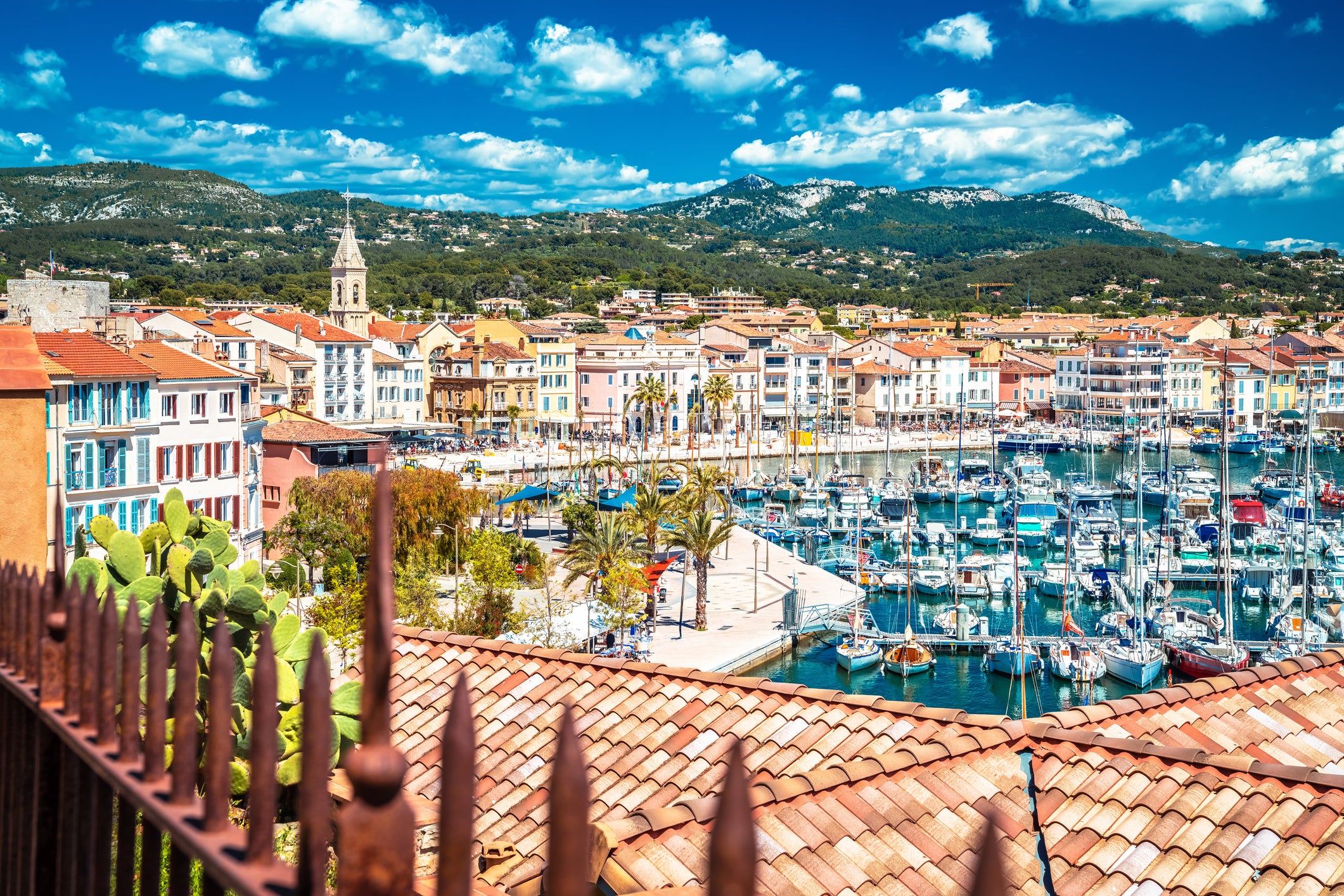
During the Second World War, when the Nazis were stripping anti-Reich intellectuals of their citizenship, the tiny Sanary-sur-Mer played host to a number of influential exiles. Bertolt Brecht, Thomas Mann and Sybille Bedford counted themselves among the locals – as did Aldous Huxley, whose home, Villa Huley, where he penned his wildly successful Brave New World in 1931, overlooked the shore. Outside of the literary elite, Jacques Cousteau and his friend, Frédéric Dumas, invented and perfected the aqualung, a sort of proto-scuba apparatus.
As such, diving and water sports are popular activities in Sanary-sur-Mer, so while in town visit the Frederic Dumas Museum dedicated to diving. The city’s port is recognised as one of the most typical ports along the Mediterranean, filled with traditional Provençal boats called pointus – a few of which are over a century old. Don’t miss the market each Wednesday.
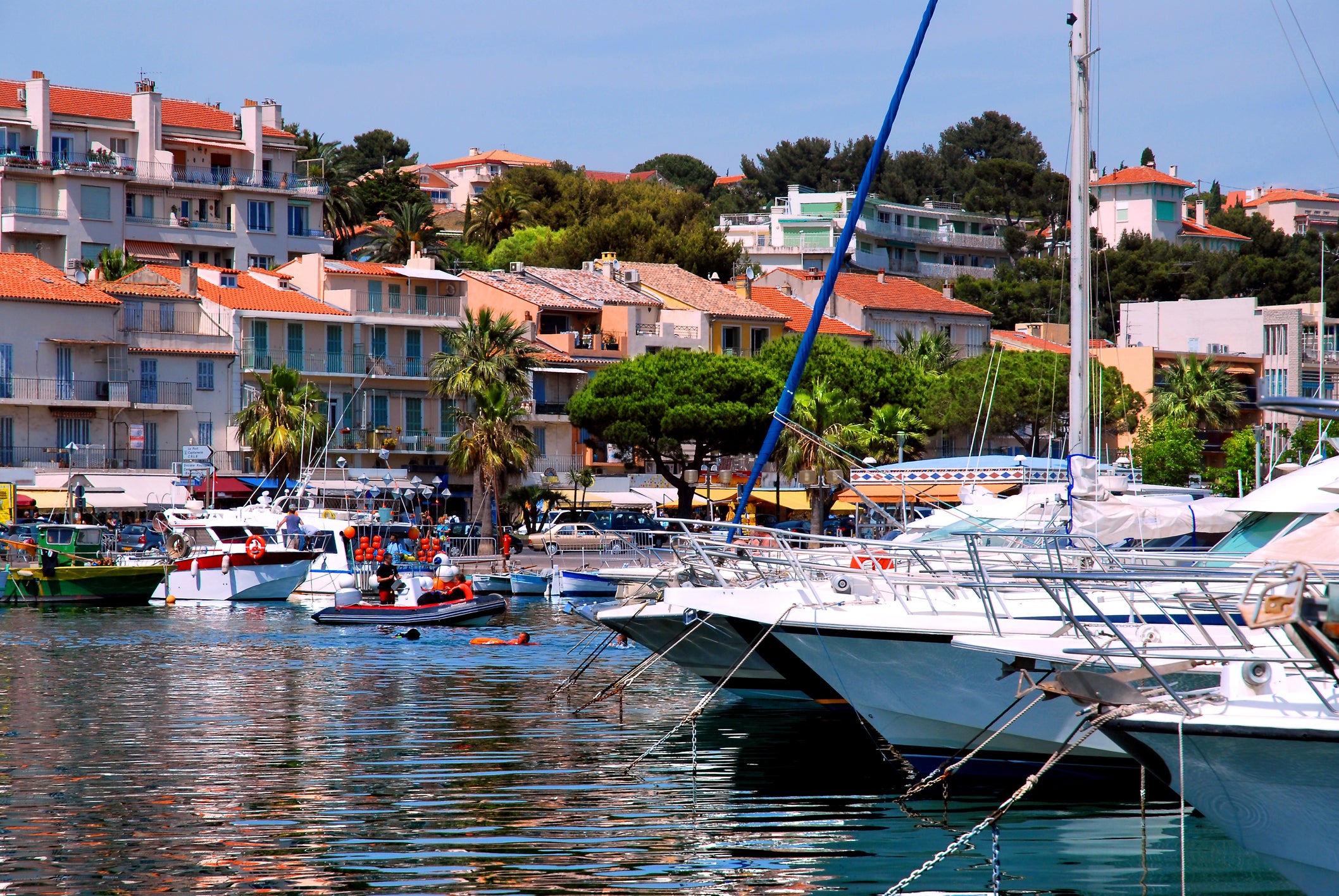
In the early 20th century, Bandol was well-known as a seaside resort, playing host to Aldous and Maria Huxley prior to their move to Sanary-sur-Mer, as well as Katherine Mansfield, DH Lawrence, and Thomas Mann. Later, in the 1950s, Marlon Brando was snapped in the port with his then-fiancee, Josanne Mariani-Bérenger, the daughter of a local fisherman. Perhaps they came for the town’s beaches, of which, there are many: Grand Vallat Beach is a favourite among locals with palms and an open horizon, as is Renécros Beach, well sheltered from the harsh winds of the Mistral.
Like Cassis, Bandol also enjoys an AOC for its wines, especially reds and rosés made with the Mourvèdre varietal, a grape said to be difficult to grow. No trip to the town is complete without visiting a few of the nearby vineyards; there are around 60 just outside town. For those without a car, the Bandol Wine Cellar showcases local producers.
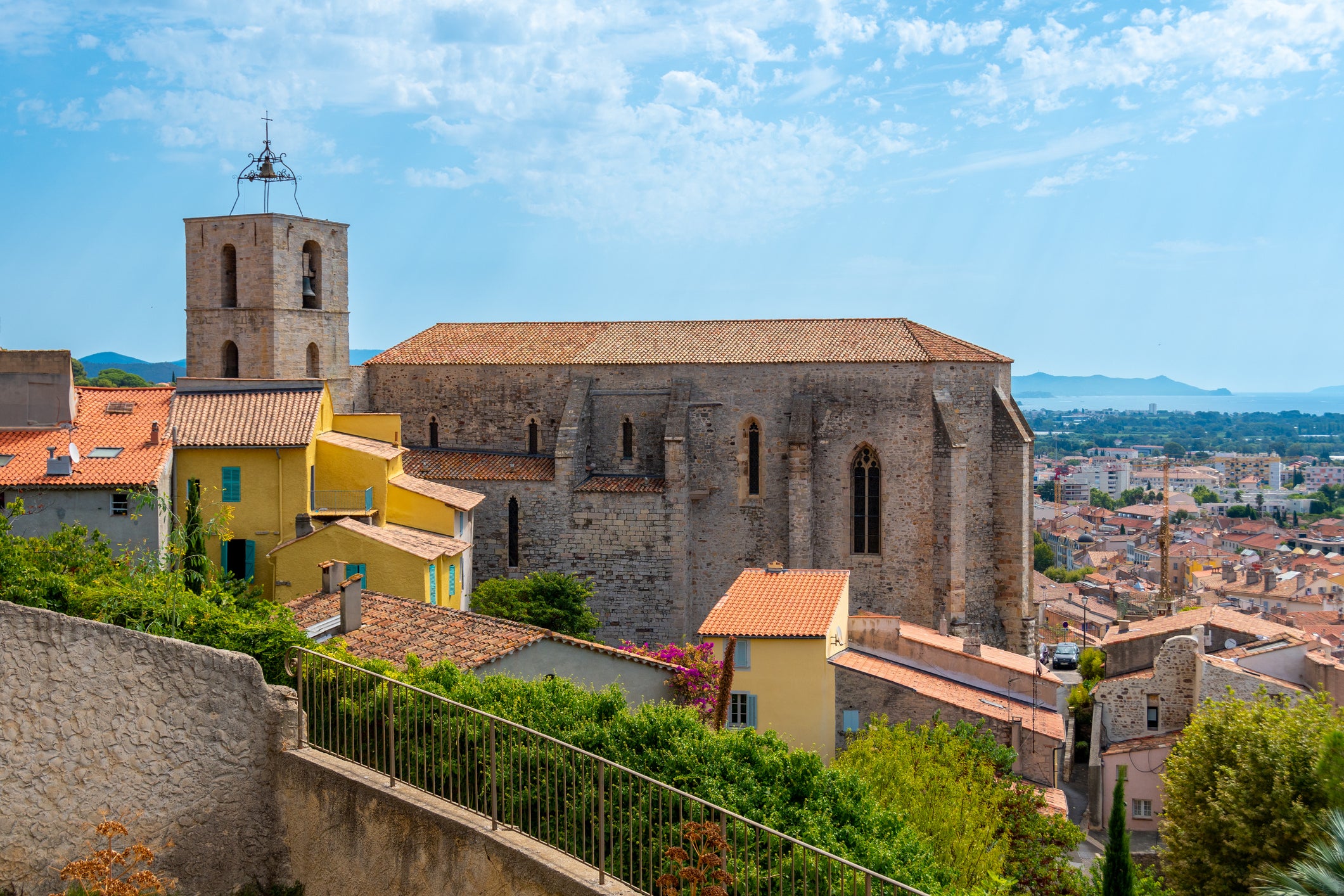
Once one of Queen Victoria’s winter getaways, the Medieval village of Hyères also attracted the likes of F Scott Fitzgerald, Picasso, Dalí and Tolstoy over the years. The old town is centred around Place Massillon, where Saint-Blaise Chapel, built by the Knights Templar in the 12th century, dominates the space, surrounded by little cafes. Noailles Villa , a contemporary art gallery and the host of the annual Festival of Fashion, Photography and Accessories, is home to a permanent exhibition of avant-garde artists from the 1920s to the 1960s (think Cocteau, Buñuel, Ray, and – yes –Dalí), while perched on the hill overlooking the city are the ruins of the Hyères Castle, built in the 11th century.
But if Hyères is famous for anything, it’s the wild landscape. Old salt marshes are home to over 300 species of birds (including flamingos), while three islands to the south, called ‘ Les Îles d’Or’ , or ‘the Golden Islands’ – comprising Porquerolles, Port Cros, and Ile Levant – are accessible via ferry and perfect for hikers and cyclists.
Read more: Why I chose Marseille over Paris for the Olympic Games
Join our commenting forum
Join thought-provoking conversations, follow other Independent readers and see their replies
Subscribe to Independent Premium to bookmark this article
Want to bookmark your favourite articles and stories to read or reference later? Start your Independent Premium subscription today.
New to The Independent?
Or if you would prefer:
Hi {{indy.fullName}}
- My Independent Premium
- Account details
- Help centre
My family went back to Scotland for the first time in 6 years. The restaurants were allergy-friendly, and we were surprised by how friendly people were.
- My family has dual US and UK citizenship and just went to Scotland after a six-year hiatus.
- We were surprised by a few different things during our trip.
- The restaurants were allergy-friendly, but there were a lot of cigarette butts on the ground.

I'm an American born to British parents. My husband is British and recently obtained US citizenship after living there for 10 years. When we had our son (who also has dual citizenship), we knew we'd spend significant time on both continents. However, the pandemic, finances, and busy schedules kept us from traveling internationally.
Recently, after six years away, we returned to Glasgow to visit friends and family. We knew the accent wouldn't be a surprise to our 7-year-old. His dad and a lot of my family have a heavy Scottish brogue. We also knew our little one would love the street art and the chocolate. But after being away for so long, a few things did surprise us.
People are friendlier
I had forgotten how lovely strangers can be. While on the bus to visit my grandmother in her new house, the driver and a fellow passenger happily helped us figure out which stop to take. A friendly ticket collector on the train paused to chat with my 7-year-old about his new Lego bricks, and locals greeted us with smiles, jokes, and tales about the last time they'd traveled to America.
When I asked my son if he thought the people in Glasgow were friendlier, he said, "They're like the people in Hawaii ," where we also recently traveled with him. I'd never thought of it that way, but he might be right. Traveling to Glasgow does feel similar to the warmth (despite the cold temperature), generosity of time, and genuine welcoming feeling you experience with traditional Hawaiian hospitality.
Chips (french fries) come with almost every meal, and the potato chip (crisp) flavors are better
My little one was pleasantly surprised that he could order chips — or french fries, to Americans — in almost every restaurant. He loves them, which isn't a shocker because most people do. They're bigger than most of the french fries we get back home, and our family much prefers them in the UK.
When it comes to crisps — or potato chips— the UK's also got America beat. Our favorite salty snacks are salt and vinegar and cheese and onion. But a few flavors were new to me, like haggis and black pepper, turkey and stuffing, and beef teriyaki, which were fun to try, and equally delicious.
Related stories
Restaurants were more allergy-friendly
We live in California , which is generally a great place to live if you have food allergies. But Scotland took it to a whole other level. In America, when asking about allergy specifics for my son, servers often make a note on their notepad to pass along to kitchen staff. In Scotland, servers asked us if we had allergies before I even had a chance to inquire.
More often than not, Scottish servers passed me an iPad (or QR code) with detailed nutritional information for each menu item so that I could see the specifics about potentially dangerous ingredients in each dish. My child felt safe eating. And as a mom to a kid with food allergies , I found this extremely comforting.
Everywhere is tap-to-pay
Tap-to-pay is everywhere — seriously, everywhere. Restaurant servers brought card machines to our table, and we also tapped to pay in shops, on trains, buses, and even in black taxis. My husband was surprised at how much this banking convenience has grown since we were last there.
We saw more cigarette butts and disposable vapes on the ground
In surveys in 2022, 15% of adults in Scotland said they smoked, compared with 9.7% of adults in California. My kid, who rarely sees cigarette butts on the ground where we live, got a kick out of spotting so many "dangerous" things.
While the cigarette butts surprised my son, my husband and I noticed way more people vaping. A 2023 survey on litter in Scotland suggested that single-use vapes were the fastest-growing litter item in the country.
Still, we loved every bit of our trip to Scotland and can't wait to visit again. Until then, we'll enjoy the bags of crisps we stashed in our luggage.
Watch: A Brit and an American tried each other's McDonald's
- Main content

COMMENTS
Here are the most useful French phrases for travel you need to know. Learning some French will offer you further insight into the French culture, mentality, and way of life. The ability to speak even un peu français (a little bit of French) and avoid making these French faux pas will enhance your travel experience and open the doors to unique ...
Merci beaucoup - "Thanks a lot". And of course, don't forget to say thank you! The French word for "thank you" is merci. Or you can make it stronger by saying merci beaucoup - "thanks very much". Use merci in all the same situations you'd say "thank you" in English.
These useful French travel phrases will give any tourist the trip of a lifetime! From asking, Où est l'hôtel ? (Where is the hotel?) and much more, this post is full of French for travelers. Bookmark or print this handy list of 108 French phrases, conveniently organized by theme, like directions, dining and beyond.
Greetings and general phrases. There is quite a lot of different French greetings but the most basic is the Bonjour. If there is only one word to remember on your trip, this is the one. French phrases. English translation. Bonjour. Good day, Hello. Salut. Hi, hello, goodbye.
Discover the key to unlocking a more immersive travel experience in France with our complete guide, featuring over 30 basic French phrases for travel. Whether it's greeting locals, navigating your way through picturesque streets, ordering culinary delights, or shopping for unique souvenirs. Perfect for first-time visitors or seasoned travelers ...
Common French Sayings and French Slang. Hello: Salut (informal) I love Paris: J'adore Paris. Have a nice trip: Bon voyage. Forget it or drop it: Laisse tomber. Come on or let's go: Allez. That's ...
100+ common French phrases for travel This section will cover the common French phrases related to different aspects. So let's get started! Greetings and basic phrases. Let's begin with the fundamental elements of discussion. Small gestures of kindness and respect include greeting individuals, asking how they are, and saying goodbye in French.
Here's all the French phrases for travel you need to know to enjoy the dazzling museums of Paris or the incredible food of Lyon. Though you technically can get by on English in tourist-heavy areas, knowing some French before you go can add deeper context to your visit and lead to more opportunities to chat with locals. Here's all the French ...
Learning a few key phrases will help you feel more confident ordering in a French pâtisserie (pastry shop) and chatting with locals at a marché (market). Here are the most important phrases you'll need in France. On y va ! French 101. You don't have to be fluent to have fun with French. You're on vacation, so don't stress!
French Travel Phrases. The most essential French travel phrases are Bonjour (hello), au revoir (goodbye), Où est? (Where is), C'est combien? (How much is it?) and l'addition s'il vous plaît (the check, please). This page covers over 60+ useful words and phrases which you can use on a trip to France.
In France, politeness is not just a gesture—it's a way of life. By understanding and using basic French phrases for travel, such as "S'il vous plaît" and "Merci," you can navigate social interactions with grace. Embrace the cultural nuances of courtesy that enrich every conversation. French Phrase. English Translation. Merci.
For your journey to a French-speaking country, you'll want to learn how to introduce yourself and ask your new friends about themselves. Here are a few phrases you'll need for small talk purposes: Bonjour. Je m'appelle ______. — Hello. My name is (lit. I call myself) _______. Enchanté. — Nice to meet you.
Days 4-6: Practice Ordering A Meal! Ratatouille, bœuf bourguignon, crêpes, quiche … the list goes on! France is a veritable wonderland of food and flavor, and you'll most likely be spending a fair amount of time in restaurants and cafés. That being said, you should plan to brush up on some useful words and phrases for ordering a meal.
In This Post. 1 Basic French Words for Travel with Pronunciation; 2 Basic French Words and Phrases Related to Getting Directions/Getting Around; 3 Basic French Phrases related to using Public Transport; 4 Basic French Phrases related to Food: Eating, Drinking, Ordering, etc.; 5 Basic French Phrases related to Booking and Staying in a Hotel
Do not forget to say bonjour as you enter a shop or start a conversation with someone! Salut: Hello (casual way of saying hello) Bonsoir: Good evening. Monsieur/ Madame/ mademoiselle: Mister/ Madam/ Miss. S'il vous plaît: Please. Merci/ Merci beaucoup: Thank you/ Thank you very much. Excusez-moi/ Pardon: Excuse me.
2- General Toolkit. Now that you've shown your good manners, let's look at a few more essential French phrases for travellers. Here are some common words and expressions to gracefully make your way through France. Oui / Non. "Yes / No". J'aime / Je n'aime pas. "I like / I don't like".
French is a widely spoken language that is popular among travelers and tourists. Whether you're planning a trip to France or any other French-speaking country, learning a few key phrases can greatly enhance your travel experience. This article presents the top 50 common French phrases that every traveler should know.
These basic words and phrases are the first level of interactions while traveling, and probably the words you will use the most in everyday conversations. So pay special attention to them! English. French. Pronunciation. Hello / good morning. Bonjour. Play.
Learn Common French Phrases. Whether you're saving up money for your next vacation, reading a travel blog, or you're about to embark on your next business trip, you should know some basic French phrases before you get there.They'll help you navigate easily, and you'll receive better customer service and avoid some embarrassing mistakes.Not to mention how much French locals will ...
GO read my basic French words and phrases for travel. Basic French words and phrases with pronunciation for your France trip . Even the most talkative and friendly traveler can be silenced when one's lexicon in the local language is nonexistent. Don't let that be you and learn my basic French words and phrases before you go!
Travel Talks: Beginning French for Travelers. Teacher and tour guide Trish Feaster has designed this French language class just for travelers — with exactly what you need to know for practical, smooth travels in France. You'll learn how to pronounce French words, master some key phrases every traveler should know, and better understand how ...
Bonjour - Hello. The phrase bonjour is the most common and widely used greeting in French. It sets a positive tone for your conversation. You can use this greeting all day. Bonsoir - Good evening. Bonne soirée - Have a good evening. Bonsoir is used in the evenings, from around 6 pm onward as a greeting.
Real French in short, clear lessons. No intimidation here. Whether you are starting from zero or reviving whatever French you may have had in high school, Real French for Travelers is an easy-to-use online course to help you reach your goals. In short, clear video lessons, you can listen to grammar explained and pronunciation you can repeat.
Essential Travel Phrases: Key phrases and vocabulary needed for various travel scenarios, from navigating airports to dining out, ensuring smooth communication in French-speaking regions. Pronunciation Guides: Detailed explanations and phonetic transcriptions to help learners accurately pronounce French words and phrases, making it easier to be ...
Many people associate France with romance and food. After moving to Provence, US cook Jane Satow has embraced both, finding love and teaching French cooking.
On a road trip deep into the culinary heart of France, I visited the village restaurants and country hotels updating the age-old French traditions of cooking local. The idea for the trip was born ...
Why you should swap the crowded French Riviera for Marseille's lesser-known shores. Nice local Chloe Braithwaite finds respite from the summer crowds of the Cote d'Azur in the sleepy towns that ...
Zillow has 27 photos of this $414,900 3 beds, 2 baths, 1,364 Square Feet condo home located at 3411 French Dr, Bridgewater, NJ 08807 built in 1993. MLS #2503266R.
OP-ED. In an article for 'Le Monde,' consultant Jean Pinard argues that criticism of the overcrowding of certain tourist sites is becoming caricatured. It masks the real issues and serves only to ...
Travel My family went back to Scotland for the first time in 6 years. The restaurants were allergy-friendly, and we were surprised by how friendly people were. ... Chips (french fries) come with ...